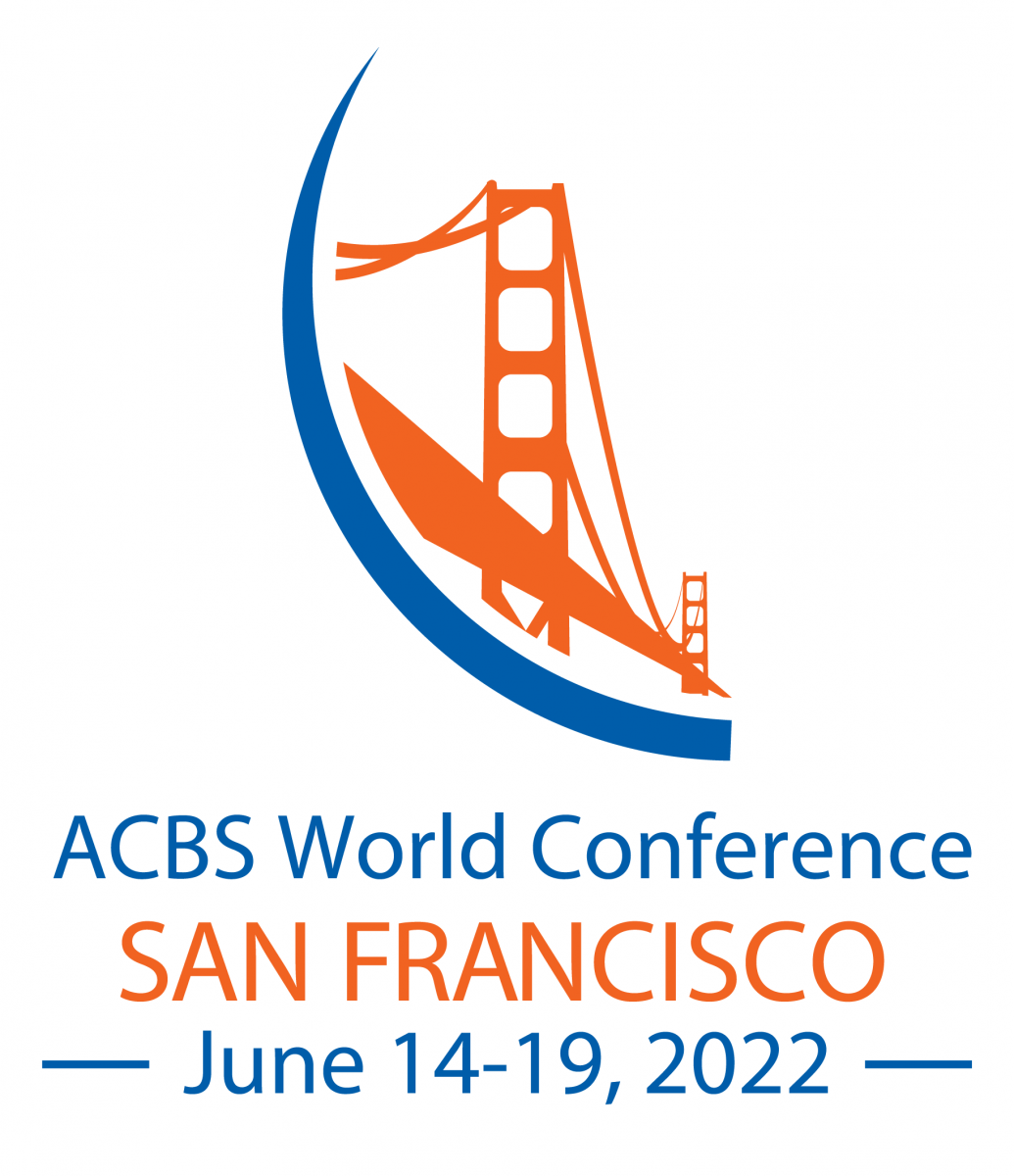ACBS World Conference 2022
ACBS World Conference 2022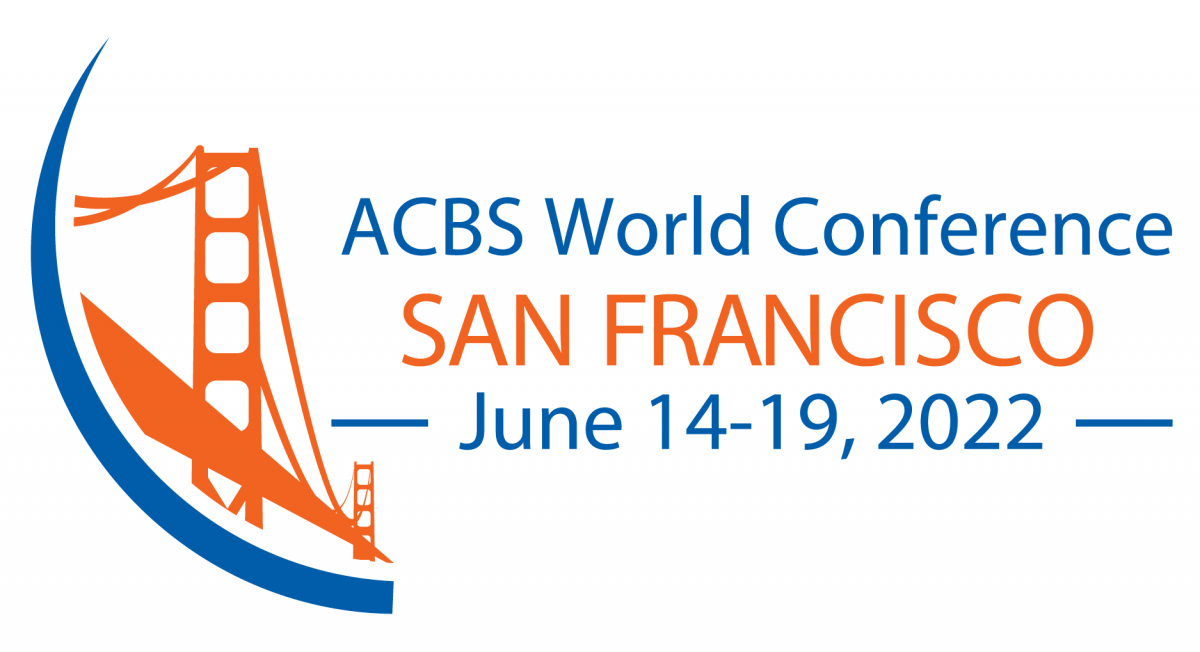
What is the World Conference?
The World Conference brings together clinicians and researchers to present cutting-edge research in, among other modalities, Acceptance and Commitment Therapy (ACT), Relational Frame Theory (RFT), and Contextual Behavioral Science, as well as experienced trainers to lead experiential workshops so that you can learn how to better serve your clients.
The World Conference welcomes psychologists, social workers, professional counselors, marriage and family therapists, psychiatrists, physicians, drug counselors, health researchers, language researchers, behavior analysts, teachers, organizational psychologists, students and more.... Anyone in a similarly related helping or research field is invited to attend.
Registration to the in-person conference includes networking opportunities during coffee/tea or lunch breaks, open access to workshops, research symposia, posters, panel discussions, plenary sessions with CBS researchers and practitioners, and our IGNITE sessions.
Pre-Conference intensive, virtual, 2 day workshops: June 4-5, 2022
Pre-Conference intensive, in-person, 2 day workshops: June 14-15, 2022
Conference sessions: June 16-19, 2022 (concluding mid-day on June 19)
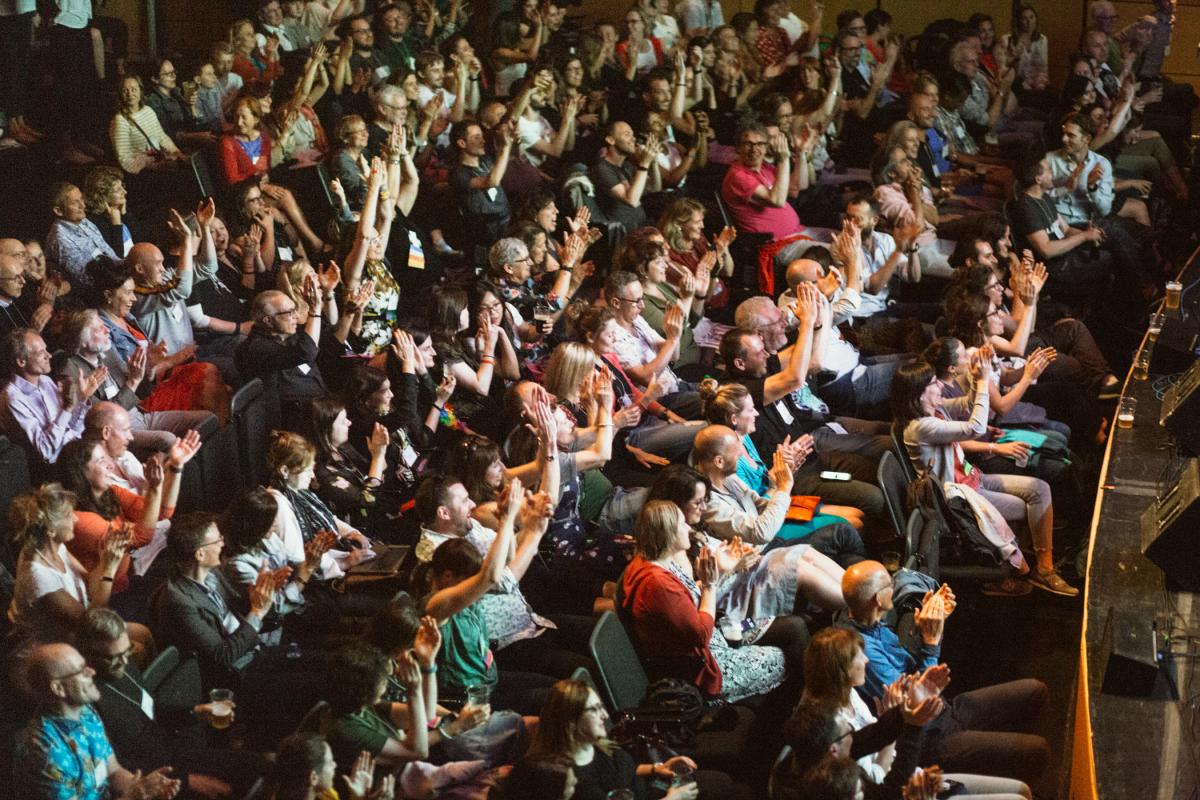
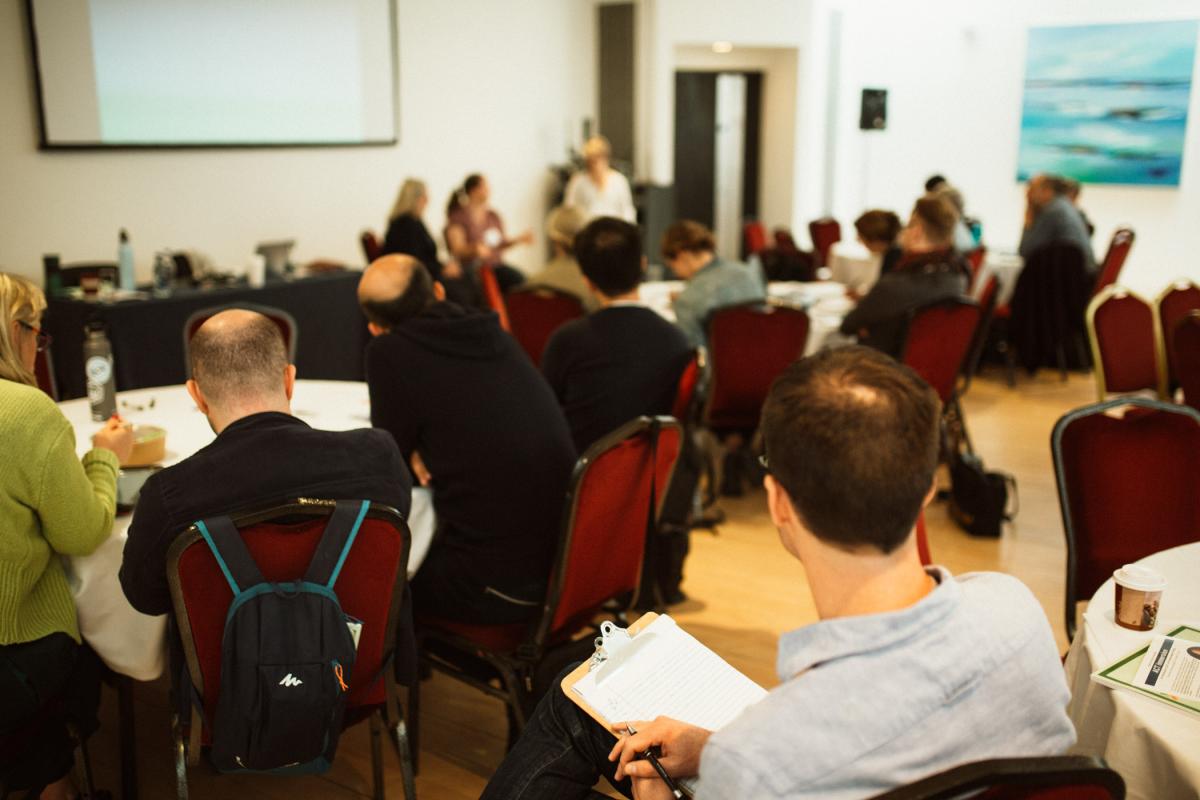
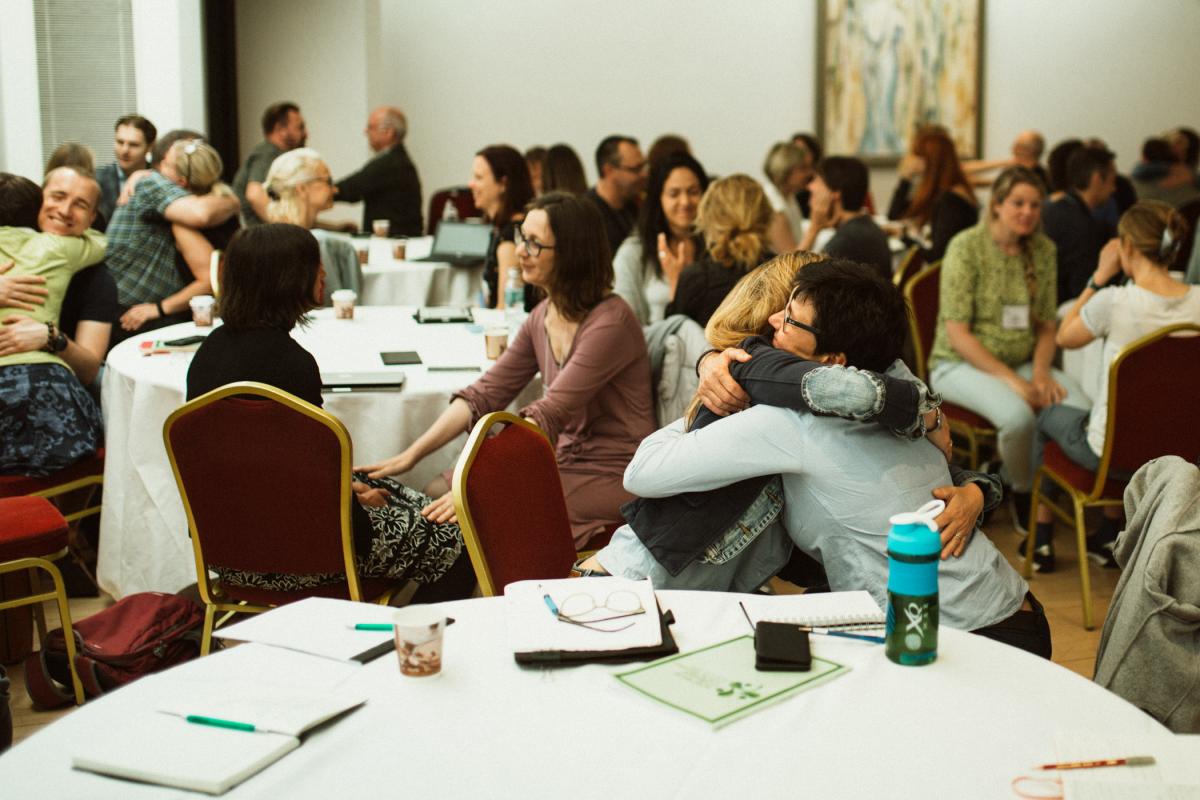
Conference Highlights
- Confirmed Speakers: Louise Barrett, Patrick Friman, Rhonda Magee, Siri Ming, Miranda Morris, Stephen Porges
- Some meals and coffee/tea are included so that you have more time to network.
- Hosted at the San Francisco Hilton Union Square.
- Workshops, Workshops, Workshops. Half-day workshops are included (no extra charge), with your conference registration. These 30+ workshops are one-of-a-kind learning opportunities.

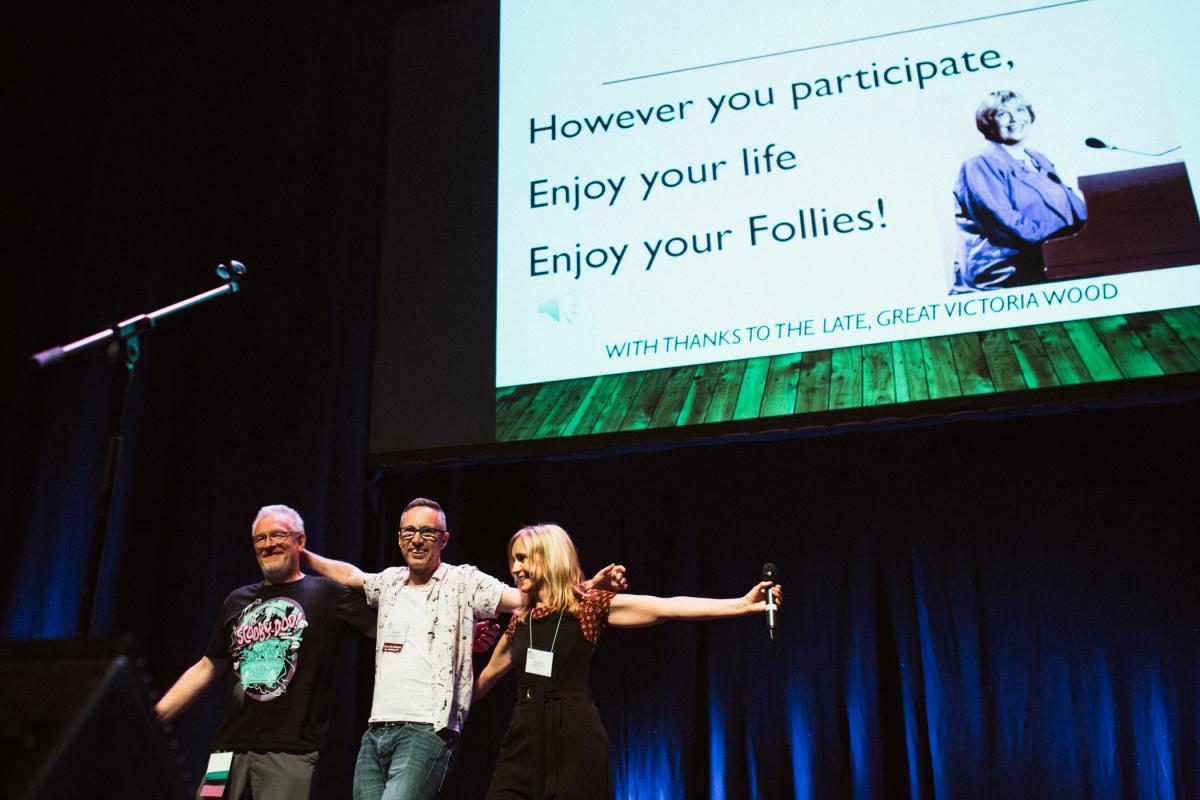
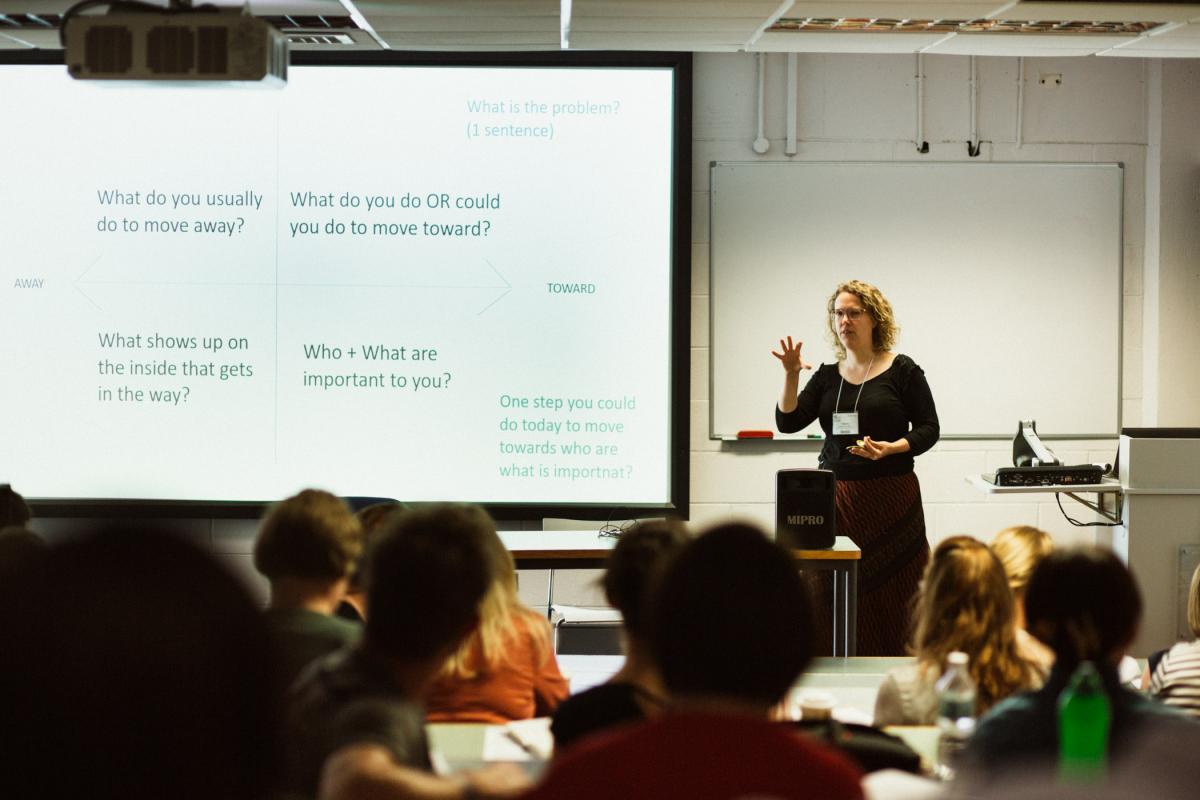
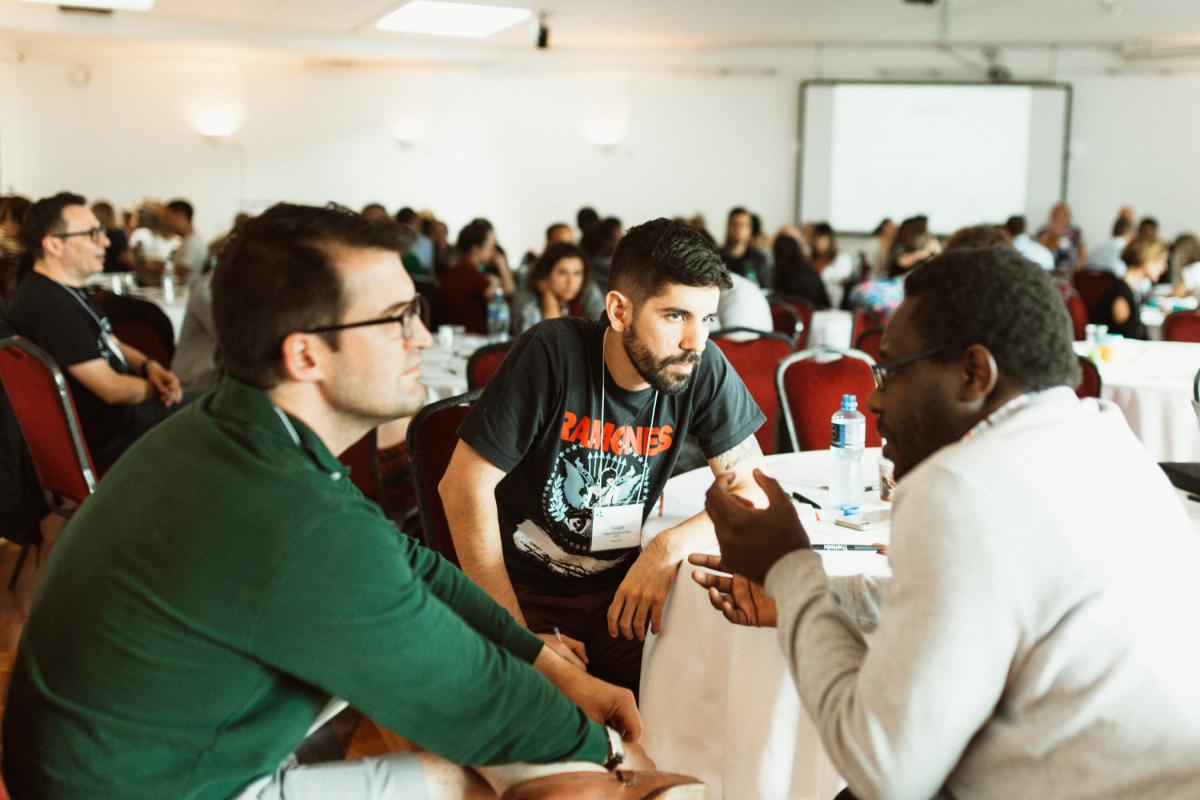
WC2022 Conference Registration
WC2022 Conference RegistrationRegistration has now concluded for 2022, thank you for joining us!
Viewing of recorded content ends September 15.
Available content:
- Our in-person conference programming will include (10-15 tracks of content, approximately 115-160 sessions)
- Ability to earn CEs for different disciplines, as available.
- Access to all content available to our virtual attendees during the conference and for three months after the conference (until September 15, 2022).
VIRTUAL Conference registration includes access to LIVE AND RECORDED presentations.
- One live, virtual stream of all the presentations happening on the main stage (Ballroom) in San Francisco (including plenaries), June 16-19, 2022. (Approximately 15 sessions; one per time slot, June 16-18).
- One additional completely virtual track will be held concurrently with the in-person event (virtual presenters and attendees). (Approximately 11 sessions, June 16-19.)
- One live session (happening on the main stage OR virtual track), will be simultaneously translated into SPANISH in the virtual platform. (Approximately 17 sessions; one per time slot, June 16-19.)
- Videos (Powerpoint & audio only) of 5 additional rooms of content being presented in San Francisco will be recorded and made available on the conference platform for on-demand viewing within approx. 96 hours of presentations. (Approximately 55 sessions.)
- Any accepted and pre-recorded sessions provided by our presenters for on-demand viewing.
- All accepted (and received) posters.
- SIG and Chapter managed Zoom networking sessions.
- Ability to interact with other virtual attendees via live chat.
- Ability to earn CEs for different disciplines, as available.
- Access to all of the live and recorded content above for three months after the conference (until September 15, 2022).
Please Note:
-
Additional fees are required for certificates that track the number of hours you attended ($12) and CE credits ($65). These fees cover all eligible sessions from June 4-19, 2022, and their recordings. You only need to pay the fee once to earn a certificate for all events you attend.
-
All rates in US Dollars.
-
We apologize that we may not be able to accommodate special meal requests (gluten free, vegan, allergies, etc.) for registrations received after May 26, 2022.
-
All access to recordings ends on September 15, 2022 regardless of the date of registration. (Example: Those registering on August 15 would only have 30 days of access.)
-
Faxed (1 (225) 302-8688) or mailed registrations must be received at P.O. Box 655, Jenison, MI, 49429, USA, by June 3, 2022.
-
Due to conference COVID safety measures, all guests ages 5 and above will need a guest ticket to attend any conference event (including evening events such as poster sessions, Follies, etc.) or enter into any conference meeting room. Guest tickets can be purchased here.
-
Registered event attendees who bring guests/family with them to any eligible events, are wholly responsible for the behavior of their guests.
-
-
All attendees to the in-person conference must be “fully vaccinated.” Go here to find more information and submit proof of vaccination via a webform prior to arriving in San Francisco.
-
NEED HELP? If you're having trouble registering, please email Abbie at [email protected]
Member Rate Qualification
- Registration rates apply as you register. Subsequent memberships do not qualify those already registered for a refund of the difference between the member and non-member rates. The same is true for students, or other similar status and discounts, unless a full cancellation and refund are issued, and prevailing rates apply.
- Affiliate members (or non-members who are not professionals or students) may register at the professional rate. If you are currently receiving mental health care we encourage you to talk to your provider about the utility of this conference for you, prior to registering.
- Student Registration/Membership is available to individuals who are enrolled in a program of study leading to a bachelor’s, master’s, or doctoral degree, are interns, or are postdoctoral candidates. Postdoctoral candidates qualify for Student Registration for up to 2 years, with proof of status from their employer. After this time, they need to register as a Professional. Note: Those registering for the conference as a student are ineligible to earn any kind of CE credits.
Cancellation of Pre-conference and/or World Conference registration must be submitted in writing via email and must be dated on or before 5:00 p.m. Pacific Daylight Time, on May 26, 2022 to [email protected] to receive a refund minus a $25 USD registration cancellation processing fee.
We regret that after May 26, refunds cannot be made, however we will allow a substitute registrant (they can receive access and a certificate in their name). If you need a refund, please contact us via email. (Note: Shared registrations are not permissible... meaning that you can't attend one day and your colleague the next, etc.) No refunds will be granted for no-shows.
It is the responsibility of the registrant to make sure that they have received information related to virtual conference access. If you are registered and do not receive an email granting you pre-conference access (as appropriate) by the morning of June 3, 2022, or World Conference access by June 14, 2022, or within 3 hours of registering (between June 16-19), please contact [email protected].
Cancellation of Pre-conference and/or World Conference registration must be submitted in writing via email and must be dated on or before 5:00 p.m. Pacific Daylight Time, on May 26, 2022 to [email protected] to receive a refund minus a $50 USD registration cancellation processing fee.
Changes from in-person registration to virtual registration prior to May 26 incur a $25 registration cancellation processing fee.
We regret that after May 26, full refunds cannot be made, however we will allow:
- A substitute registrant (they can receive access and a certificate in their name). If you need to make a substitution, please contact us via email. (Note: Shared registrations are not permissible... meaning that you can't attend one day and your colleague the next, etc.); or
- If you are ill with Covid or have been in contact with someone who is ill with Covid, you may contact us (by June 16 at the latest) and we will waive the registration cancellation processing fee, refund you the difference between in-person and virtual conference registration, and you may have access to the virtual event.
- No refunds will be granted for no-shows.
Photographs/Video:
ACBS intends to take photographs and video of this event for use in ACBS newsletters and promotional material, in print, electronic and other media, including the ACBS website and social media accounts. By participating in this event, I grant ACBS the right to use any image, photograph, voice or likeness, without limitation, in its promotional materials and publicity efforts without compensation. All media become the property of ACBS. Media may be displayed, distributed or used by ACBS for any purpose.
Attendees of the World Conference or Pre-Conference Workshops are not permitted to audio or video-record sessions without the express written permission of ACBS.
If you have any concerns regarding the media policy, please feel free to contact us.
Waiver of Liability:
As a condition of my participation in this meeting or event, I hereby waive any claim I may have against the Association for Contextual Behavioral Science (ACBS) and its officers, directors, employees, or agents, or against the presenters or speakers, for reliance on any information presented and release ACBS from and against any and all liability for damage or injury that may arise from my participation or attendance at the program. I further understand and agree that all property rights in the material presented, including common law copyright, are expressly reserved to the presenter or speaker or to ACBS. I acknowledge that participation in ACBS events and activities brings some risk and I do hereby assume responsibility for my own well-being. If another individual participates in my place per ACBS transfer policy, the new registrant agrees to this disclaimer and waiver by default of transfer.
Registration Tiers
Registration TiersRegistration Tiers are based on your country of residence.
Find your tier below (1, 2, 3)
Tier 1:
Aruba
Australia
Austria
Belgium
Bermuda
British Virgin Islands
Brunei Darussalam
Canada
Cayman Islands
Channel Islands
Curacao
Cyprus
Czech Republic
Denmark
Estonia
Faroe Islands
Finland
France
French Polynesia
Germany
Gibraltar
Greenland
Guam
Hong Kong SAR, China
Iceland
Ireland
Isle of Man
Israel
Italy
Japan
Korea, Rep.
Latvia
Liechtenstein
Lithuania
Luxembourg
Macao SAR, China
Malta
Monaco
Netherlands
New Caledonia
New Zealand
Norway
Portugal
Puerto Rico
San Marino
Scotland
Singapore
Slovak Republic
Slovenia
Spain
St. Martin
Sweden
Switzerland
Taiwan, China
Turks and Caicos Islands
United Kingdom
United States
Virgin Islands (U.S.)
Tier 2:
AlbaniaAmerican Samoa
Antigua and Barbuda
Argentina
Armenia
Azerbaijan
Bahamas
Bahrain
Barbados
Belarus
Belize
Bosnia and Herzegovina
Botswana
Brazil
Bulgaria
Chile
China
Colombia
Costa Rica
Croatia
Cuba
Dominica
Dominican Republic
Equatorial Guinea
Fiji
Gabon
Georgia
Grenada
Guatemala
Guyana
Hungary
Iraq
Jamaica
Jordan
Kazakhstan
Kosovo
Kuwait
Libya
Malaysia
Maldives
Marshall Islands
Mauritius
Mexico
Montenegro
Namibia
Nauru
North Macedonia
Palau
Panama
Paraguay
Peru
Poland
Qatar
Romania
Russian Federation
Saudi Arabia
Serbia
Seychelles
South Africa
St. Kitts and Nevis
St. Lucia
St. Vincent and the Grenadines
Suriname
Thailand
Tonga
Trinidad and Tobago
Türkiye
Turkmenistan
Tuvalu
United Arab Emirates
Uruguay
Venezuela, RB
Tier 3:
AfghanistanAlgeria
Angola
Bangladesh
Benin
Bhutan
Bolivia
Burkina Faso
Burundi
Cabo Verde
Cambodia
Cameroon
Central African Republic
Chad
Comoros
Congo, Dem. Rep.
Congo, Rep.
Cote d'Ivoire
Djibouti
Egypt, Arab Rep.
El Salvador
Eritrea
Eswatini
Ethiopia
Gambia
Ghana
Guinea-Bissau
Haiti
Honduras
India
Indonesia
Iran, Islamic Rep.
Kenya
Kiribati
Korea, Dem. People's Rep.
Kyrgyz Republic
Lao PDR
Lebanon
Lesotho
Liberia
Madagascar
Malawi
Mali
Mauritania
Micronesia, Fed. Sts.
Moldova
Mongolia
Morocco
Mozambique
Myanmar
Nepal
Nicaragua
Niger
Nigeria
Pakistan
Philippines
Rwanda
Samoa
Sao Tome and Principe
Senegal
Sierra Leone
Solomon Islands
Somalia
South Sudan
Sri Lanka
Sudan
Syrian Arab Republic
Tajikistan
Tanzania
Timor-Leste
Togo
Tunisia
Uganda
Ukraine
Uzbekistan
Vanuatu
Vietnam
West Bank and Gaza
Yemen, Rep.
Zambia
Zimbabwe
Tier 1 determined using IMF classifications, Tiers 2 & 3 delineated using World Bank Country and Lending Groups data.
Pre-Conference Workshops for WC2022
Pre-Conference Workshops for WC2022What to Expect
The 2022 Pre-Conference Workshops offer exciting new opportunities that will engage therapists and researchers of any skill level. Combining therapy role-plays, experiential exercises, case presentations, data graphics, focused lectures, and small group discussions, you can expect high-quality training from ACBS Pre-Conference Workshops. Continuing Education credits are available.
When & Where?
There will be virtual (June 4-5, morning or afternoon) and in-person (June 14-15) workshops available.
ACBS Pre-Conference Workshops - VIRTUAL Event (June 4-5, 2022)

Lisa Coyne, Ph.D., Carlos Rivera, Ph.D.
(Clinical; Beginner, Intermediate, Advanced)
(Clínico; Nivel principiante, Nivel intermedio, Nivel avanzado)
*Taller impartido en inglés. Habrá traducción simultánea al español disponible.*
Staci Martin Peron, Ph.D., Amanda Rhodes, Psy.D.
(Clinical; Intermediate, Advanced)
Dennis Tirch, Ph.D., Laura Silberstein-Tirch, Psy.D., Paul Gilbert, Ph.D., OBE
(Clinical; Beginner, Intermediate, Advanced)
Luisa Cañon, Psy.D., BCBA-D
(Clinical, Applied (in non-clinical settings); Beginner, Intermediate)
Kate Kellum, Ph.D., BCBA-D, Troy DuFrene, M.A., Heather Garnos, M.S.
(Clinical; Beginner, Intermediate)
Sarah Sullivan-Singh, Ph.D., Mary P. Loudon, Ph.D., Mavis Tsai, Ph.D., Barbara Kohlenberg, Ph.D.
(Clinical; Beginner, Intermediate, Advanced)
ACBS Pre-Conference Workshops - IN-PERSON Event (June 14-15, 2022)
These workshops will be held the two days immediately preceding the ACBS World Conference 2022.
Tuesday, June 14, 2022 from 9:00 a.m. to 5:00 p.m.
Wednesday, June 15, 2022 9:00 a.m. to 5:00 p.m.
(12.5 total contact hours)
They will be held at the San Francisco Hilton Union Square in San Francisco, USA.
Matthew Boone, LCSW, Rajinder (Sonia) Singh, Ph.D.
(Clinical; Beginner, Intermediate, Advanced)
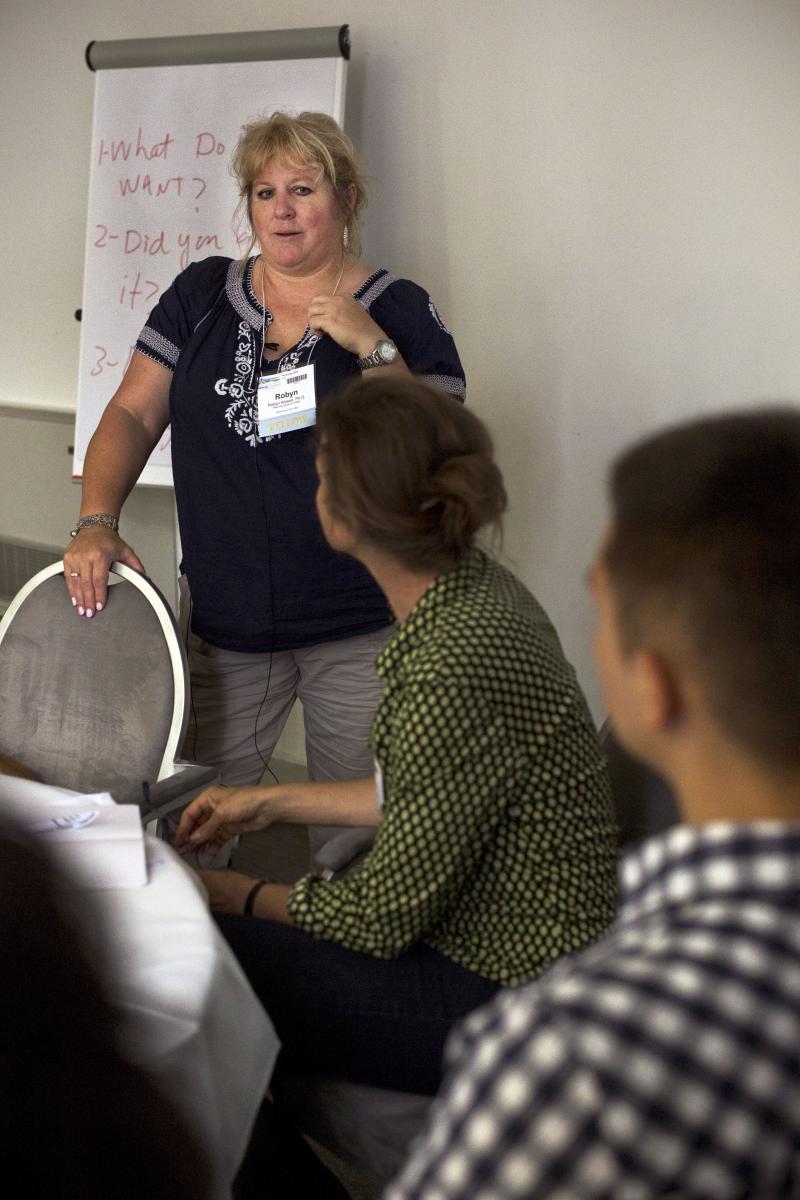 Louise Hayes, Ph.D.
Louise Hayes, Ph.D.
(Applied (in non-clinical settings); Intermediate)
Robyn L. Gobin, Ph.D., Daniel C. Rosen, Ph.D.
(Clinical, Research; Beginner, Intermediate, Advanced)
Maria Karekla, Ph.D., Louise McHugh, Ph.D.
(Clinical, Research, Applied (in non-clinical settings); Intermediate, Advanced)
Siri Ming, Ph.D., BCBA-D, Evelyn Gould, Ph.D., BCBA-D, Julia Fiebig, Ph.D., BCBA-D
(Clinical, Applied (in non-clinical settings); Intermediate, Advanced)
Robyn Walser, Ph.D.
(Clinical; Intermediate, Advanced)
Additional information about registrations, refunds, etc., can be found here.
WC2022 Pre-Conference Workshops Registration
WC2022 Pre-Conference Workshops Registration
VIRTUAL Pre-Conference Workshop Rates (June 4-5, 2022)
This event has concluded, thank you for joining us!
IN-PERSON Pre-Conference Workshop Rates (June 14-15, 2022)
This event has concluded, thank you for joining us!
Click here for more information about Conference registration rates.
Please Note:
- Additional fees are required for certificates that track the number of hours you attended ($12) and CE credits ($65). These fees cover all eligible sessions from June 4-19, 2022, and their recordings.
- All rates in US Dollars.
- We apologize that we may not be able to accommodate special meal requests (gluten free, vegan, allergies, etc.) for registrations received after May 26, 2022.
- To register via Mail or Fax, or pay via PayPal, please use the Printable Version: DOC or PDF.
- Formulario de registro en español disponible aquí: DOC o PDF.
- Faxed (1 (225) 302-8688) or mailed registrations must be received at P.O. Box 655, Jenison, MI, 49429, USA, by June 3, 2022.
-
All attendees to the in-person conference must be “fully vaccinated.” Go here to find more information and submit proof of vaccination via a webform prior to arriving in San Francisco.
- NEED HELP? If you're having trouble registering, please email Abbie at [email protected]
Member Rate Qualification
- Registration rates apply as you register. Subsequent memberships do not qualify those already registered for a refund of the difference between the member and non-member rates. The same is true for students, or other similar status and discounts, unless a full cancellation and refund are issued, and prevailing rates apply.
- Affiliate members (or non-members who are not professionals or students) may register at the professional rate. If you are currently receiving mental health care we encourage you to talk to your provider about the utility of this conference for you, prior to registering.
- Student Registration/Membership is available to individuals who are enrolled in a program of study leading to a bachelor’s, master’s, or doctoral degree, are interns, or are postdoctoral candidates. Postdoctoral candidates qualify for Student Registration for up to 2 years, with proof of status from their employer. After this time, they need to register as a Professional. Note: Those registering for the conference as a student are ineligible to earn any kind of CE credits.
We regret that after May 26, refunds cannot be made, however we will allow a substitute registrant (they can receive access and a certificate in their name). If you need a refund, please contact us via email. (Note: Shared registrations are not permissible... meaning that you can't attend one day and your colleague the next, etc.) No refunds will be granted for no-shows.
It is the responsibility of the registrant to make sure that they have received information related to virtual conference access. If you are registered and do not receive an email granting you pre-conference access (as appropriate) by the morning of June 3, 2022, please contact [email protected].
Cancellation of Pre-conference registration must be submitted in writing via email and must be dated on or before 5:00 p.m. Pacific Daylight Time, on May 26, 2022 to [email protected] to receive a refund minus a $50 USD registration cancellation processing fee.
Changes from in-person registration to virtual registration prior to May 26 incur a $25 registration cancellation processing fee.
We regret that after May 26, full refunds cannot be made, however we will allow:
-
A substitute registrant (they can receive access and a certificate in their name). If you need to make a substitution, please contact us via email. (Note: Shared registrations are not permissible... meaning that you can't attend one day and your colleague the next, etc.); or
-
If you are ill or have been in contact with someone who is ill, you may contact us (by June 14 at the latest) and we will waive the registration cancellation processing fee, and refund your pre-conference registration. Please be prepated to show documentation of illness or contact, if requested.
-
No refunds will be granted for no-shows.
Photographs/Video:
ACBS intends to take photographs and video of this event for use in ACBS newsletters and promotional material, in print, electronic and other media, including the ACBS website and social media accounts. By participating in this event, I grant ACBS the right to use any image, photograph, voice or likeness, without limitation, in its promotional materials and publicity efforts without compensation. All media become the property of ACBS. Media may be displayed, distributed or used by ACBS for any purpose.
Attendees of the World Conference or Pre-Conference Workshops are not permitted to audio or video-record sessions without the express written permission of ACBS.
If you have any concerns regarding the media policy, please feel free to contact us.
Waiver of Liability:
As a condition of my participation in this meeting or event, I hereby waive any claim I may have against the Association for Contextual Behavioral Science (ACBS) and its officers, directors, employees, or agents, or against the presenters or speakers, for reliance on any information presented and release ACBS from and against any and all liability for damage or injury that may arise from my participation or attendance at the program. I further understand and agree that all property rights in the material presented, including common law copyright, are expressly reserved to the presenter or speaker or to ACBS. I acknowledge that participation in ACBS events and activities brings some risk and I do hereby assume responsibility for my own well-being. If another individual participates in my place per ACBS transfer policy, the new registrant agrees to this disclaimer and waiver by default of transfer.
ACTivating Health: A Skills Building Workshop to Help People with Chronic Medical Conditions
ACTivating Health: A Skills Building Workshop to Help People with Chronic Medical ConditionsACTivating Health: A Skills Building Workshop to Help People with Chronic Medical Conditions
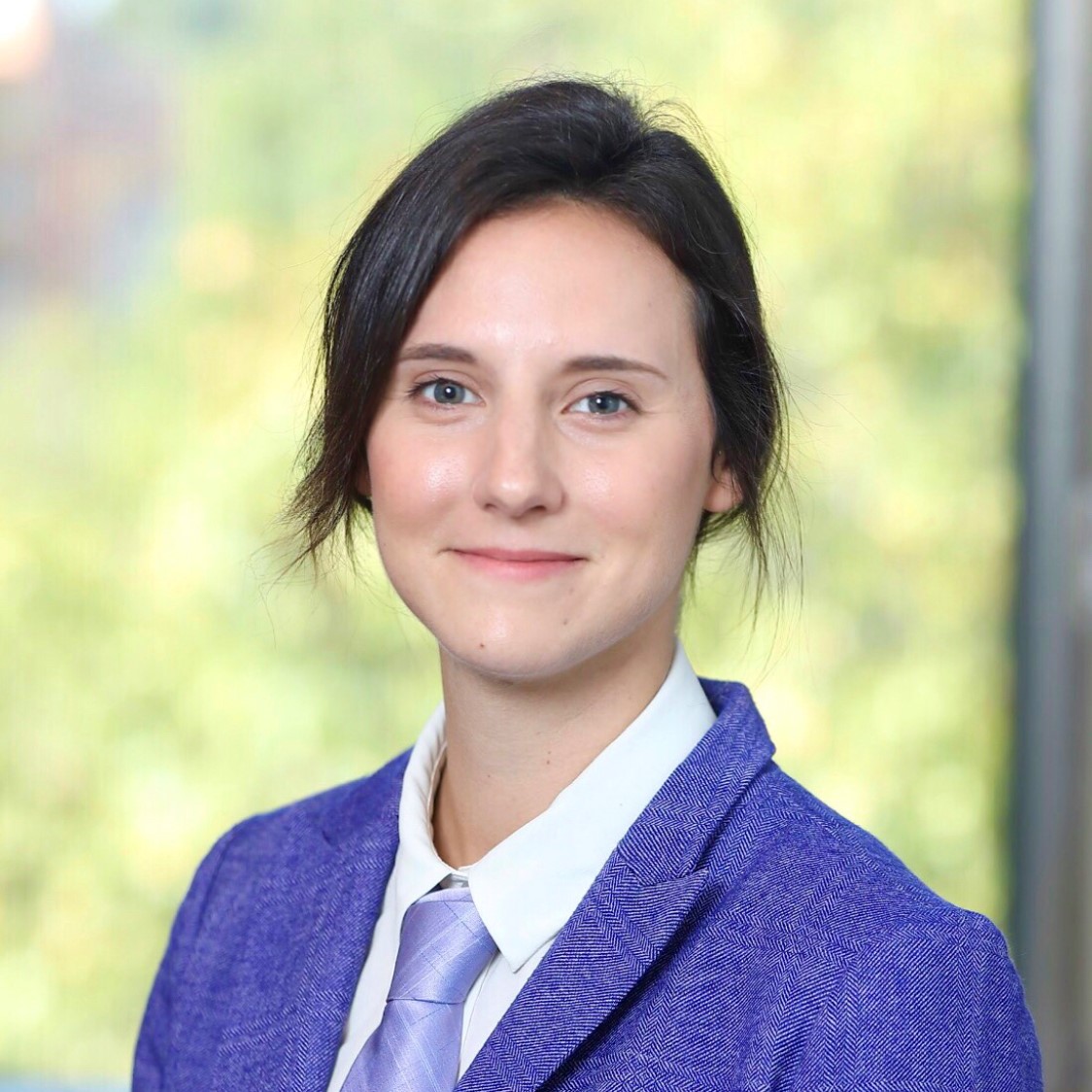
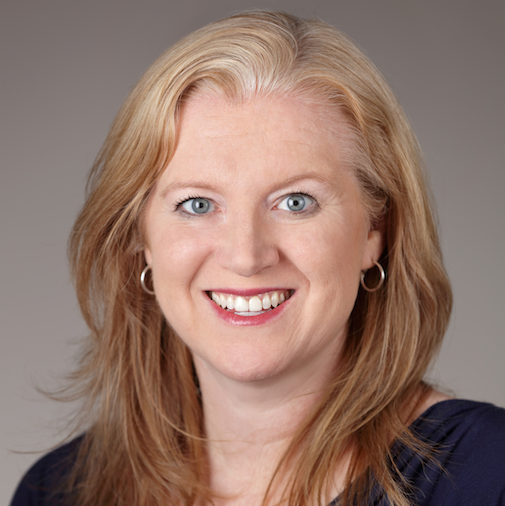
Amanda Rhodes, Psy.D.
Sunday, June 5, 2022 - 8:00 a.m. to 12:00 p.m. UTC/GMT -7 (Pacific Daylight Time)
Over the past decade, scores of articles have been written on the benefits of Acceptance and Commitment Therapy (ACT) for individuals with various medical conditions. Dr. Staci Martin and Dr. Amanda Rhodes are clinical health psychologists at the National Institutes of Health (Greater Washington DC, USA), who are dedicating their careers to studying and applying contextual behavioral science with those experiencing acute and chronic illness.
Undoubtedly, many clients will directly experience a health-related issue during the therapeutic course. These individuals often invest much of their energy towards controlling their symptoms and tend to avoid meaningful activities. This interactive workshop combines didactic (30%) and experiential (70%) methods and is designed for practitioners familiar with the basic tenets of ACT. Drs. Martin and Rhodes will harness their combined knowledge and expertise from decades of experience imbedded in the medical field to teach attendees how to use the power of language and experiential learning to target health behavior change such as increasing daily functioning (work/school, physical activity, social activities, pain coping) and health-promoting behaviors (medication adherence, nutrition, exercise, smoking cessation, and sleep).
Attendees will learn functional behavioral analysis, case conceptualization, watch the presenters role-play, and engage in plenty of small group practice. Through participating in this workshop, attendees will take away new contextual-behavioral perspectives on acute and chronic health issues plaguing many clients, a host of handouts and materials to use in their continued work, and the ability to conceptualize and intervene in real time. Specific modules in this workshop will focus on tailoring this work for people from diverse and under-represented backgrounds, including cultural adaptations of ACT metaphors, modifying interventions to fit the specific developmental needs of children and adolescents, and shaping crucial experiential exercises for individuals with physical disabilities. Finally, given the increasing relevance of e-health interventions, attendees will master how traditional ACT techniques can be conducted effectively in a remote context.
About Staci Martin Peron, Ph.D.:
Staci Martin, Ph.D., is a clinical psychologist with specialized expertise in Acceptance and Commitment Therapy (ACT). She is the President Emeritus of the Mid-Atlantic Chapter of the Association of Contextual Behavioral Science (ACBS), Past President of the ACBS Pain Special Interest Group, and a member of the ACT for Health and CBS and Cancer SIGs. She also is an associate editor of the Journal of Contextual Behavioral Science (JCBS). Dr. Martin routinely conducts trainings for mental health and medical providers on ACT and mindfulness and has presented her work to medical patients at conferences in multiple countries.
Dr. Martin is a Senior Associate Scientist in the Pediatric Oncology Branch (POB) of the National Cancer Institute (NCI), and the Clinical and Training Director of the Health Psychology and Neurobehavioral Research Program. Currently, she is the Principal Investigator of studies examining the effectiveness of Acceptance and Commitment Therapy for adolescents and young adults with Neurofibromatosis Type 1 (NF1) and chronic pain, a mindfulness-based intervention for children with high-risk cancers and their caregivers, and a study of medication adherence for patients on NF1 clinical trials. She routinely conducts therapy with medical patients ranging from children to adults. In addition, she co-chairs the POB’s Diversity Working Group aimed at addressing diversity-related issues in the workplace.
About Amanda Rhodes, Psy.D.:
Amanda Rhodes, Psy.D. is a clinical health psychologist and early career researcher at the National Institutes of Health (USA). Dr. Rhodes specializes in researching and applying acceptance- and mindfulness-based interventions, including ACT, with pediatric and adult populations experiencing chronic illness and pain. She is also trained in psychological assessment of individuals with medical conditions. At the NIH, Dr. Rhodes’ specific work includes ongoing collaborative protocols investigating ACT for sleep disturbance in sickle cell disease; physical activity for late cognitive effects in pediatric brain tumor patients; diet and exercise changes to the gut microbiome and response to immunotherapy; and medication adherence in NF1. She provides trainings and workshops on ACT for chronic illness, conducts neurocognitive assessments, and provides therapeutic services across institutes. Dr. Rhodes has published articles in peer-reviewed scientific journals and presented at international conferences on her research and expertise in clinical health psychology and contextual behavioral science. She currently serves on the Board of Directors for the Association for Contextual Behavioral Sciences (ACBS) Mid-Atlantic Chapter and the ACBS Cancer SIG. She is also the Chair of the ACBS Pain SIG Research committee, Chair of the POB’s Diversity Working Group Education and Training subcommittee, and Co-Leader of the Response Assessment in Pediatric Neuro-Oncology (RAPNO) Neuropsychological Assessment subcommittee. In addition, Dr. Rhodes has a secondary appointment as a clinical assistant professor of psychology at the George Washington University.
Learning Objectives:
Following this workshop participants will be able to:
- Conceptualize how individuals with chronic health conditions use avoidance and fusion in the context of their illness
- Respond effectively to avoidance and fusion in clients with health conditions
- Describe one research finding relevant to ACT for chronic pain
- Employ at least two ACT interventions for clients with chronic pain
- Explain how self-compassion work is relevant in individuals with chronic health conditions
- List two techniques that can be used to illustrate ACT processes effectively via telehealth
- Describe how self-as-context techniques can help broaden the identity and behavioral repertoires of people with medical conditions
- Design two culturally-sensitive health metaphors for under-represented minority populations
- Modify two ACT interventions for children and young adults
- Explain how mindfulness can affect the central nervous system
Target Audience: Intermediate, Advanced, Clinical
Components: Conceptual analysis, Experiential exercises, Didactic presentation, Case presentation, Role play
Package Includes: A general certificate of attendance
Acceptance and Commitment Therapy (ACT) for Children, Adolescents, and Parents: Shaping Psychological Flexibility
Acceptance and Commitment Therapy (ACT) for Children, Adolescents, and Parents: Shaping Psychological FlexibilityAcceptance and Commitment Therapy (ACT) for Children, Adolescents, and Parents: Shaping Psychological Flexibility
Terapia de Aceptación y Compromiso (ACT) para Niños, Adolescentes, y Padres; Moldeando la Flexibilidad Psicológica
*Taller impartido en inglés. Habrá traducción simultánea al español disponible.*
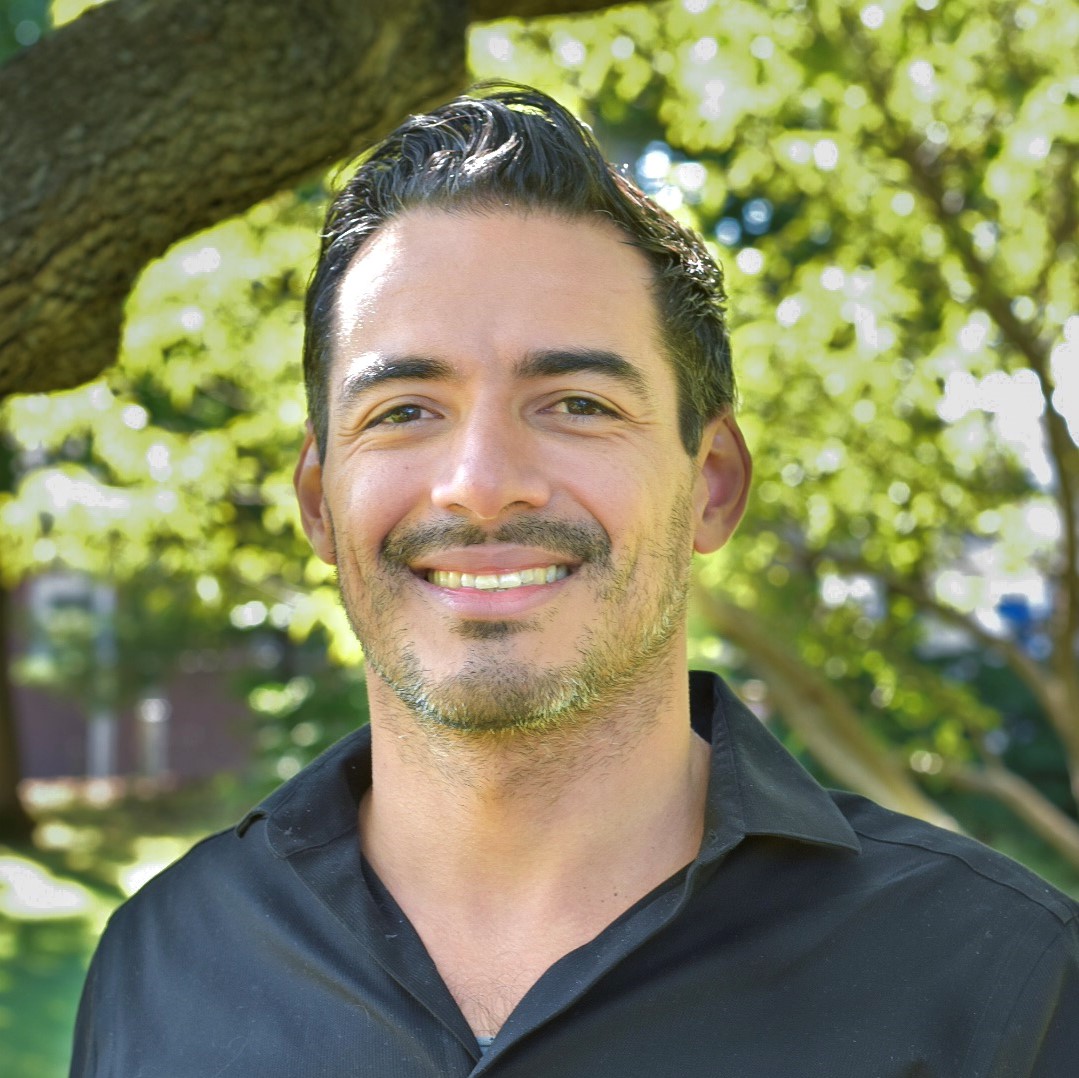
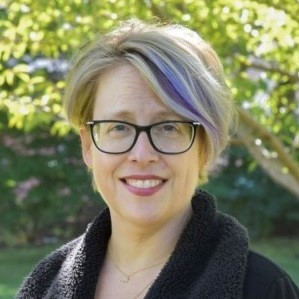
Carlos Rivera, Ph.D.
Sunday, June 5, 2022 - 8:00 a.m. to 12:00 p.m. UTC/GMT -7 (Pacific Daylight Time)
Children and adolescents who struggle with avoidance-based disorders need extra support to develop effective and flexible behavior that helps them build lives that they value. This workshop will provide an overview of ACT for children and adolescents with a focus on the DNA-V model to support the development of psychological flexibility. Participants will learn how to shape perspective-taking skills and discovery behavior that will support trial and error learning to encourage optimal adaptation and coping with a variety of different contexts. The presenter will provide opportunities for skills practice through small groups activities and role plays. Specific attention will be paid to internalizing versus externalizing disorders and developmental issues.
Los niños y adolescentes que luchan con trastornos basados en la evitación necesitan un apoyo adicional para desarrollar un comportamiento eficaz y flexible que que les ayude a construir una vida que valoren. Este taller proporcionará una una visión general de ACT para niños y adolescentes con un enfoque en el modelo DNA-V para apoyar el desarrollo de la flexibilidad psicológica. Los participantes aprenderán a formar habilidades de toma de perspectiva y comportamiento de descubrimiento que que apoyen el aprendizaje por ensayo y error para fomentar la adaptación y el afrontamiento óptimo en una variedad de contextos diferentes. Los presentadores ofrecerán oportunidades para practicar las habilidades a través de actividades en grupos pequeños y juegos de roles. Se prestará especial atención a los trastornos de interiorización y exteriorización y los problemas de desarrollo.
About Lisa Coyne, Ph.D.:
Dr. Coyne is the Founder and Senior Clinical Consultant of the McLean OCD Institute for Children and Adolescents at McLean Hospital and is an Assistant Professor at Harvard Medical School. She is the Founder and Executive Director of the New England Center for OCD and Anxiety (NECOA) and is Past President of the Association of Contextual Behavioral Science (ACBS). She is member of the Clinical and Scientific Advisory Board and is on the Faculty of the Behavior Therapy Training Institute (BTTI) of the International OCD Foundation (IOCDF). She is also a licensed psychologist, a peer-reviewed ACT trainer, and author. She has authored multiple articles and chapters on ACT with children and adolescents and is a co-author of the books Acceptance and Commitment Therapy: The Clinician’s Guide for Supporting Parents (Elsevier), and The Joy of Parenting (New Harbinger). Her new books, Stuff That’s Loud: A Teen’s Guide to Unspiralling When OCD Gets Noisy (New Harbinger & Little Brown), Stop Avoiding Stuff: 25 Microskills to Face Your Fears and Do It Anyway, were published in 2020.
About Carlos Rivera, Ph.D.:
Carlos E. Rivera Villegas, Ph.D. is a Clinical Psychologist and the Director of The New England Center for OCD and Anxiety, New York. His role includes providing individual, family, and group therapy to youth, adults, and parents; supervising students in training; and developing training programs for individuals and clinicians. Dr. Rivera Villegas specializes in the treatment of OCD and anxiety and related disorders such as Acceptance and Commitment Therapy (ACT) and Exposure and Response Prevention (ERP). His area of clinical and research interests include the development of acceptance- and mindfulness-based therapies, as well as their adaptation and dissemination to Spanish Speaking communities. Dr. Rivera Villegas completed his Ph.D. at Suffolk University in Boston and his clinical internship at Harvard Medical School/Cambridge Health Alliance. He has also worked and trained at places including The Child and Adolescent OCD Institute at McLean Hospital, The Center for Anxiety and Related Disorders at Boston University, and Boston Children’s Hospital. He is a member of the Association for Contextual Behavioral Science (ACBS), the National Latinx Psychological Association (NLPA), and the Massachusetts Psychological Association (MPA). He has worked with the Latinx communities for over the past fifteen years.
Learning Objectives:
Following this workshop participants will be able to:
- Describe a contextual behavioral approach to avoidance-based disorders of childhood
- Engage clients and their caregivers in effective rationales for treatment, based on a psychological flexibility paradigm
- Develop a therapeutic relationship characterized by acceptance, values, compassion and commitment, that supports the client in engaging in process-based contextual behavioral treatment
- Shape curiosity, willingness, flexibility, and valuing in children, teens, and parents
- Engage clients using valuing as action and direction to “contextualise” discovery behavior and place approach-based tasks under appetitive control
- Engage in useful discussion around developmentally sensitive ways to engage children, teens, and parents in treatment
- Prepare and utilize the process of a functional behavioural assessment and case conceptualization to develop a collaborative treatment plan with clients
- Use clinical RFT methods to enhance tracking and contact with contingencies to usefully explore discovery behavior
- Use clinical RFT methods to foster flexible perspective-taking to enhance engagement in treatment and promote functional senses of self
- Describe the DNA-V model and the three functional classes of behavior it addresses
Después de este taller, los participantes podrán:
- Describir un enfoque conductual-contextual para los trastornos basados en la evitación de la infancia
- Involucrar a los clientes y a sus cuidadores en la justificación efectiva del tratamiento basado en un paradigma de flexibilidad psicológica
- Desarrollar una relación terapéutica caracterizada por la aceptación, valores, compasión, y compromiso, que apoye al cliente en la participación del tratamiento conductual-contextual basado en el proceso
- Formar la curiosidad, la voluntad, la flexibilidad y la valoración en niños, adolescentes y los padres
- Involucrar a los clientes utilizando la valoración como acción y dirección para "contextualizar" la conducta de descubrimiento y poner las tareas de aproximación bajo control apetitivo
- Participar en un debate útil sobre las formas de involucrar a los niños, adolescentes y padres en el tratamiento, teniendo en cuenta su desarrollo
- Preparar y utilizar el proceso de una evaluación y conceptualización conductual-funcional del caso para desarrollar un plan de tratamiento colaborativo con los clientes
- Utilizar métodos clínicos de RFT para mejorar el seguimiento y el contacto con contingencias para explorar útilmente la conducta de descubrimiento
- Utilizar los métodos clínicos de RFT para fomentar la toma de perspectiva flexible con el fín de mejorar un compromiso en el tratamiento y promover sentidos funcionales del yo
- Describir el modelo DNA-V y las tres clases funcionales de comportamiento que este aborda
Back to Basics: An Experiential Introduction to Acceptance and Commitment Therapy
Back to Basics: An Experiential Introduction to Acceptance and Commitment TherapyBack to Basics: An Experiential Introduction to Acceptance and Commitment Therapy

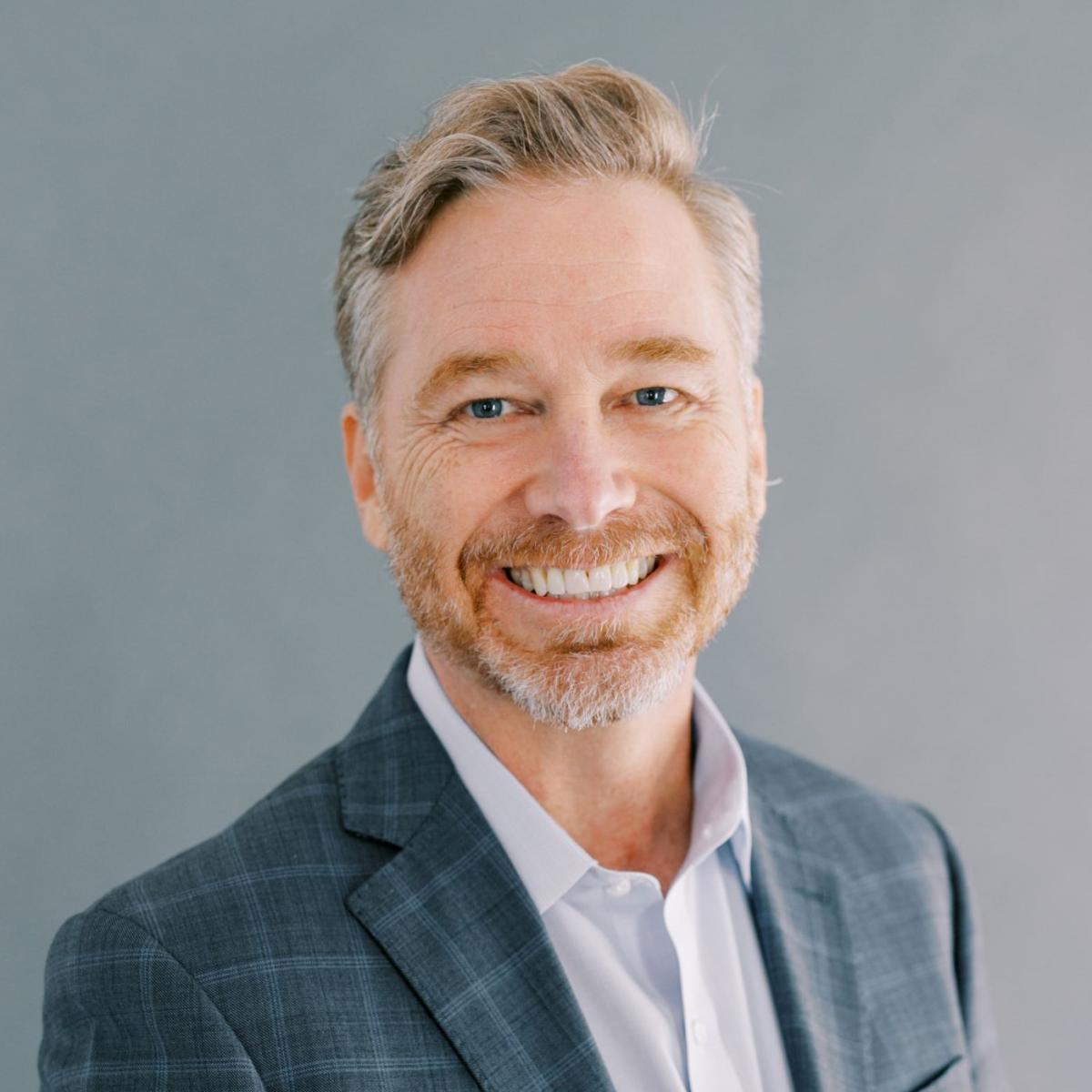
Wednesday, June 15, 2022 - 9:00 a.m. to 5:00 p.m.
Acceptance and commitment therapy (ACT) is a transdiagnostic behavior change model that draws on acceptance, mindfulness, and values-based action. Clients learn to encounter thoughts and feelings as they occur, without dwelling on them nor pushing them away. At the same time, they are encouraged to act on their most deeply held values. In over 800 randomized controlled trials and nearly 200 meta-analyses, ACT is efficacious for a wide variety of problems that humans face. Rather than going after reducing symptoms, ACT increases psychological flexibility: the capacity to turn to the present moment as a conscious human being and take action according to personally-chosen values.
This two-day workshop will provide a simple yet powerful experiential introduction to ACT for helping professionals from any discipline. It can also serve as a reintroduction for those who want to go review the basics again, get out of the weeds, and reorient themselves to fully integrating ACT into their practice. The focus will be on plain language, practical ways of understanding the psychological flexibility model, drawing on many clinical and personal examples. By the time you’re done, you should not only have a felt sense of what psychological flexibility is like in practice, but also have a more refined ability to put your own words on the concepts, both for yourself and your clients.
Training modalities will include brief lecture, clinical vignettes, clinical demonstrations, mindfulness exercises, experiential exercises, large group discussions, small group discussions, and small-group skills practice. We will give special attention to places new and intermediate learners tend to get stuck. Perhaps you wonder how the “observer” perspective connects to “flexible perspective taking” or haven’t even heard those terms before. Maybe you don’t really know what the heck “function” and “context” mean. Maybe it is hard to see how ACT is a behavior therapy, intimately connected to ideas like reinforcement and classical conditioning you haven’t thought about since graduate school. Maybe you struggle to make sense of how you can integrate what you already know from years of practice into your ACT work. All of these questions and concerns are welcome and will be addressed. Finally, this workshop will incorporate an understanding of how to tailor ACT to the unique needs of your client population, use the psychological flexibility model as a framework to support your own lifelong cultural humility practice, and draw on ACT processes to encounter your own pain and suffering, whether it arises in your work, personal life, or both.
About Matthew Boone, LCSW:
Matt Boone (he/him) is a social worker, psychotherapist, writer, and speaker who specializes in translating mental health concepts for the public. He is the co-author, with Jennifer Gregg and Lisa Coyne, of Stop Avoiding Stuff: 25 Microskills to Face Your Fears and Do It Anyway, and the editor of the book Mindfulness and Acceptance in Social Work. He is the Director of Programming and Outreach at the student mental health services of the University of Arkansas for Medical Sciences, where he’s an instructor in psychiatry. He is an Association of Contextual Behavioral Science peer-reviewed acceptance and commitment therapy (ACT) trainer and a former consultant for the VA ACT for Depression training rollout, and he regularly facilitates ACT trainings for professionals and the public. At Lyra Health, a mental health tech startup, he led the clinical development of Lyra’s mental health coaching program, which is based on ACT, CBT, and DBT, and he oversaw the training of its first 100 coaches. At Cornell University, he oversaw the development of Let's Talk, an outreach program to underserved students that has since been replicated at nearly 100 colleges and universities. He lives in Little Rock with his wife, cat, and guitars and loves talking about mental health with people who think psychotherapy and self-help are a bit cringy.
About Rajinder (Sonia) Singh, Ph.D.:
Rajinder (Sonia) Singh, Ph.D. (she/her) is a research investigator and psychologist the Central Arkansas Veterans Healthcare System and the University of Arkansas for Medical Sciences in Little Rock, Arkansas. She completed her Ph.D. in clinical psychology at Bowling Green State University. Dr. Singh’s research interests include the integration of implementation science and health equity, specifically for gender and sexual minority populations and how to engage and empower consumers in implementation. Dr. Singh’s clinical interest include applying contextual behavioral science principles to improve health equity. Dr. Singh has published over 25 peer-reviewed articles, currently serves as a member of the Editorial board of the Journal of Contextual Behavioral Science, has presented several research presentations, and co-led workshops focused on contextual behavioral approaches in working with Queer and Trans People of Color.
Learning Objectives:
Following this workshop participants will be able to:
- Describe the psychological flexibility model and its 6 components: acceptance, defusion, present moment awareness, self-as-context, values, and committed action
- Describe the paradoxical nature of attempts to control private experiences
- Conceptualize their clients from an ACT perspective
- Facilitate 3 strategies for helping their clients be more willing with private events
- Utilize 3 techniques for helping clients defuse from language and meaning making
- Incorporate present moment awareness into the moment to moment interactions between them and their clients
- Describe how to help clients contact the “observer” perspective in the presence of painful private events
- Demonstrate how to support clients to flexibly move between the observer perspective and and other useful perspectives
- Demonstrate how to orient clients towards actions based on their personally chosen values instead of devoting energy to controlling are avoiding painful private events
- Identify ways to incorporate the professional skills they already have into their ACT work with clients
- Describe how to draw on the psychological flexibility model to help them with their own unworkable stories and painful emotions – both in their work with clients and in their lives more broadly
- Use the psychological flexibility model as a framework for supporting their lifelong cultural humility practice
- Describe how to build open, caring, and flexible relationship with clients
Target Audience: Beginner, Intermediate, Clinical
Components: Literature review, Experiential exercises, Didactic presentation, Case presentation, Role play
Package Includes: A general certificate of attendance, lunch, and twice daily coffee/tea break on site.
Bolstering Acceptance and Commitment Therapy interventions in the area of health by incorporating cutting-edge RFT research
Bolstering Acceptance and Commitment Therapy interventions in the area of health by incorporating cutting-edge RFT researchBolstering Acceptance and Commitment Therapy interventions in the area of health by incorporating cutting-edge RFT research

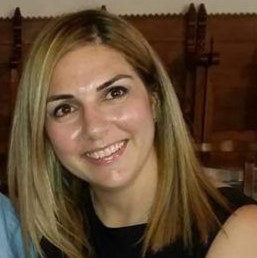
Wednesday, June 15, 2022 - 9:00 a.m. to 5:00 p.m.
Acceptance and Commitment Therapy (ACT) is gaining increasing support in the area of Health. This workshop aims to train people to use ACT in health domains and introduce the basics of Relational Frame Theory (RFT) and the implications of “cutting-edge” RFT research to support more flexible ACT process work. We will present evidence-based ACT techniques for working in various health related areas (cancer, asthma, cardiovascular problems) and with various health related behaviors (medication adherence, eating and body image issues, sleep, smoking, craving management). We will provide a basic understanding of RFT concepts that can be challenging for clinicians (e.g., derived relational responding, transformation of stimulus function) and explore how the basic concepts of RFT can facilitate more flexible ACT interventions in these areas. Multiple experiential exercises and role-plays will be presented across the workshop to develop skills in applied RFT bolstering ACT practices. Aspects of digitizing RFT informed ACT practice in the area of health will also be presented. Latest cutting-edge developments and research will be intertwined within the presentations.
About Maria Karekla, Ph.D.:
Maria Karekla, Ph.D., licensed clinical psychologist, peer-reviewed Acceptance and Commitment Therapy trainer, and Associate Professor, University of Cyprus. She is heading the “ACTHealthy: Clinical Psychology and Behavioral Medicine” laboratory. She received her doctorate degree in Clinical Psychology from the University at Albany, SUNY. She completed her residency at the University of Mississippi Medical Center and Veterans Administration Hospital. Her research focuses on areas of health promotion and the investigation of individual difference factors (especially psychological flexibility parameters) as they relate to the development and maintenance of various behavioural difficulties (especially anxiety, eating, and health related problems). Additionally, she examines the treatment of these difficulties utilizing Acceptance and Commitment-based principles and innovative delivery methods (e.g., digital interventions, virtual reality). Her research (>90 scientific peer reviewed publications) received numerous local, European and international grants, and awards by (among others) the European Council and Pompidou’s group, the Society of Behavioral Medicine, and the Association for the Advancement of Behavior Therapy. She is currently the chair of the Clinical Psychology Doctorate committee, University of Cyprus. She is also the convenor of the European Federation of Psychology Associations’ Psychology and Health committee and a member of the e-health task force. She recently completed terms in chairing the Cyprus Bioethics Committee on Biomedical Research and being a member of the Cyprus Psychologist Licensing Board. She presently serves as president-elect of the Association for Contextual Behavioral Science, from where she received the status of “Fellow” in 2019. In 2021 she became a fellow of the Society of Behavioral Medicine, whereas in 2018 she was nominated as Cyprus “Woman of the Year: Academic/Researcher category.” Her first psychotherapeutic childrens’ story book was nominated in 2017 for the National Literary Awards in the category Children/Adolescents and also for her illustrations for the book. She is a TEDx speaker and she has been hosted and interviewed for her work by numerous podcasts, newspapers, TV and radio stations nationally and internationally.
I have been a member of ACBS almost from its inception and have been actively involved in the organization from multiple roles and posts. Presently I serve as the President-elect of the board and I serve on the Conference Strategy Committee and as an Associate Editor for the Journal of Contextual Behavioural Science.
About Louise McHugh, Ph.D.:
Louise McHugh is a Professor of Psychology at University College Dublin. She is a world leading expert in Contextual Behavioural Science (CBS) and Acceptance and Commitment Therapy (ACT). She has published over 100 papers and her H index is 38 (4539 citations). Her work has been funded by national and international funding bodies such as the Irish Research Council, the Health Research Board, FP7, the British Academy, the ESRC and the Leverhulme Trust. Louise has been a Fellow of the Association for Contextual Behavioural Science since 2014. Prof. McHugh is the Director of the UCD CBS lab. Ongoing research projects in the CBS lab involve behavioural interventions for people experiencing homelessness (funded by the IRC), smoking cessation (funded by the IRC and the HRB) and interventions for patients with Inflammatory Bowel Disease (in Collaboration with St Vincent’s University Hospital Dublin). I am an active and participating member in the Association for Contextual Behavioural Science (ACBS); I serve on the Conference Strategy Committee (2012-present) and I was elected to the board of directors (2014-2016). Since 2015 I have been an Associate Editor for the Journal of Contextual Behavioural Science. Presently I serve as the president-elect of the UK and Ireland ACBS chapter.
Learning Objectives:
Following this workshop participants will be able to:
- Summarize recent developments in the area of health and health behaviors and associated behavioral problems from a Contextual Behavioral Science perspective
- Implement RFT and ACT interventions into the management of health-related conditions and problematic health behaviors
- Describe RFT concepts that can be challenging for clinicians (e.g., derived relational responding, transformation of stimulus function, motivative augmentals)
- Design enhanced ACT exercises according to recent RFT research.
- Use RFT to support patients with health-related issues such as medication adherence, body image, sense of self, etc.
- Conduct functional analysis of difficulties arising as part of a health condition & of problematic health behaviors
- Utilize single-case design and idiographic approaches clinically for individualizing treatment and examining their effectiveness
- Incorporate digital technologies in applied RFT and ACT work with health-related behaviors and conditions
- Utilize cutting edge methodologies and digital technologies to conduct research or in practice
- Adapt ACT interventions for health behaviors across different cultures
Target Audience: Intermediate, Advanced, Clinical, Research, Applied (in non-clinical settings)
Components: Conceptual analysis, Literature review, Original data, Experiential exercises, Didactic presentation, Case presentation, Role play
Package Includes: A general certificate of attendance, lunch, and twice daily coffee/tea break on site.
Breathing Compassion into Evidence Based Therapy: Integrating CFT into your Contextual Behavioral Science Practice featuring CFT Founder, Dr. Paul Gilbert
Breathing Compassion into Evidence Based Therapy: Integrating CFT into your Contextual Behavioral Science Practice featuring CFT Founder, Dr. Paul GilbertBreathing Compassion into Evidence Based Therapy: Integrating CFT into your Contextual Behavioral Science Practice featuring CFT Founder, Dr. Paul Gilbert
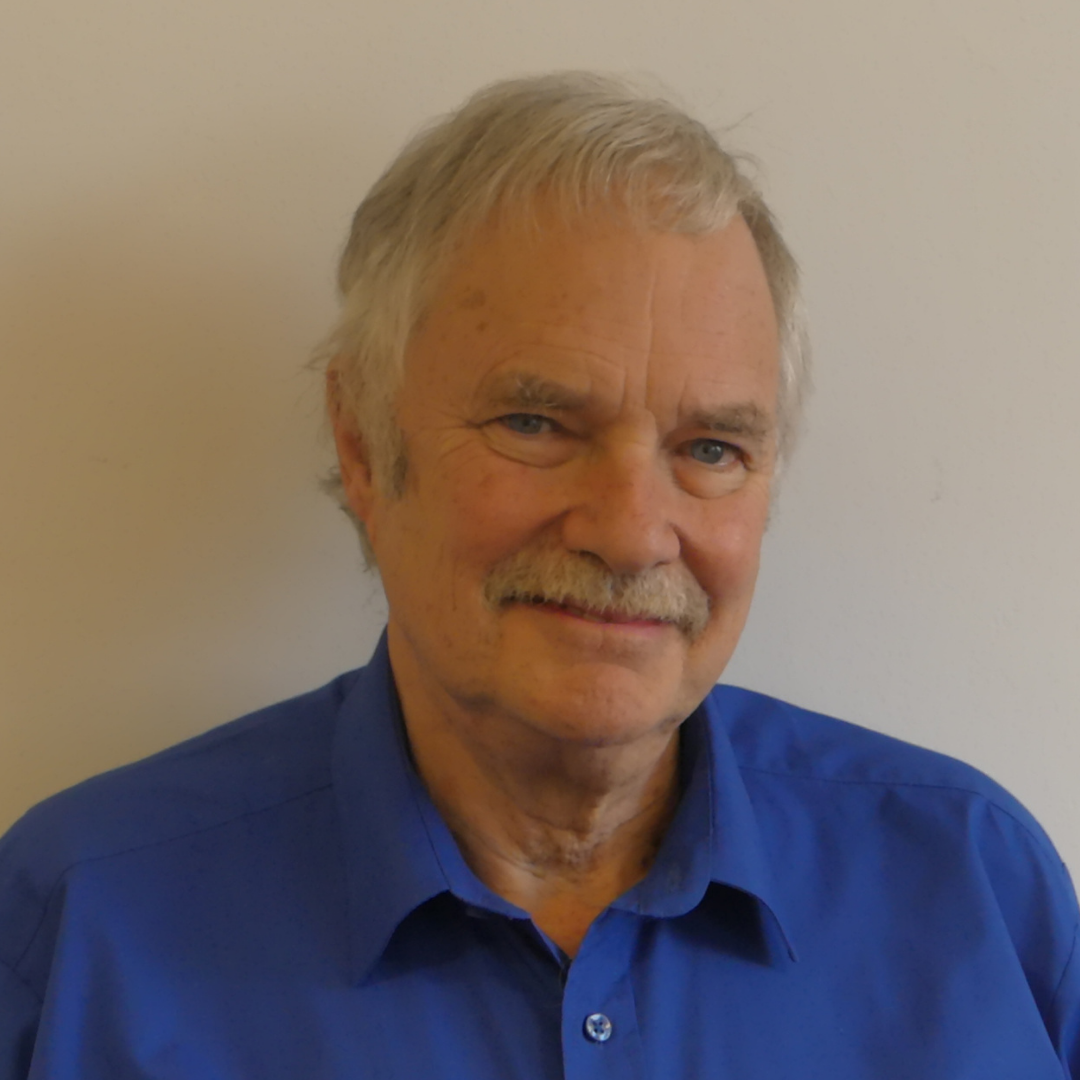
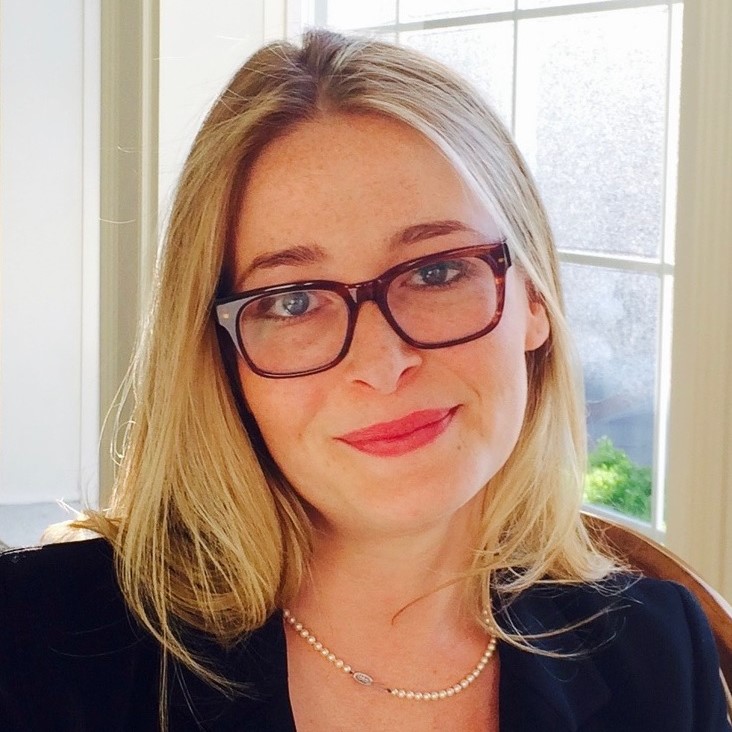
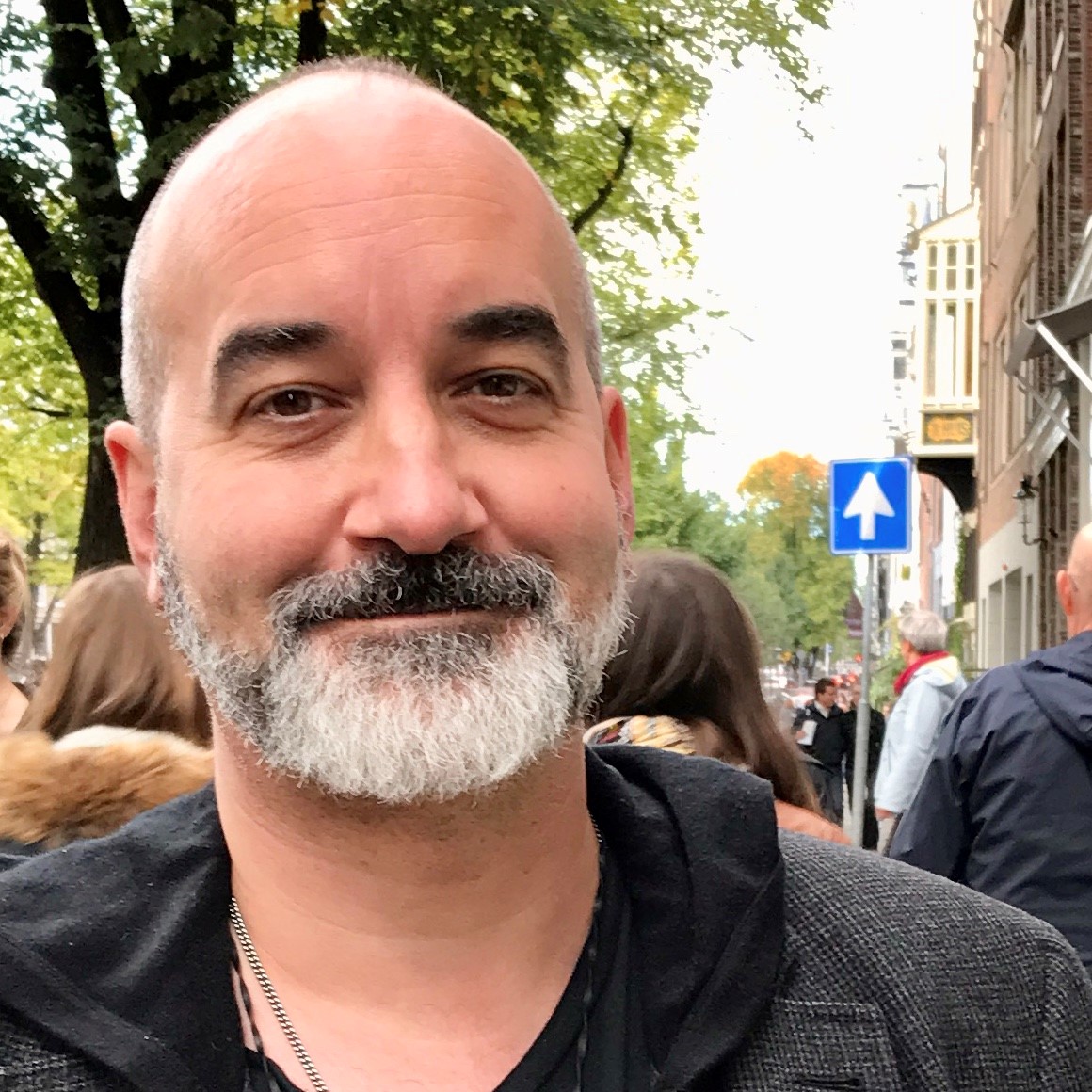
Laura Silberstein-Tirch, Psy.D.
Sunday, June 5, 2022 - 8:00 a.m. to 12:00 p.m. UTC/GMT -7 (Pacific Daylight Time)
Psychotherapists all over the world know that mindfulness and compassion training can help clients transform their lives, but many are still in need of specific ways to bring the power of mindful compassion directly into their behaviorally oriented therapy practice? This workshop is designed to bridge the gap between your current practice and an evidence based, compassion-focused approach.
Compassion Focused Therapy (CFT) is a cutting-edge, evidence-based psychotherapy that takes the "third wave" of psychotherapy further, expanding the frontiers of contemplative psychotherapy by deliberate awakening our compassionate minds. For thousands of years, wisdom traditions have used mindfulness, acceptance and compassion based training as a platform to transform the mind. Developed by Dr. Paul Gilbert, CFT puts that process in your hands, drawing on rigorous behavioral psychology, neuroscience and evolutionary theory.
This deeply experiential workshop will be facilitated by two practitioners who are leading the way in integrating CFT and ACT, Dr. Dennis Tirch and Dr. Laura Silberstein-Tirch, and will feature direct training with Dr. Paul Gilbert, the founder of CFT.
This online workshop will take you on a journey into the foundations of CFT. Going beyond basic training, participants will engage in the core Compassionate Mind Training practices found in CFT, through a structured program. Participants will learn how to move beyond mere theory, to implement CFT interventions for a range of problems. We will also learn how unlocking deeper training in mindfulness and compassion can empower our clinical work, and can create new possibilities for us as people.
Grounded in CFT's evolutionary theory, participants will explore a range of topics including:
- The role of mindfulness, compassion and acceptance in effective psychotherapy
- How to use mindfulness and compassion techniques in the therapy relationship.
- Using CFT with other evidence-based therapy methods like ACT, CBT & DBT
- Using CFT to work with chronic shame and self-criticism
This training is specifically designed to help Acceptance and Commitment Therapy (ACT) and other behavior therapy practitioners deepen their understanding and practice of compassion focused treatment of anxiety and mood disorders. CFT methods can complement and strengthen even a state-of-the-art therapeutic approach like ACT, and the bridge to a compassion focused approach is more accessible than it might seem.
Through group work and a series of experiential exercises participants will build the foundation needed to advance their CFT skills base, and to grow as a clinician. Further you will get to have your questions and concerns addressed by some of the top trainers in CFT, including the form's originator, Dr. Paul Gilbert.
About Dennis Tirch, Ph.D.:
Dr. Tirch is the Founding Director of The Center for Compassion Focused Therapy. He is an author of 6 books, and numerous chapters and peer reviewed articles on mindfulness, acceptance and compassion in psychotherapy. His books include Experiencing ACT from the Inside Out, a self-practice/self-reflection workbook for therapists, and The Compassionate Mind Guide To Overcoming Anxiety, the first evidence-based self-help book to apply the science of compassion to the treatment of anxiety. With Dr. Laura Silberstein-Tirch and others, Dr. Tirch is currently developing a research protocol involving behavioral science and CFT for treating anxiety, worry and fear-based difficulties through compassionate courage cultivation.
Dr. Tirch serves as, Past President of the Association for Contextual Behavioral Science (ACBS), President of The Compassionate Mind Foundation USA, Associate Clinical Professor at The Icahn College of Medicine at Mt. Sinai Medical Center, Fellow of ACBS, Founding President Emeritus of The New York City Chapter ACBS, Fellow & Certified Consultant & Trainer for The Academy of Cognitive Behavioral Therapy, Fellow and Past-President of The New York City CBT Association. Dr. Tirch’s work has been covered by numerous media outlets, including; The Wall Street Journal, The Washington Post, The New York Times, The New York Post, NPR, WIRED, and O Magazine.
Dr. Tirch regularly conducts training workshops and courses globally, live and online, and has served as an invited speaker for many organizations, such as Columbia University, The University of New South Wales, The University of Hong Kong, The NYC-CBT Association, ABCT, ACBS, New York Univeristy, Cornell University, and the Kagyu Samye Ling Buddhist monastery, and The Institute for Meditation and Psychotherapy.
In addition to his work in clinical psychology, Dr. Tirch has based his life upon meditative and contemplative disciplines for over 40 years. Dr. Tirch has taken Dharma Holder vows in Soto and Rinzai lines, with The Zen Garland Order; Sanjujo Kai vows in Tendai Shu Buddhism; serves as an Ambassador for The Ram Dass Fellowship; and is a long time practitioner in the J.G. Bennett Line of the Gurdjieff Work, with Robert Fripp and The Guitar Circle community. Dr. Tirch’s work in this area can be found in his book Buddhist Psychology and CBT: A Clinician’s Guide with Laura Silberstein and Russell Kolts, as well as in private instruction. Dr. Tirch is involved in Bhakti Yoga and Kirtan practice, blending American traditional, guitar based, country-blues music with Kirtan and mantra musical forms of meditation.
Prior to founding The Center, Dr. Tirch collaborated with leading CBT therapist, Dr. Robert Leahy, at The American Institute for Cognitive Therapy for 12 years, serving as Associate Director of The Institute. Dr. Tirch has worked closely with CFT Founder, Dr. Paul Gilbert, in the development of compassion focused approaches for anxiety.
Dr. Tirch has benefited by participating in numerous trainings with many mentors, experts, friends and colleagues such as Paul Gilbert, Robert Leahy, Kelly Wilson, Steven C. Hayes, Robert Fripp, Robyn Walser and Zindel Segal. Dr. Tirch is a founding participant in the ACT peer consultation group for New York City and Environs (ACTNYCE).
Dr. Tirch is a New York State licensed clinical psychologist who has served as an Assistant Clinical Professor at Weill-Cornell Medical College, and as an Adjunct Associate Professor at Albert Einstein Medical School.
Dr. Tirch received his PhD from Fairleigh Dickinson University.
About Laura Silberstein-Tirch, Psy.D.:
Laura Silberstein-Tirch, Psy.D. is the Director of The Center for Compassion Focused Therapy. She is a New York and New Jersey state licensed psychologist who specializes in evidence based therapies for adults and adolescents. In addition to her work at The Center, Dr. Silberstein-Tirch serves as an Adjunct Assistant Professor consultant at at the Ferkauf School of Psychology, Albert Einstein College of Medicine of Yeshiva University, and has served as a consultant to Memorial Sloan Kettering Hospital. Dr. Silberstein-Tirch is the President Elect of The Greater New York City Chapter of The Association of Contextual Behavioral Science (ACBS) and the President Elect of The Compassion Focused SIG of ACBS.
Dr. Silberstein-Tirch has specialized in working with anxiety disorders, mood disorders, trauma, insomnia, impulse control difficulties and emotion regulation problems.
Dr. Silberstein-Tirch is committed to an approach to evidence based psychotherapy grounded in compassion, mindfulness, and psychological flexibility. She has advanced training and experience in CFT, ACT, CBT and DBT. Dr. Silberstein-Tirch has worked with a range of trainers including Steven Hayes, Robert Leahy, Kelly Wilson, Paul Gilbert, and Marsha Linehan. She is a founding member and board member at large of the Greater New York Chapter of The Association for Contextual Behavioral Science.
Dr. Silberstein-Tirch received her doctorate in Clinical Psychology from the Ferkauf Graduate School of Psychology at the Albert Einstein School of Medicine, Yeshiva University in New York. For two years, she served as an extern clinician at the American Institute for Cognitive Therapy, in Manhattan. Dr. Silberstein-Tirch’s pre-doctoral internship involved delivering CBT and DBT services in both inpatient and outpatient settings at Wyoming State Hospital. Additionally, Dr. Silberstein-Tirch completed a two year Postdoctoral Fellowship in Cognitive Behavioral Therapy at the Cognitive Behavioral Institute of Albuquerque, New Mexico.
Dr. Silberstein-Tirch is the co-author of the books, Buddhist Psychology and Cognitive Behavioral Therapy, A Clinician’s Guide, The ACT Practitioner’s Guide to The Science of Compassion and Experiencing Acceptance and Commitment Therapy from The Inside Out.
Dr. Silberstein-Tirch’s research on the relationships between mindfulness, psychological flexibility and emotional schemas has been presented at several national international scientific conferences and published in the International Journal of Cognitive Therapy. This research was undertaken in collaboration with Dr. Robert Leahy and Dr. Dennis Tirch, as a part of the research program at The American Institute for Cognitive Therapy, which examines the fundamentals of Emotional Schema Theory. Dr. Silberstein-Tirch regularly delivers presentations in the New York area and internationally.
About Paul Gilbert, Ph.D., OBE:
Professor Paul Gilbert is an internationally recognized clinical psychologist, researcher, best-selling author, speaker, and founder of Compassion Focused Therapy (CFT).
Researching evolutionary approaches to psychopathology for over 35 years, with a particular focus on shame and the treatment of shame-based difficulties, Professor Gilbert created the Compassionate Mind Foundation to support global research, also working to develop and promote the practice of CFT.
He currently serves as Professor of Clinical Psychology at the University of Derby and is visiting Professor at the University of Queensland. He and colleagues founded the Compassionate Mind Foundation as an international charity in 2006.
He has written/edited 22 books and over 300 academic papers and book chapters.
His best-selling book Overcoming Depression, 3rd Edition (2009), reflects decades of research about understanding and treating depression, focusing on compassion. The Compassionate Mind (2009) shares the latest research about compassion, its value and how to enhance its capacity.
His most recent book, Living like Crazy (2019), indicates how modern society is driving the abundance of mental health and societal problems and how we can create more compassionate ways of living.
Professor Gilbert served on the first British Government’s National Institute for Health Care Excellence (NICE) guidelines for depression. He was president of the British Association for Cognitive and Behavioral Psychotherapy in 2003.
In recognition of his significant contributions to mental healthcare, he was made a Fellow of the British Psychological Society in 1993 and awarded the prestigious Order of British Empire (OBE) in 2011 by the Queen.
Learning Objectives:
Following this workshop participants will be able to:
- Describe the foundational evolutionary model of compassion, mindfulness and emotion used in CFT.
- Use the CFT "Three Circle Model" of emotion regulation in clinical contexts.
- Understand and be able to discuss and utilize Social Mentality Theory in psychotherapy and in scalable interventions.
- Utilize the therapeutic relationship to create a context of relational safeness in the therapy room as a part of CFT process
- Outline and implement a CFT model of functional analysis of interpersonal exchanges in psychotherapy, using the therapist's response to shape client behavior.
- Discuss the multiple self-model and intervention set in CFT
- Have a working knowledge of multiple-self dialogue work in CFT
- Identify and embody the 12 competencies of compassion, experientially training patients in using these elements.
- Use a working knowledge of specific therapist micro-skills and active therapy processes that can lead to greater flexibility and adaptive responding in the moment.
- Deploy a range of specific techniques that are focused on cultivating the competencies of compassion in the therapy relationship.
Target Audience: Beginner, Intermediate, Advanced, Clinical
Components: Conceptual analysis, Literature review, Experiential exercises, Didactic presentation, Role play
Package Includes: A general certificate of attendance
Enhancing the effectiveness of Applied Behavior Analysis through Acceptance and Commitment Training (ACT)
Enhancing the effectiveness of Applied Behavior Analysis through Acceptance and Commitment Training (ACT)Enhancing the effectiveness of Applied Behavior Analysis through Acceptance and Commitment Training (ACT)

Sunday, June 5, 2022 - 1:00 p.m. to 5:00 p.m. UTC/GMT -7 (Pacific Daylight Time)
Despite the success of ABA practitioners in the field, there are areas where the field could do a much better job. For instance, helping caregivers deal with the challenges of raising a child with autism, staff burnout, and clients dealing with the dark side of higher language as they acquire it. These common challenges encountered by ABA practitioners often involve problematic language, rule deriving, and rule-governed behavior. Acceptance and Commitment Therapy (ACT) is a behavior analytic evidence-based approach to enhance human wellbeing and performance while weakening the control of complex verbal repertoires. ACT aims to help individuals adapt to the current environment by increasing response variability (flexibility) and successfully obtaining life’s reinforcers even when in the presence of challenging experiences. With ACT, we can help caregivers thrive in the face of the difficulty of parenting a child with special needs, help motivate staff to do difficult work while preventing burnout, and help our clients acquire resiliency and flexibility while moving through life with a sense of purpose. With ACT, we as practitioners can continue to do our best work in the face of life and work challenges.
This workshop will introduce participants to a behavior analytic framework for doing ACT. The basic philosophical assumptions and principles of behavior analysis underlying ACT will be presented to orient clinicians to the ongoing assessment and intervention of verbal behavior within the scope of practice of behavior analysts. Roleplay and experiential exercises throughout the workshop will give participants a fundamental repertoire to use ACT, so they are better equipped to deal with the everyday challenges found in practice while improving ABA treatment outcomes.
About Luisa Cañon, Psy.D., BCBA-D:
Dr. Cañon is a Clinical Behavior Analyst and a Licensed Psychologist in California. She has over two decades of experience working with families of children and adults with autism, developmental delays, and behavioral challenges from both Applied Behavior Analysis (ABA) and Acceptance and Commitment Therapy (ACT) perspectives. She is the co-founder and director of research and development of the Institute for Effective Behavioral Interventions (IEBI), an organization that provides state-of-the-art behavioral intervention for children with autism, and the founder and director of ACT to Thrive, a center dedicated to the provision of ACT-focused training, consultation, and treatment services. Her current research projects include implementation of ACT with parents, youth, and staff; and training behavior analysts in relationship building, compassionate care, behavioral flexibility, and clinical behavior analysis. Dr. Cañon has leadership roles within the Association for Contextual Behavioral Sciences (ACBS) and is currently a graduate research mentor for the University of Nevada Reno.
Learning Objectives:
Following this workshop participants will be able to:
- Define ACT as a behavior analytic approach, the problematic repertoires and replacement repertoires that contribute to behavioral inflexibility/flexibility
- Explain Rule Governed Behavior (RGB), Contingency Shaped Behavior (CSB) and Transformation of Stimulus Function
- Identify the ways that ACT can fit within the scope of practice of ABA and is consistent with Baer, Wolf, & Risley (1968)
- Identify common forms of inflexibility from parents in parent training, children and staff
- Identify at least 2 ACT based interventions for each of the ACT 6 repertoires that might be utilized by ABA practitioners to facilitate desired overt behavior change in parents, children and staff
- Practice functional analyses of the therapist and client’s behavior, track the effects of the intervention, and adjust behavior to enhance context sensitivity.
Target Audience: Beginner, Intermediate, Clinical
Components: Conceptual analysis, Experiential exercises, Didactic presentation, Role play
Package Includes: A general certificate of attendance
Facing change and becoming stronger: Helping adults face change using the growth framework of ACT
Facing change and becoming stronger: Helping adults face change using the growth framework of ACTFacing change and becoming stronger: Helping adults face change using the growth framework of ACT
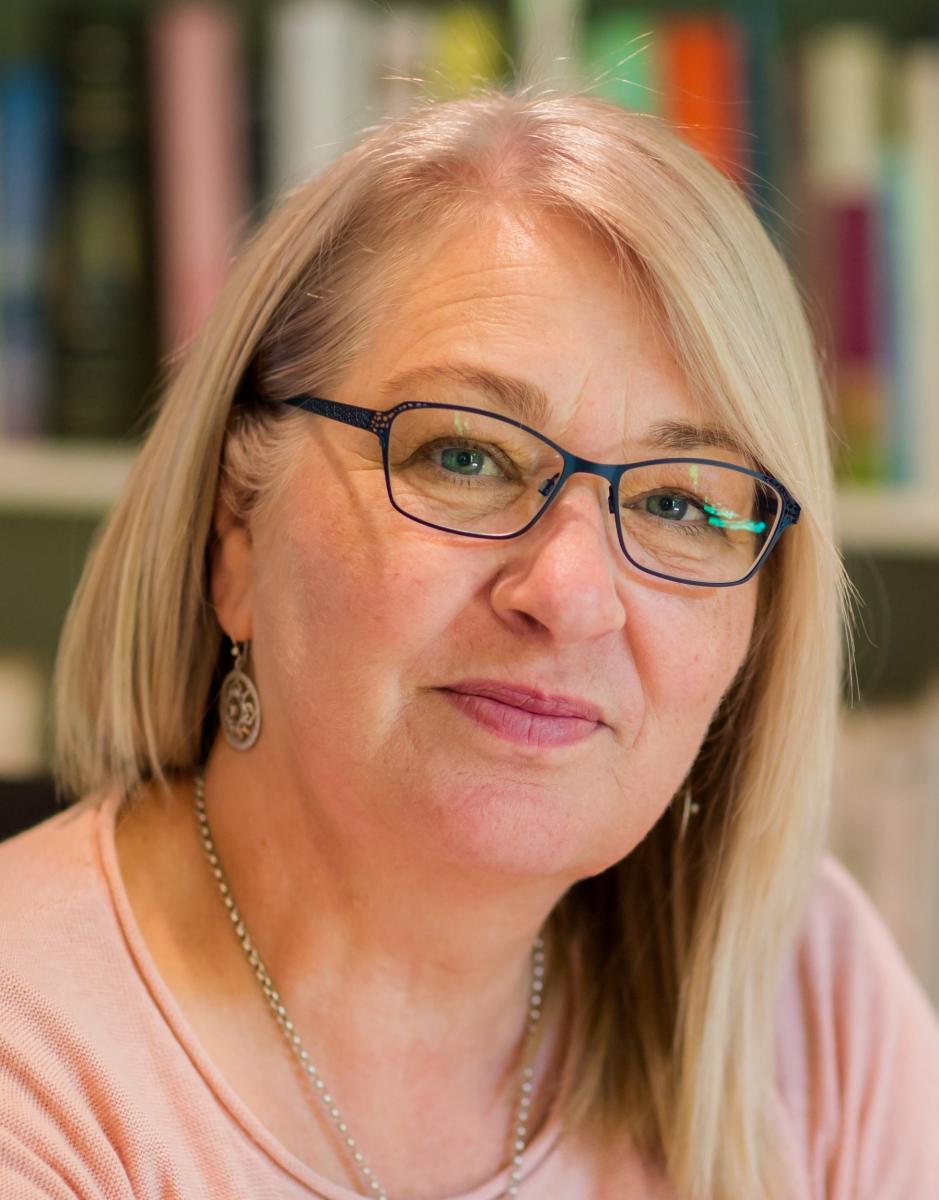
Wednesday, June 15, 2022 - 9:00 a.m. to 5:00 p.m.
We are now, more than ever, living in a world full of uncertainty and change. How we adapt in this time is a question we all face. In this context, DNA-v as a growth model of Acceptance and Commitment Therapy is a liberating way to approach helping adults.
This workshop will deliver a clear, inspiring, and readily applied change model to help adults grow. It is the culmination of years of writing for the new book What Makes You Stronger (L. Hayes, J. Ciarrochi, and A. Bailey), due for release in July 2022. The workshop will suit professionals working with adults in all settings, including coaching, education, and counselling. Practitioners all across the world have been quick to adapt DNA-v into their work with adults, and here we’ll give you new tools, skills, and practices to really make this come alive.
DNA-v stands as a robust model of human change. It has spurred enormous growth in the adolescent market, inspiring clinical protocols, school curriculums, and research. The initial application to youth made sense because it is accepted that youth are in a time of dramatic change. And yet, adults face dramatic change too: relationships come together and break up, people age, get sick, recover health, lose and find jobs, they must constantly adapt to new technology, and face world changes like COVID-19 or climate change. Change is our only constant.
Adults can strive for development and growth each day. They don’t always need ‘therapy’, but they will benefit from psychological flexibility inside this growth paradigm. This workshop will show how to help people build greater strength.
Science and accessibility will be our key focus. The strength in DNA- v is its solid and clear scientific foundation and the readily accessible framework. In this workshop, we plan to use these two themes of science and accessibility to support adults who want more from life and to feel empowered.
The workshop will be divided into two sections to help professionals working with adults in multiple settings:
- Becoming stronger within -- We will explore our vulnerable selves, conceptual, compassionate, achieving, and profound selves.
- Becoming more connected in social relationships -- We will explore how to help adults understand their social histories and build relationships founded on flexibility and compassion.
About Louise Hayes, Ph.D.:
Dr. Louise Hayes is a clinical psychologist, author, and international speaker. She is the Past President of ACBS, and a peer reviewed Acceptance and Commitment Therapy/Training (ACT) trainer. Together with Joseph Ciarrochi she developed DNA-v, which is a developmental model of acceptance and commitment therapy. She is the co-author of the best-selling book, Get Out of Your Mind and into your Life for Teenagers: A Guide to Living an Extraordinary Life; and the practitioner book, The Thriving Adolescent: Using Acceptance and Commitment Therapy and Positive Psychology to Help Teens Manage Emotions, Achieve Goals, and Build Connection, and Your Life Your Way released in 2020. In 2022 she will release a new book using DNA-V with adults, What Makes You Stronger. Louise is also an active clinician, working with adult and adolescents in private practice. She was a Senior Fellow with The University of Melbourne and Orygen, The National Centre of Excellence in Youth Mental Health.
Learning Objectives:
Following this workshop participants will be able to:
- Describe the literature on change and the relationship with stress and health
- Describe DNA-v foundational skills as they apply to adults
- Describe the application of DNA-v to an adult sense of self in five ways
- Demonstrate and apply strategies to build physical and emotional balance
- Demonstrate and apply flexibility strategies with their conceptual self
- Demonstrate and apply procedures to support achievement goals
- Demonstrate and apply procedures to build compassion, awareness, and profoundness in daily living
- Explain the application of DNA-v to relationships
- Demonstrate and apply practices for stronger social interactions
- Demonstrate and apply strategies for working with difficulties social interactions
Target Audience: Intermediate, Applied (in non-clinical settings)
Components: Conceptual analysis, Literature review, Experiential exercises, Didactic presentation, Case presentation, Role play
Package Includes: A general certificate of attendance, lunch, and twice daily coffee/tea break on site.
Here, Now, and Between Us: Functional Analytic Psychotherapy and the power of the therapeutic relationship
Here, Now, and Between Us: Functional Analytic Psychotherapy and the power of the therapeutic relationshipHere, Now, and Between Us: Functional Analytic Psychotherapy and the power of the therapeutic relationship
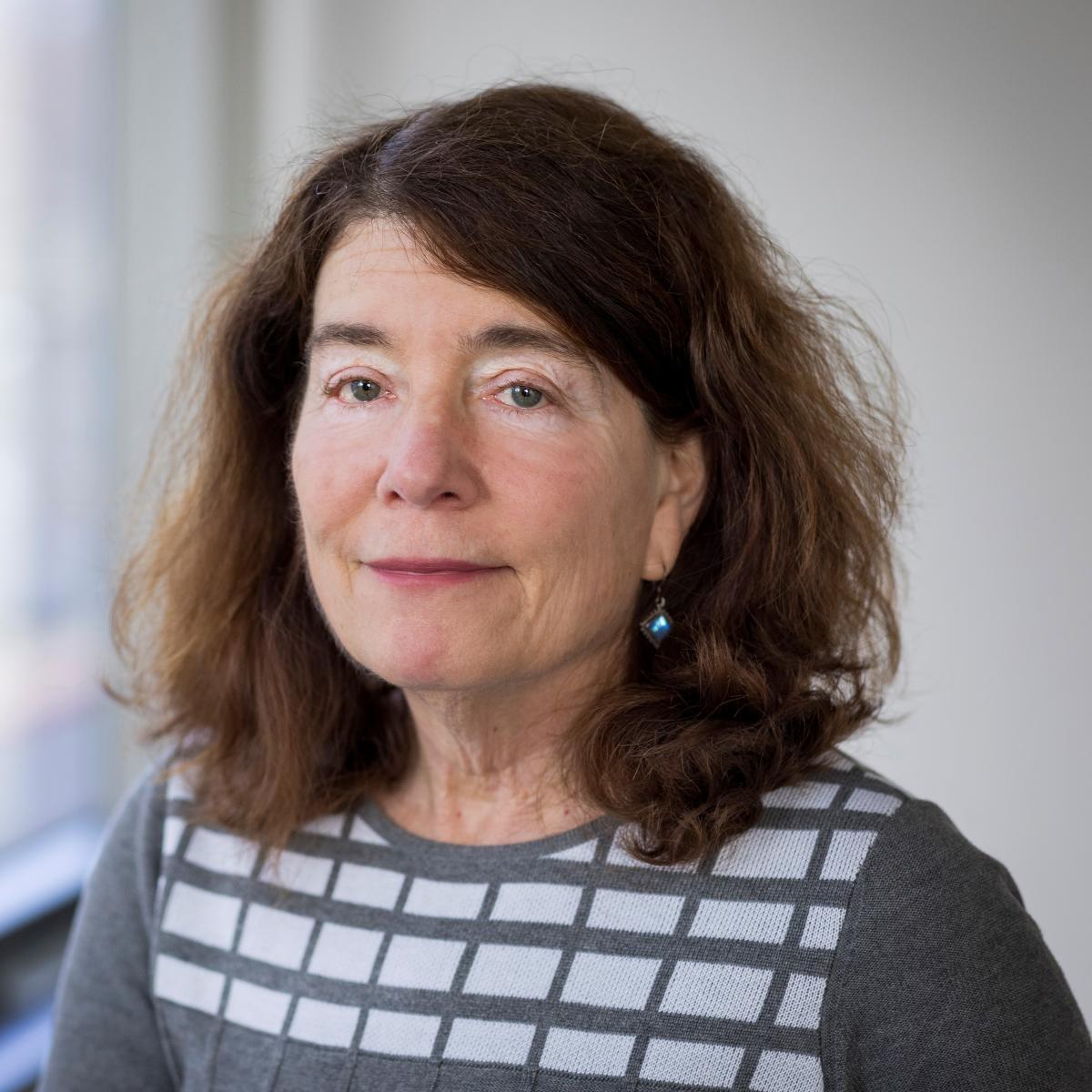
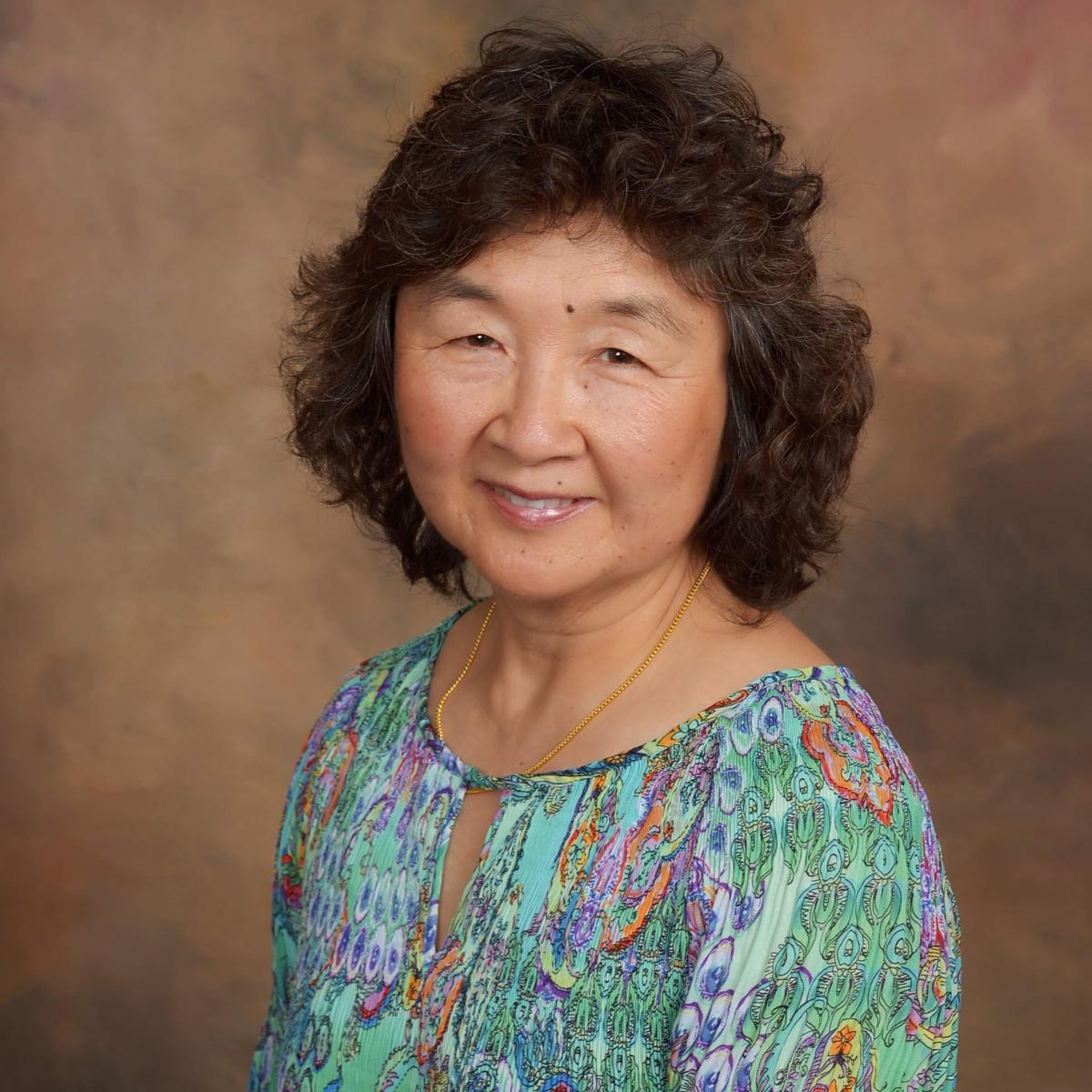
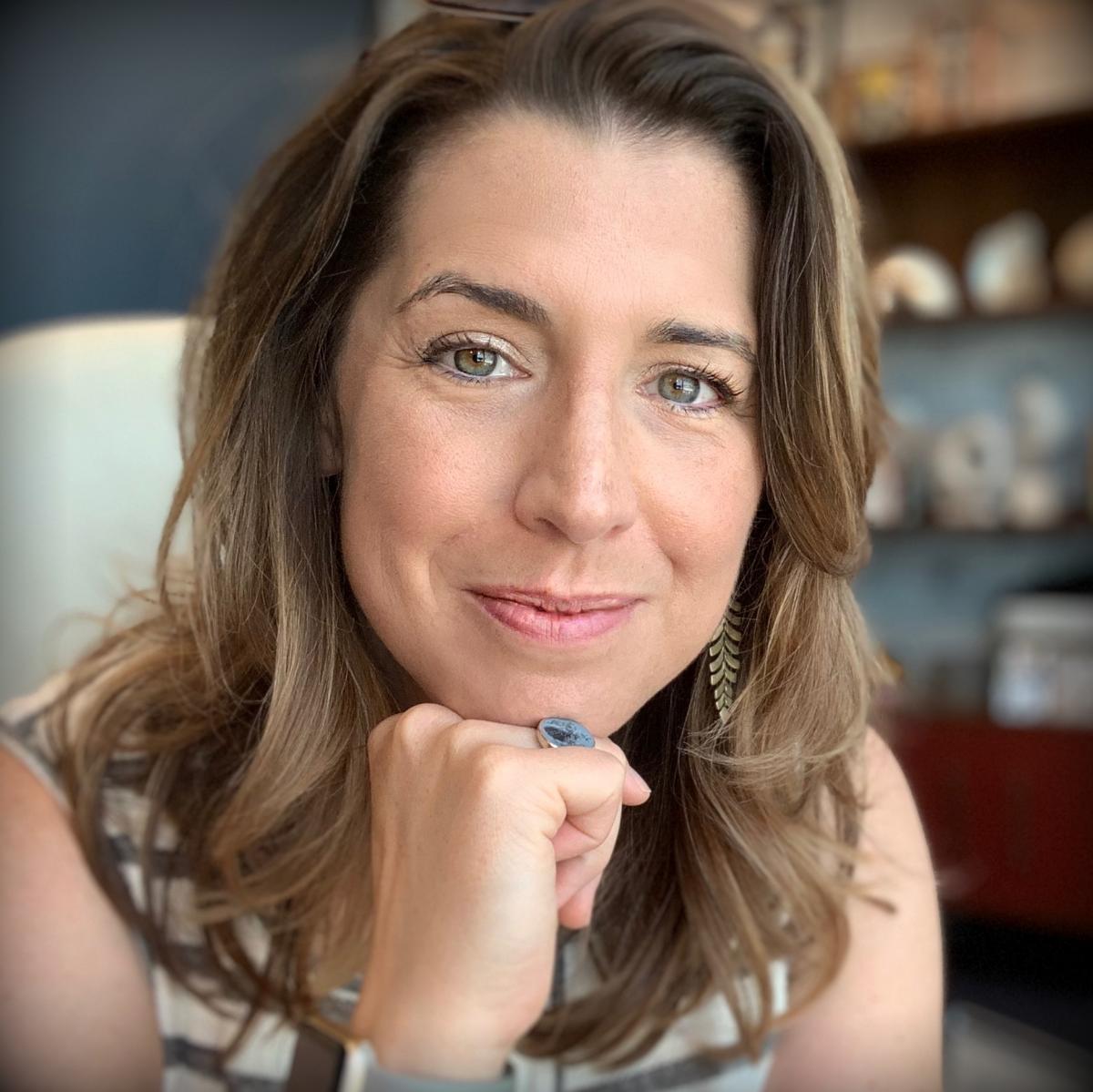
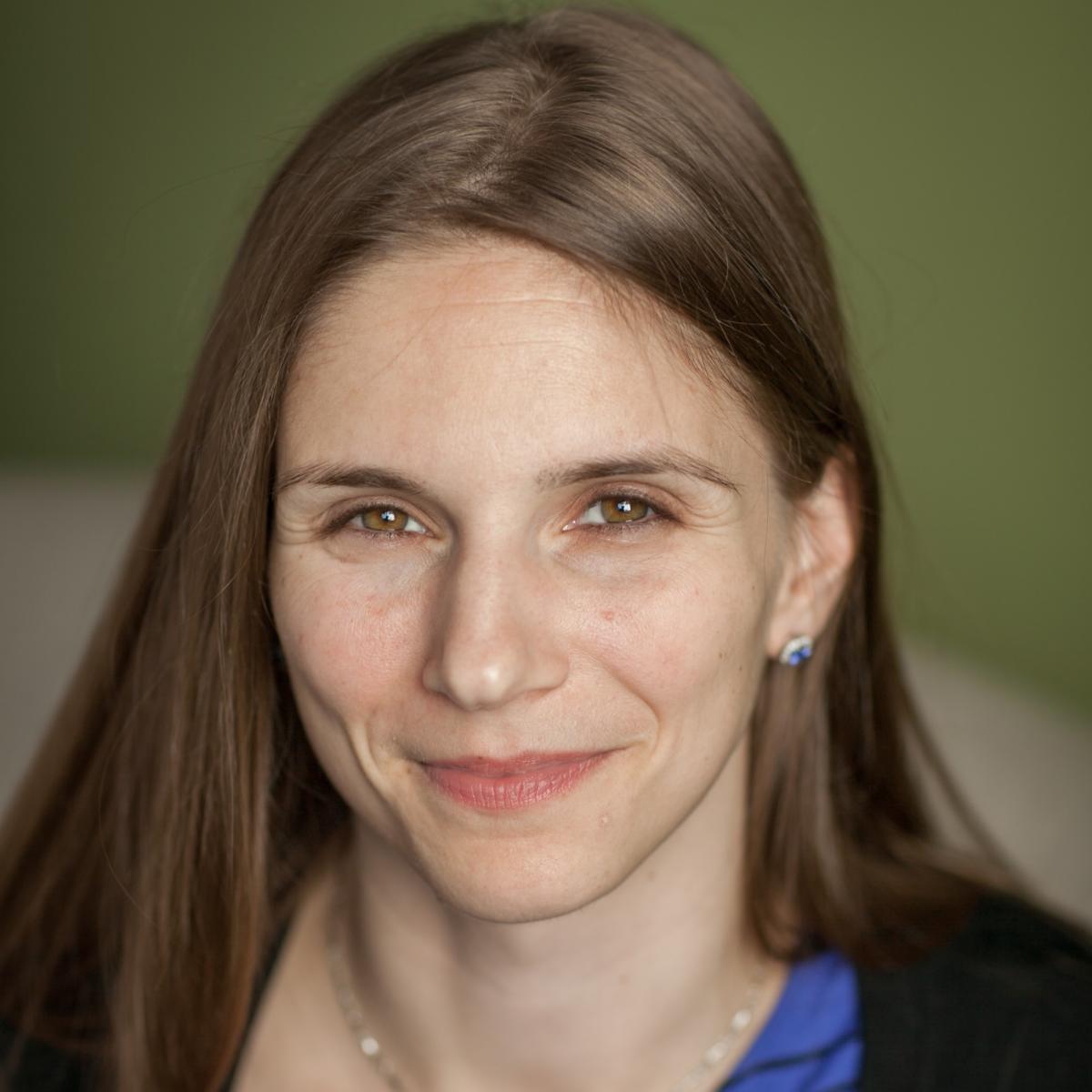
Sunday, June 5, 2022 - 1:00 p.m. to 5:00 p.m. UTC/GMT -7 (Pacific Daylight Time)
**We are offering this workshop in memory of beloved FAP co-founder, Bob Kohlenberg. Bob was enthused by the collection of contextual behavioral training content we offered during his farewell pre-conference workshop in 2021, so we will rely on those same tools as the backbone of the structure of the current workshop.**
As numerous pressures push our profession towards manualized intervention toolkits targeted at nomothetically-defined outcomes, this workshop aims to cultivate your ability to harness the wellspring of therapeutic opportunity available within each unique relationship we create with our clients. This is the promise of Functional Analytic Psychotherapy: a Contextual Behavioral Science (CBS) therapy for those who value basic behavioral science as much as they feel awed by the power of the therapy relationship.
We will begin by presenting a clear theoretical rationale, rooted in basic behavioral tenants, for integrating a particular type of interpersonal focus within any therapy approach you already practice. Five simple, yet profound, rules of practice comprise this framework: 1) identify clinically-relevant behavior occurring in session via functional analysis, 2) evoke these behaviors during the therapy hour, 3) shape these behaviors with your immediate, authentically attuned responses, 4) customize and refine your responding by observing the impact of your interpersonal reinforcers on the client, and 5) work with the client to generalize improved in-session behavior into life outside of therapy. In this workshop, you will have the opportunity to practice seeing and hearing your clients through this lens of compassionate functional analysis and to enhance your awareness of tools for reinforcing client improvements.
As technical as the underlying behavioral roots of FAP are, the therapy that emerges from them is fundamentally human and emotionally intimate as it calls on both client and therapist to engage in reciprocal transactions of candid behavior. The relationship comes alive and transforms into an in-vivo laboratory in which you invite the client to attempt new, more effective behaviors in service of their values and goals within the therapy session. As the work progresses, FAP therapists shape and reinforce improvement by illuminating the positive impact it has on both them and the therapy relationship. In short, we encourage clients to practice, “right here, right now,” behaviors that are functionally equivalent to those they wish to implement in their lives outside of session. Because clients emit new behaviors in your presence, they benefit from the enhanced reinforcement of your immediate and sincere responding. Hence, increasing your own self-awareness, courage, and judiciousness in how you share your authentic self and emotional vulnerability allows you to augment the potency of your in-the-moment responses to clients.
Following a logical arc that weaves together essential didactic elements of theory, CBS rationale, and ethical considerations, the workshop will also present a curriculum of experiential exercises that provides balance among intellectual, practical, and personal development. Of note, we will encourage you to reveal yourself, including your vulnerability, to the extent that it supports your learning and development both personally and professionally and with an ongoing, thoughtful consideration of your needs and limits within the workshop setting. Along the way, you will create a FAP Case Conceptualization for a client, begin a FAP Therapist Case Conceptualization for yourself, and practice the 5 Rules of FAP in “real-plays” with peers in small groups. We will prepare you to learn from these experiential exercises, and to take FAP on the road with you to your clients, via didactic presentations, live demonstrations, segments of video from therapy sessions conducted by the trainers, and a collection of FAP-consistent clinical tools and resources that you will take home with you.
Whether you are new to FAP or have been practicing FAP for years, our hope is that you will leave the workshop with a deepened awareness of yourself, an awakened excitement about the possibilities of the therapy relationship, and an enlivened commitment to igniting it with each of your clients. As trainers, we plan to do the same.
About Sarah Sullivan-Singh, Ph.D.:
Dr. Sullivan-Singh earned her doctoral degree in clinical psychology from UCLA and completed a postdoctoral fellowship within the University of Washington Rehabilitation Medicine Department before beginning her independent practice. She is a Clinical Instructor within the University of Washington (UW) Psychology Department where she supervises graduate students treating clients using ACT and FAP. Dr. Sullivan-Singh also regularly guest lectures to psychology interns in the UW Department of Psychiatry and Biobehavioral Sciences. She is routinely engaged in training students and professionals in FAP through individual supervision/consultation as well as workshops and online courses; she has also worked on treatment development for and provided clinical supervision within a randomized-controlled trial of FAP at the UW Center for the Science of Social Connection. As partner of The Seattle Clinic, a collective of independent practitioners focused on evidence-based practice, Dr. Sullivan-Singh is fortunate to be surrounded by students and colleagues who support her in following the lifelong path of encountering her gaps in awareness and knowledge and, in response, learning to acknowledge and fill them – and through that process constructing increasingly authentic relationships with greater healing potential.
About Mary P. Loudon, Ph.D.:
Dr. Loudon earned her doctorate in clinical psychology at the University of Washington where she developed expertise in Contextual Behavioral Science (CBS) approaches including FAP and Acceptance and Commitment Therapy (ACT). While her academic research in and after graduate school focused on the psychological impacts of sexual and racial minority identity, her passion for clinical work drove her career path towards the provision of care directly to individuals and couples in therapy. After 6 years of co-leading the FAP Practicum for doctoral students at UW, and completing her post-doctoral fellowship with Dr. Mavis Tsai, she became a Certified FAP Trainer. Since this time she has thoroughly enjoyed innovating new training approaches for workshops, intensives, and online courses in FAP. Today, Dr. Loudon balances roles as a psychologist in private practice, a founding partner of The Seattle Clinic, Clinical Instructor/Supervisor at the University of Washington Department of Psychology, and supervisor/consultant to pre- and post-doctoral trainees seeking to develop expertise in FAP, ACT, and Emotionally-Focused Couples Therapy (EFT). The majority of time that remains is spent indulging in family life with her wife and two children, and in her vibrant community of friends and colleagues at The Seattle Clinic.
About Mavis Tsai, Ph.D.:
Dr. Tsai, co-originator of FAP, is a clinical psychologist and senior research scientist at University of Washington’s Center for Science of Social Connection. She is the co-author of five books on FAP (some of which have been translated into Portuguese, Spanish, Japanese, Italian, Korean and Persian), and over 70 articles and book chapters. She is an ACBS Fellow, and received the Washington State Psychological Association’s Distinguished Psychologist Award in recognition of significant contributions to the field of psychology. She gave a TEDx talk “Create Extraordinary Interactions”, has presented “Master Clinician” sessions at the Association for Behavior and Cognitive Therapy, has led numerous workshops nationally and internationally, and trains online clinicians all over the world in FAP. As Executive Director of the Nonprofit Organization ‘Awareness, Courage & Love Global Project” which brings FAP to the general public, she trains volunteers to lead chapters in six continents to create a worldwide- network of open-hearted change-seekers who strive to meet life’s challenges through deepening interpersonal connection and rising to live more true to themselves.
About Barbara Kohlenberg, Ph.D.:
Barbara Kohlenberg, Ph.D. is a Professor in the Department of Psychiatry and Behavioral Science and also in Family and Community Medicine. She is a clinical psychologist, who received her Ph.D. at the University of Nevada, Reno. Her NIH funded research has focused on Acceptance and Commitment Therapy (ACT) and Functional Analytic Psychotherapy (FAP) and their integration and application with substance use disorders and stigma. Dr. Kohlenberg is an ACT trainer and a FAP trainer, and has contributed to the literature in these areas and has conducted trainings internationally. Dr. Kohlenberg is interested in psychotherapy training in psychiatric residency programs, and in growing bedside manner among family medicine residents.
Dr. Kohlenberg has deep interests in the role of compassion, acceptance, and relationship in promoting behavior change. She cherishes direct patient care, as well as training psychiatry residents. Helping both patients and residents learn that one can change one’s relationship with suffering rather than having to “get rid” of suffering is meaningful for her.
Out of work Dr. Kohlenberg loves cooking, eating, walking, reading/listening to podcasts, and creating and participating in nurturing communities. She loves the beauty of our desert climate while always also missing the green and grandeur of the Pacific Northwest, where she grew up.
Learning Objectives:
Following this workshop participants will be able to:
- Describe the 5 Rules of FAP and the behavioral theory underlying them.
- Delineate functional classes of behavior that may get expressed differently across contexts.
- Identify both functional classes and specific examples of problematic and improved in-session client behavior.
- Create your own FAP Therapist Case Conceptualization.
- Analyze how your own problematic and improved in-session therapist behaviors may interact with your clients’ behaviors.
- Demonstrate ability to recognize and evoke clinically relevant behavior and to utilize genuine responses to extinguish and punish problematic behaviors.
- List 3 strategies for reinforcing client target behaviors in session.
- Prepare a FAP case conceptualization for one client that demonstrates the application of functional analysis to client behavior and awareness of the impact of your own therapist behavior on the client.
- Discuss ethical considerations related to cultivating intense therapeutic relationships with clients when using FAP.
- Acquire skills to build your own FAP Consultation Team and/or to bring FAP into your existing ones.
Target Audience: Beginner, Intermediate, Advanced, Clinical
Components: Experiential exercises, Didactic presentation, Case presentation, Role play
Package Includes: A general certificate of attendance
CEs Available (7.5 hours): CEs for psychologists, social workers (NASW type), counselors (NBCC type)
Party of One: A Crash Course for Improving Your Work with Single Subject Research Design
Party of One: A Crash Course for Improving Your Work with Single Subject Research DesignParty of One: A Crash Course for Improving Your Work with Single Subject Research Design
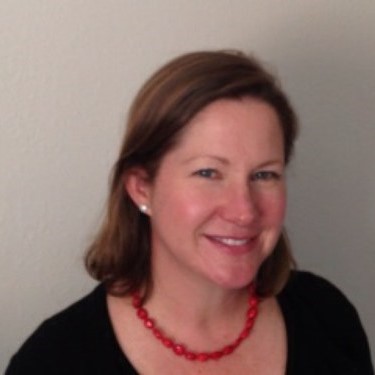
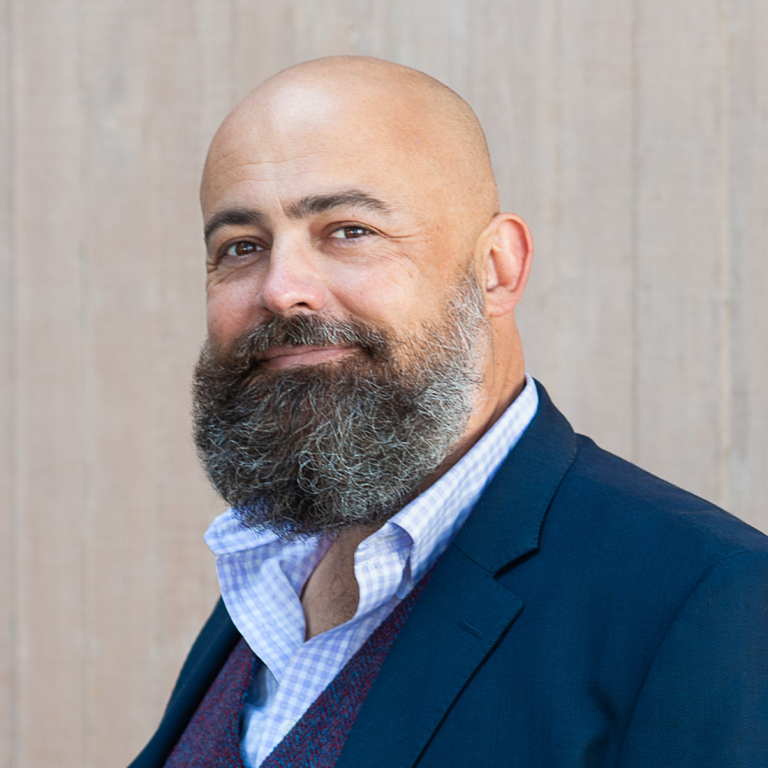
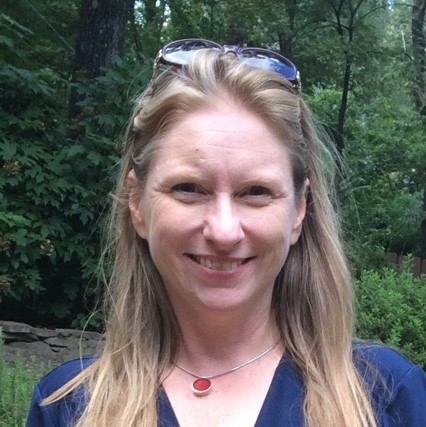
Sunday, June 5, 2022 - 1:00 p.m. to 5:00 p.m. UTC/GMT -7 (Pacific Daylight Time)
Research relevant to clinical psychology typically relies on large-N, comparative, probabilistic studies (including RCTs). This experimental model offers benefits: Divergent therapies can be compared based on outcome variables; conclusions can be drawn about causality; and investigators have many ways to account for confounds. But large-N experiments have also been widely criticized: Samples can be overly homogeneous; career contingencies in academia discourage systematic replication; and nomothetic hypotheses can foster confirmation biases. Moreover, large-N experiments typically require labs and extensive resources, which all but shut working clinicians out of the research process. The behavioral tradition, though, has long made use of single-case experimental design (SCED). Through alternating baseline, implementation, and reversal phases, SCED researchers can draw sound conclusions about behavioral control while retaining contextual richness. This workshop is a broad overview of SCED methodology.
Participants will learn about time-series experimental design, data collection and analysis strategies to enhance applied practices, reporting approaches, and the limitations of SCED. A vision for expanding single-case research done by working clinicians and aggregated using emerging meta-analytic approaches will be built.
About Kate Kellum, Ph.D., BCBA-D:
Kate currently serves as an Instructional Associate Professor & Assistant Chair of Psychology at the University of Mississippi. She holds a masters degree in education from Purdue University and a doctoral degree in psychology from the University of Nevada Reno. Kate has considerable experience in assessment of educational and research activities, time-series research design, and performance measurement/improvement. She has been consulting with schools, universities and non-profits in the USA and UK for over 20 years to improve their ability to implement contextual changes and measure learning/organizational outcomes.
About Troy DuFrene, M.A.:
Troy DuFrene is a psychotherapist and author. He is coauthor of multiple books, including Coping with OCD, Mindfulness for Two, and Things Might Go Terribly, Horribly Wrong. He offers individual, couple, and family psychotherapy and clinical assessment through the San Francisco Center for Compassion-Focused Therapies. He also provides services to students through Student Psychological Services at Santa Rosa Junior College. He lives and works in Alameda, CA, in the San Francisco Bay Area.
About Heather Garnos, M.S.:
Heather Garnos, MS, PN1, is an OBM practitioner and behavioral nutrition and fitness coach in private practice. She received her bachelor's degree in English Literature from UC Berkeley and her master's degree in Applied Behavior Analysis from Western Connecticut State University. In her role as a book editor and publishing executive, she has been dedicated to disseminating ACT and other evidence-based interventions to the general public for more than twenty years.
Learning Objectives:
Following this workshop participants will be able to:
- Describe common structures of single-case experimental design
- Describe common features of SCED data collection strategies
- Compare common features of SCED and group design data analysis strategies
- Compare the appropriateness of various designs for particular applied questions
- Compare the advantages and limitations of SCED with group designs (in applied settings)
- Discuss meta-analytic strategies for working with aggregated data collected through SCED
- Compare traditional SCED analysis with meta-analytic and bayesian strategies
- Plan for the collection of data in applied settings that uses SCED principles
- Plan for the sharing and dissemination of such data
- Plan for using meta-analytic strategies in applied settings
Target Audience: Beginner, Intermediate, Clinical, Applied (in non-clinical settings)
Components: Conceptual analysis, Literature review, Didactic presentation, Case presentation, Strategic planning
Package Includes: A general certificate of attendance
Reclaiming Our Humanity Amidst Injustice: A Contextual Behavioral Science Skills-Based Approach to Social Connection Across Cultural Differences
Reclaiming Our Humanity Amidst Injustice: A Contextual Behavioral Science Skills-Based Approach to Social Connection Across Cultural DifferencesReclaiming Our Humanity Amidst Injustice: A Contextual Behavioral Science Skills-Based Approach to Social Connection Across Cultural Differences
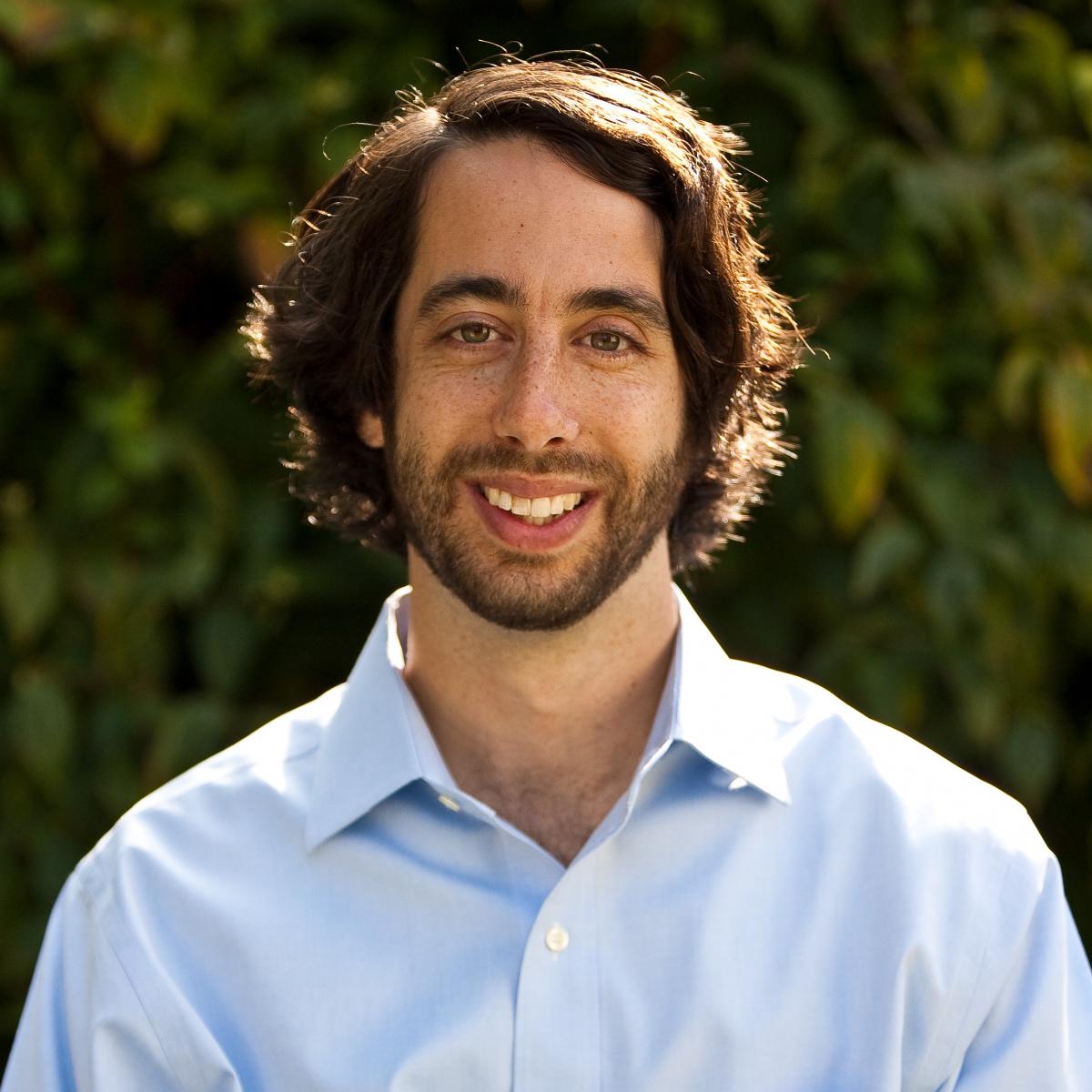
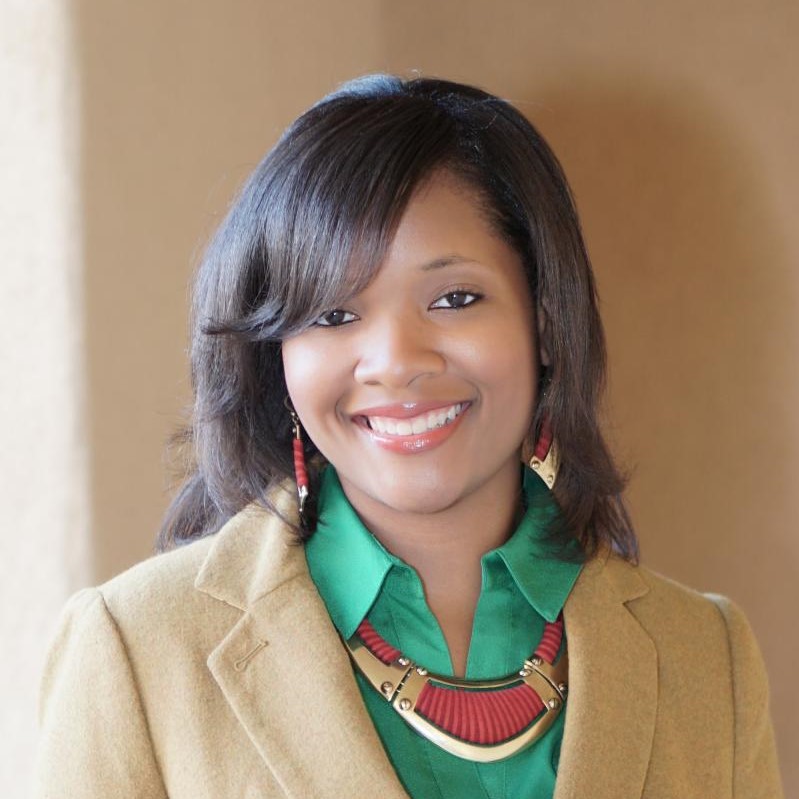
Wednesday, June 15, 2022 - 9:00 a.m. to 5:00 p.m.
Recent years have demonstrated in blunt form how racism, sexism, and other forces of oppression are still deeply rooted in our societies, with toxic and deadly impacts. We are alarmed and appalled by the sharp increase in explicit acts of hatred which have recently occurred across multiple nations, just as we are concerned about the less visible, longstanding manifestations of oppression that have existed for centuries. At the same time, we recognize developments in psychological science that suggest that bias and prejudice exist as normative psychological processes on both an implicit and explicit level. These biases operate within all human beings, including well-meaning individuals who disavow hatred and oppression and espouse deeply held pro-social values – and even within communities that aspire to be safe havens of peace and love, like ACBS.
We believe that contextual-behavioral science (CBS) harbors abundant and largely untapped potential for addressing these problems in a global context. This two-day workshop is a direct application of CBS principles to the psychological processes that function as obstacles to connection across cultural differences. These principles and processes will be engaged with recognition of the broader context of institutional and structural forms of oppression. We will adopt an intersectional framework that explores how interpersonal contexts where we encounter difference (across race, gender, sexual orientation and many other identities) can result in a range of outcomes from experiences of disconnection and invalidating microaggressions to meaningful and intimate exchanges and deep connectedness.
The workshop will be largely experiential, with exercises grounded in a contextual-behavioral understanding of behavior change and applicable to participants inclusive of all nationalities. The specific processes of ACT and the five rules of FAP will be applied in this uncharted territory of connecting across cultural difference. Acceptance, defusion, and self-focused exercises are designed to increase awareness of sources of anxiety and bias that influence our behavior, and small-group exercises are designed to facilitate sustainable, intentional behavior change in intercultural interactions. We aim to produce more than a transient “feel good” experience. Rather, we aim to help attendees walk the difficult walk of utilizing CBS principles in moments that matter, whether they are interactions at a work meeting, a dinner with extended family, or a clinical encounter. In recognition of the challenging nature of these encounters, self-compassion exercises will be infused to facilitate a sense of connectedness, self-care, and present-moment focus during difficult dialogues. The theoretical and empirical foundations of exercises will be discussed and the workshop will also focus on generalizing the experiential work into the daily-life contexts of attendees through modeling, role-play practice, and feedback. Each participant will be asked to identify committed actions they can take to benefit the ACBS community throughout the World Conference, in their clinical work, and within their home communities.
The presenters have been developing, presenting and refining the ideas and exercises that will inform this workshop for several years and across multiple contexts. Empirical support for the CBS-informed exercises that will be engaged in the workshop have been demonstrated by two recent randomized controlled trials. Participants who engaged in these interventions demonstrated improved (more empathic and less biased) behavior when in clinical encounters with patients of color, and heightened feelings of connectedness and understanding when in inter-racial interactions that generalized to other members of out-groups not in attendance. In this workshop we will broaden an application of these mechanisms beyond race to multiple cultural identities.
Please note: the presenters are equal collaborators. They are listed alphabetically.
About Robyn Gobin, Ph.D.:
Dr. Robyn L. Gobin, Ph.D. is a licensed clinical psychologist with expertise in interpersonal trauma, the cultural context of trauma recovery, and evidence-based treatments for PTSD. She directs the Transforming Trauma and Mental Health Research Laboratory in the Department of Kinesiology and Community Health at the University of Illinois, where she is a tenure-track Assistant Professor. Her work has been recognized by the top professional associations in her field: she was the recipient of a Citizen Psychologist Presidential Citation from the APA and the Carolyn Payton Early Career Award from the Society for the Psychology of Black Women (Division 35).
About Daniel Rosen, Ph.D.:
Dr. Daniel C. Rosen is chair and professor in the Department of Counseling and Health Psychology at Bastyr University, and was the founding co-director of the Daniel K. Church Center for Social Justice and Diversity. Dr. Rosen completed his postdoctoral fellowship in the behavioral medicine program at Cambridge Health Alliance/Harvard Medical School, and his scholarship focuses on multicultural psychology and counseling, centering on issues of social and racial justice in mental health.
Learning Objectives:
Following this workshop participants will be able to:
- Describe a contextual-behavioral model of microaggressions and other behavioral obstacles that produce cultural health disparities in treatment processes and outcomes.
- Demonstrate acceptance skills in the presence of anxiety while interacting across cultural differences.
- Apply defusion skills in the presence of cultural stereotypes while interacting across cultural differences.
- Demonstrate engaging in committed, value-guided actions in the service of creating meaningful clinical relationships during challenging interpersonal cultural moments.
- Demonstrate in real-play experiential exercises with other participants how to repair connections in the wake of unintended microaggressions and other such punishing interactions.
- Explain how to increase your ability to respond flexibly, guided by values rather than defensiveness, when engaged in dialogue about privilege, differences or experiences of microaggressions.
- Demonstrate reinforcing the behavioral improvements of clients, friends, and family members when their efforts still leave you feeling punished, microaggressed, or guarded.
- Apply experiential work to specific clinical cases in your practice, or other relevant life settings, through role-plays and feedback.
- List specific behavioral risks you will take during the ACBS World Conference and at home in service of chosen values and utilizing the skills gained during the workshop.
- List sources of collective action within the ACBS community to advance culturally responsive practice and the promotion of social justice.
Target Audience: Beginner, Intermediate, Advanced, Clinical, Research
Components: Conceptual analysis, Literature review, Original data, Experiential exercises, Didactic presentation, Case presentation, Role play
Package Includes: A general certificate of attendance, lunch, and twice daily coffee/tea break on site.
The Heart of Acceptance and Commitment Therapy: Developing a Flexible, Process-based, and Client-Centered Practice
The Heart of Acceptance and Commitment Therapy: Developing a Flexible, Process-based, and Client-Centered PracticeThe Heart of Acceptance and Commitment Therapy: Developing a Flexible, Process-based, and Client-Centered Practice
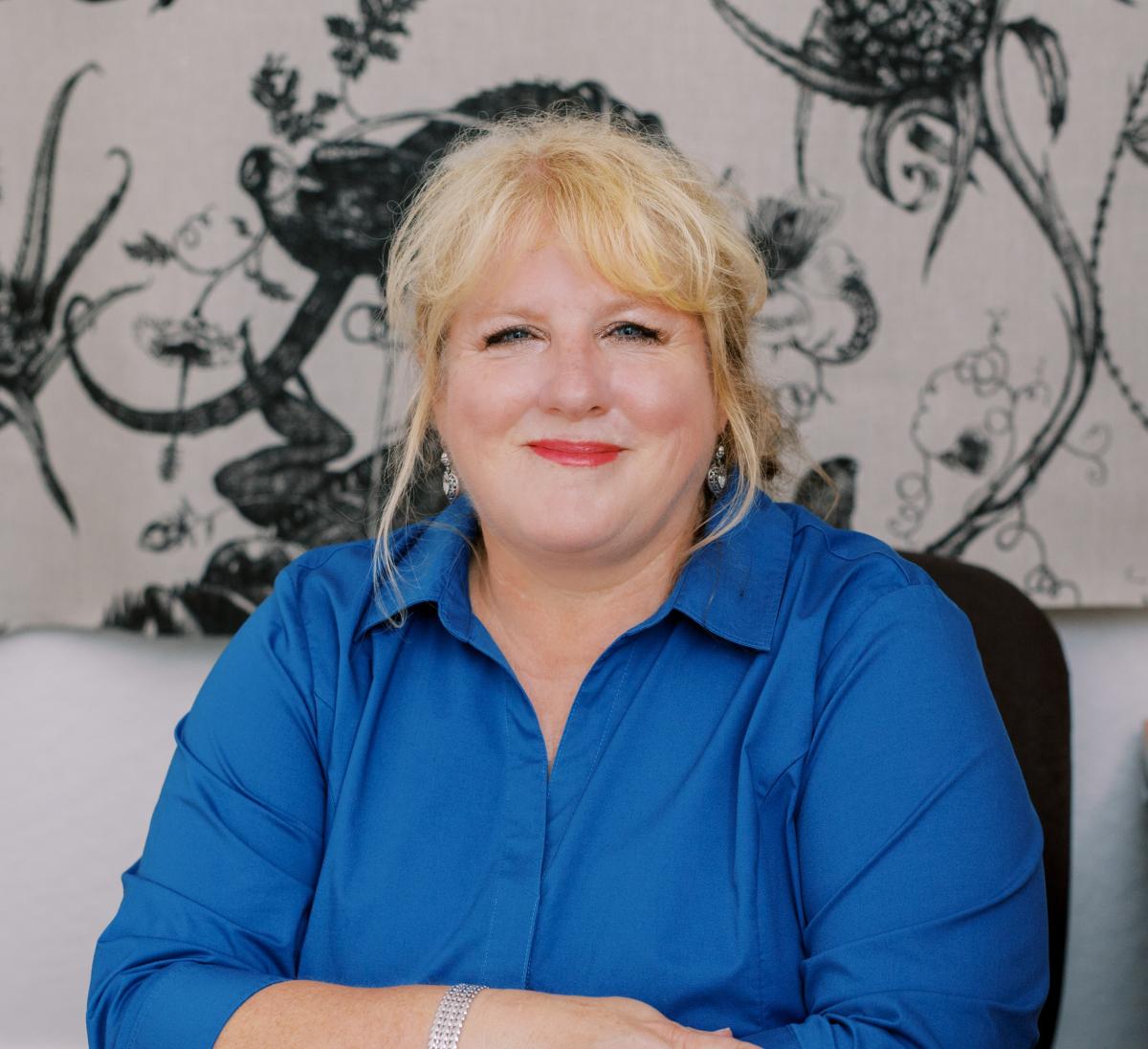
Wednesday, June 15, 2022 - 9:00 a.m. to 5:00 p.m.
Life contains suffering. But acknowledging this truth is only the first step on the path to transcending it. It is in this transcendence that vital and meaningful lives are born. As ACT therapists, it is hoped that we can assist our clients in this process. Helping them to acknowledge and hold pain, show up for joy, while continuing to take steps, each day, each hour, each moment, that are connected to personal meaning. This is done, as is often said in ACT, with head, hands, and heart. So verbal knowledge, an intellectual understanding of the intervention is needed. The work of the “hands” is about behavior; physical movement and taking action are fundamental. ACT’s heart however appears to be more elusive. Done with intention and presence, ACT links us to the very qualities of what it means to be alive and whole, to be a conscious and experiencing being. ACT may be learned and understood at many levels but may remain challenging to implement in a flexible, consistent, process-based, and effective fashion. Multiple levels of process are present in any therapy, including those processes beyond ACT’s 6 core. Moving beyond simple technique and into a fluid ACT intervention requires attending to intrapersonal, interpersonal, and overarching and ongoing processes in the context of the psychotherapeutic relationship. Engaging in an ongoing functional analysis feeds these processes and informs the case conceptualization This workshop will explore the multiple levels of process found in ACT from a more in-depth, experiential, or heartfelt place. Didactic presentation, role-play, and experiential exercises will be used to convey the material.
About Robyn D. Walser, Ph.D.:
Robyn D. Walser, Ph.D. is Director of TL Psychological and Consultation Services, Assistant Professor at the University of California, Berkeley, and works at the National Center for PTSD. As a licensed psychologist, she maintains an international training, consulting and therapy practice. Dr. Walser is an expert in Acceptance and Commitment Therapy (ACT) and has co-authored 6 books on ACT, including a book on learning ACT. She has most recently written a book entitled: The Heart of ACT. Dr. Walser has expertise in traumatic stress, depression and substance abuse and has authored a number of articles, chapters, and books on these topics. She has been doing ACT workshops since 1997, training in multiple formats and for various client problems.
Learning Objectives:
Following this workshop participants will be able to:
- Describe what is meant by the therapeutic presence from an ACT perspective.
- Explain how ACT processes influence the therapeutic relationship.
- Explain what is meant by ACT processes from the perspective of personal internal experience and how it is relevant to therapy.
- Apply the arc of therapy to in-session case conceptualization.
- Explain how the role of the ACT processes and their flexible use influences the interpersonal dynamics or alliance.
- Explain the importance of undefended choice as held by the ACT model.
- Describe barriers to fluid implementation of ACT and how to work through these barriers in an ACT consistent fashion.
- List the benefits of mindfulness as a practice as well as an ongoing process during the session, including how it can be used to cultivate compassion.
- Describe the role of existentialism in considering values clarification and engagement.
- Describe how core ACT processes and aspects of their function should be addressed and explored in session without the use of typical exercises.
Target Audience: Intermediate, Advanced, Clinical
Components: Conceptual analysis, Experiential exercises, Didactic presentation, Case presentation, Role play
Package Includes: A general certificate of attendance, lunch, and twice daily coffee/tea break on site.
Understanding and Applying RFT: Complex language as the foundation of our work and our lives as contextual behavior scientists
Understanding and Applying RFT: Complex language as the foundation of our work and our lives as contextual behavior scientistsUnderstanding and Applying RFT: Complex language as the foundation of our work and our lives as contextual behavior scientists
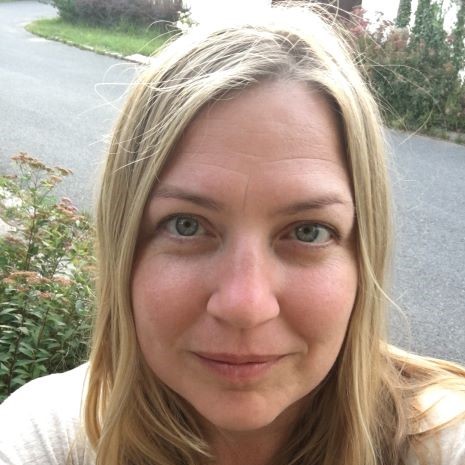
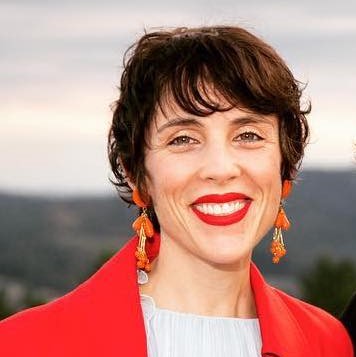
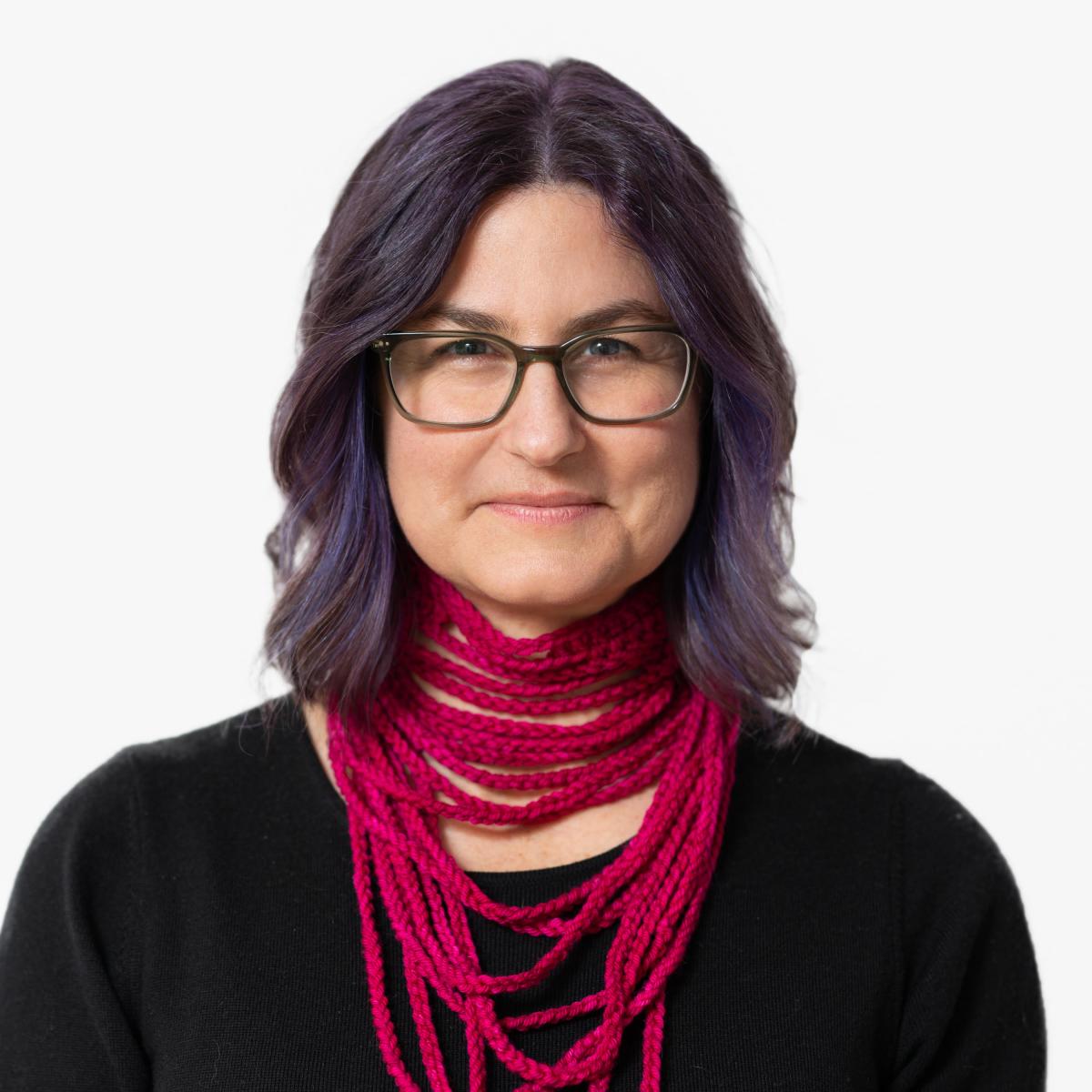
Wednesday, June 15, 2022 - 9:00 a.m. to 5:00 p.m.
Language changes everything. From infancy through adulthood, language influences and dominates our sense of self, our choices, our opportunities, our relationships, our communities, our societies - the cultures that shape us all. Language is an inescapable part of what makes us human. A comprehensive understanding of complex language and the increasingly complex web of interlocking contingencies that influence every one of us, is therefore critical to our immediate effectiveness in our work, as well as how we exist in the world as professionals and the influence we have as a profession. Understanding and using complex language processes is integral to building the bridges that allow us to work effectively with others and impact the world. In short, words matter.
Behavior analysis is a compassionate and relational science centered around fostering choice, freedom, social justice, and contingencies of joy. We view the practice of behavior analysis as requiring psychological flexibility on the part of practitioners, and we view increasing psychological flexibility and prosociality as a primary socially valid outcome for our interventions. Understanding how to promote and use our own complex languaging repertoires, including curiosity, empathy, compassion and humility, are necessary for us to effect meaningful change when cooperatively working with clients. These same repertoires are critical for working towards social and environmental justice and taking action in our communities. Language creates context, language changes context. Language creates and transforms the context for action.
As behavior analytic practitioners (including BCBAs, therapists, psychologists, social workers, educators and indeed, anyone working from a CBS standpoint) working with others to effect change, understanding RFT allows us to approach complex human behavior, relations and problems (at the individual, group, systems and cultural level) with precision and rigor. Towards this end, Drs. Ming, Gould and Fiebig present the essential principles of RFT, including RFT conceptualizations of the development of generative language, the self, and rule governed behavior, in addition to relational framing in the context of groups, including supervision, mentorship, effective messaging, and prosociality within and between organizational, social and cultural systems. We include an emphasis throughout on those repertoires necessary to create cooperative contexts for change, with prosocial interactions and systemic contingencies that support sustainability, diversity, inclusion and equity. We will consistently guide participants from theory to immediate application, with practical tools presented throughout.
This workshop will be presented in four parts. Throughout, participants will be introduced to the philosophical and theoretical underpinnings of RFT, and guided through application using real-world examples, experiential exercises, modeling and feedback, small-group activities, and group discussions. Part 1 presents the theoretical basics of RFT, including how relational frames can be viewed as the building blocks of language and cognition, and how complex verbal repertoires and a sense of self develop. Part 2 explores how complex verbal repertoires affect behavior at the level of the individual, introducing the role of rule-governed behavior and private events. Part 3 examines how to incorporate RFT into a deeper understanding of the interlocking contingencies between individuals and within groups, with an emphasis on the repertoires needed to create cooperative contexts for change. Finally, in Part 4, we zoom out to examine relational framing in the context of prosociality within and between organizational, social and cultural systems, with particular emphasis on issues of sustainability, diversity, equity, and inclusion. Participants will leave with a deeper understanding of RFT (and behavior analysis more broadly) and plan of action for incorporating what they have learned immediately into their work and lives as behavior analysts.
About Siri Ming, Ph.D., BCBA-D:
Siri Ming, PhD, BCBA-D, is a scientist-practitioner with over twenty-five years of experience in the field. She is committed to the compassionate practice of behavior analysis to help people live meaningful, values-directed lives. Her research and clinical focus is on applications of relational frame theory (RFT) to early intervention programs for children with autism, integrating Skinnerian verbal behavior with RFT. She has authored numerous peer-reviewed research and theoretical articles on applications of RFT, as well as a practical handbook series on using RFT in early intervention programs. She teaches and acts as subject matter expert for graduate level classes in verbal behavior for the Chicago School of Professional Psychology, and has been an associate editor for The Analysis of Verbal Behavior journal. Her work is grounded in values of rigor, generosity, and kindness.
About Evelyn Gould, Ph.D., BCBA-D:
Evelyn Gould is a Clinical Behavior Analyst and Licensed Psychologist from N.Ireland, currently based in Los Angeles, CA. Evelyn is a trainer and supervisor at The New England Center for OCD and Anxiety, and is an Assistant Clinical Professor at Keck School of Medicine at USC. She is also a Research Associate in Psychiatry at Harvard Medical School. Evelyn provides clinical services to children, adolescents, young adults, and families, in addition to engaging in applied research and scholarship. She has published articles and book chapters on working with caregivers, clinical assessment and treatment design, training and supervision, ACT (Acceptance and Commitment Therapy) and practitioner well-being. She is passionate about the dissemination of contextual behavioral treatment approaches and addressing issues of diversity, equity and inclusion in Behavior Analysis. Evelyn is actively involved in a variety of Special Interest Groups and Task Forces within the ABAI and ACBS communities, and is an Associate Editor of the Journal of Contextual Behavioral Science.
About Julia Fiebig, Ph.D., BCBA-D:
Julia Fiebig, Ph.D., BCBA-D, is assistant teaching professor at Ball State University in the applied behavior analysis program, and a partner in Applied Global Initiatives Consulting Group. She is from Germany and resides in the San Francisco Bay Area. A practicing behavior analyst for over twenty years, she has a range of experience working with clinical, educational, and other non-profit and private organizations. She has served on task forces for ABAI and ACBS and currently serves on the board of special interest groups and ABAI’s Practice Board. A primary emphasis of her work is helping leaders and organizations cultivate values-informed, consensus-building, prosocial practices and sustainable systems. She is dedicated to work on issues of environmental justice, and contributing to wider application and dissemination of a compassionate behavior science.
Learning Objectives:
Following this workshop participants will be able to:
- Describe language and cognition from the perspective of functional contextualism as behavioral repertoires, including the defining properties of relational framing as a generalized operant repertoire.
- Describe the development of relational framing as a generalized operant repertoire across multiple patterns of relating, characterized by multiple dimensions and levels of developmental complexity.
- Describe the RFT concept of the self, and how a repertoire of “self-ing” develops.
- Define psychological flexibility from a behavior analytic perspective, as a complex composite relational framing repertoire involving behavioral variability, deictic and hierarchical framing, and valuing.
- Identify different types of rule-following (pliance, tracking, augmenting) in everyday life and clinical and supervisory practice, and identify the role of rule-governed behavior in the development and maintenance of problematic patterns of behavior.
- Define cooperation from a behavior analytic perspective as a complex composite relational framing repertoire involving curiosity, empathy, compassion and humility.
- Describe the critical role of cooperative speaker and listener behavior in creating a prosocial, socially valid context for behavior change when working with individuals, groups, or within systems.
- Explain how language (i.e., relational framing) influences willingness to engage in behaviors that promote sustainability more generally, as well as environmentally relevant behaviors with respect to climate change action specifically.
- Identify ways that language (i.e., relational framing) creates and maintains systems of oppression and privilege, and influences engagement in behaviors (at the individual and group level) that promote diversity, inclusivity and equity.
- Identify three behavior change goals relevant to your own practice and community, and take steps towards achieving them.
Target Audience: Intermediate, Advanced, Clinical, Applied (in non-clinical settings)
Components: Conceptual analysis, Literature review, Experiential exercises, Didactic presentation
Package Includes: A general certificate of attendance, lunch, and twice daily coffee/tea break on site.
Airport Transfer from SFO or Oakland
Airport Transfer from SFO or OaklandArriving to the Conference
Local BART (Bay Area Rapid Transit) airport train to downtown
Highly recommended! Details for riding below.
- SFO to Powell St. BART Station ($9.65 and 30 minutes)
- OAK to Powell St. BART Station ($11 and 35 minutes)
General BART website explaining travel from SFO or OAK to downtown San Francisco.
Below are very specific directions for traveling on BART from SFO to the San Francisco Hilton Union Square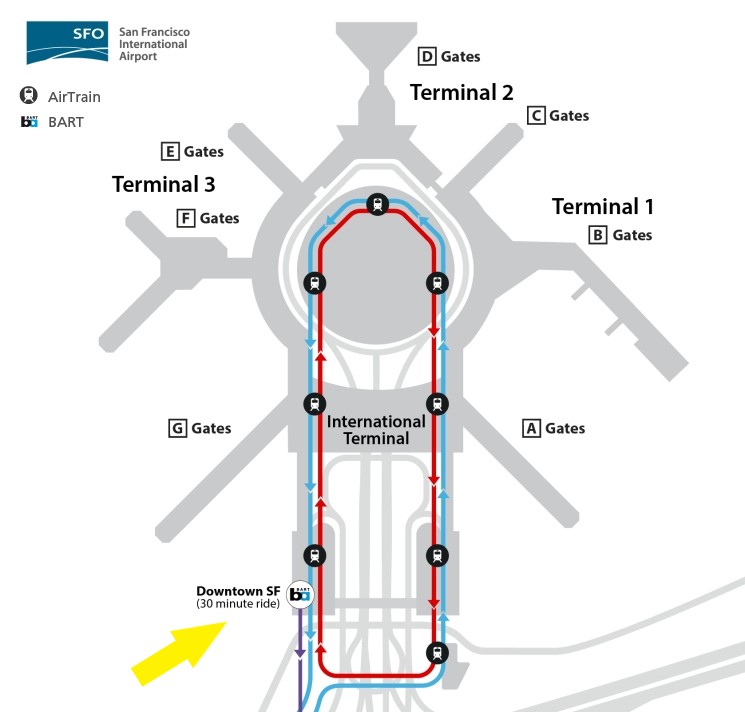
1. Follow signs toward baggage claim.
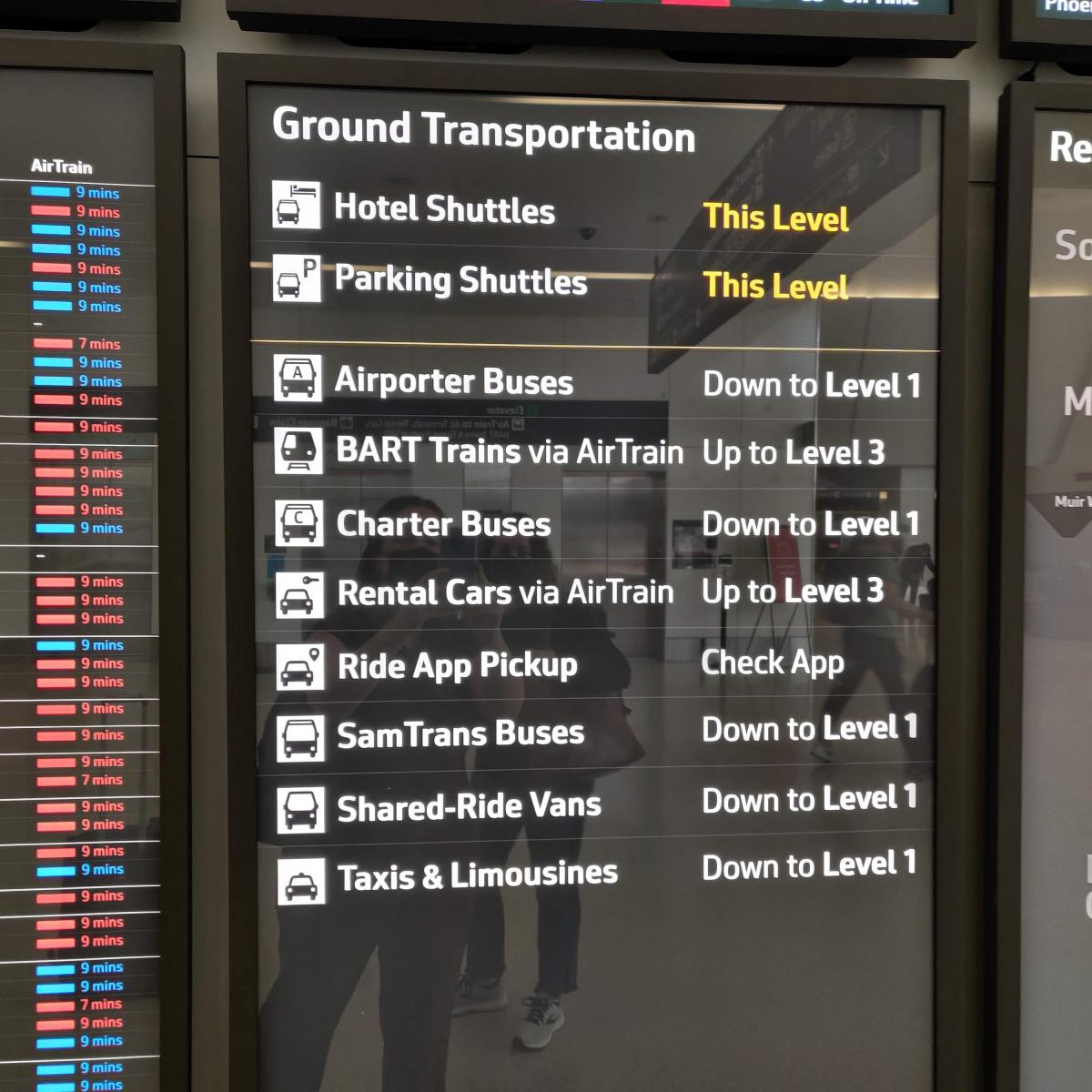
2. Near the front of the airport look for signs mentioning BART or AirTrain. You will likely be guided to an elevator.
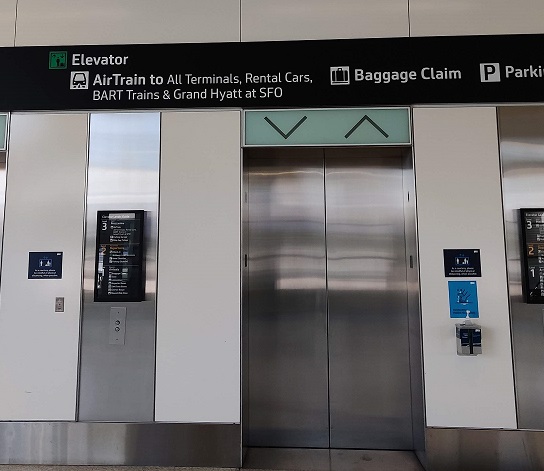
3. Take the elevator to level 3. You may then be in a walkway above a street. Continue up the escalator to reach the AirTrain.
4. Depending on your terminal, you will take one of the AirTrains to the "Garage G/BART" stop. TV style signs outside of the free (complimentary) AirTrain will tell you which way the AirTrain is going.
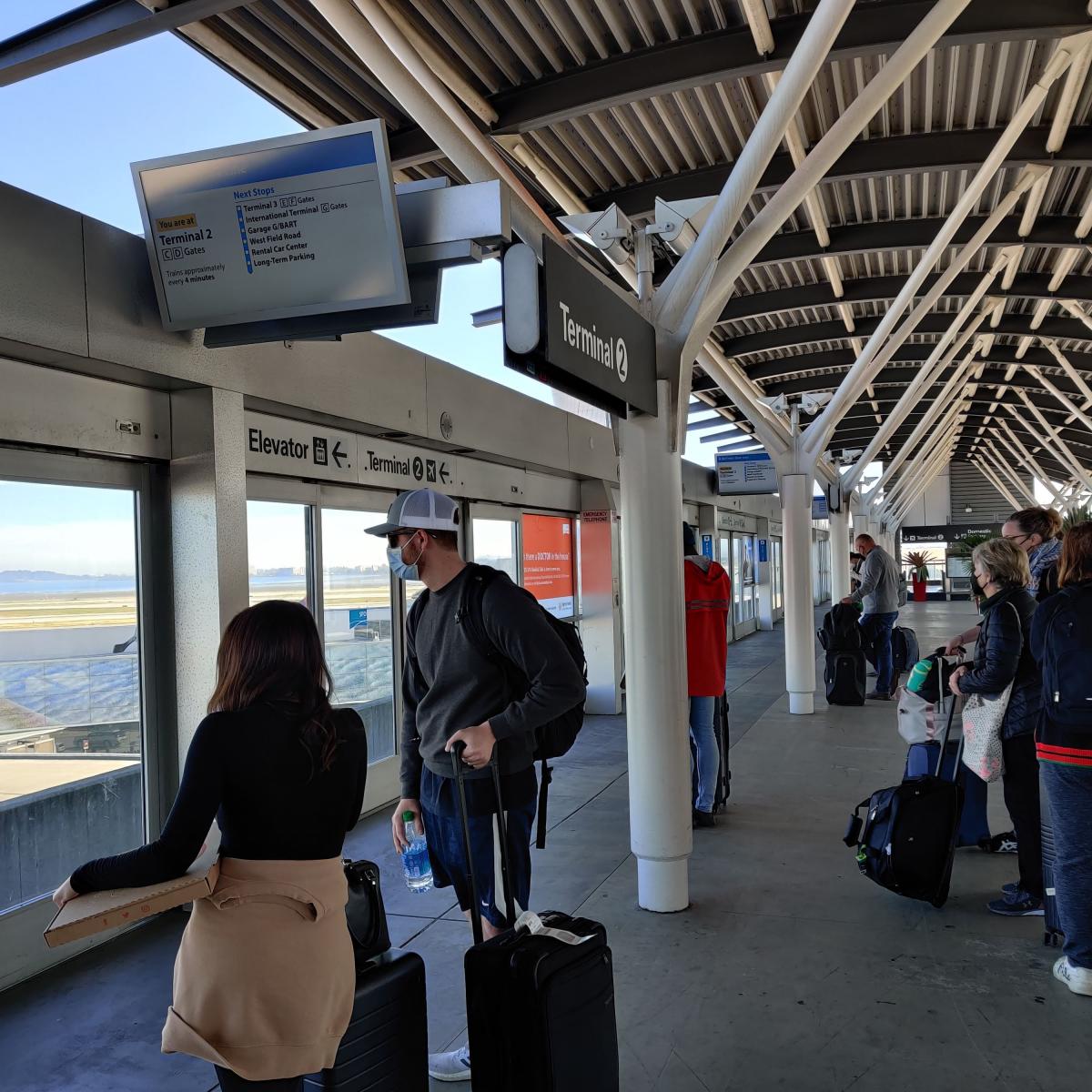
If you fly into the International Terminal, turn right when leaving customs, and take the escalator up to the departures level. Walk straight ahead and turn left at the art exhibit and you’ll see the station entrance.
5. Exit AirTrain at the "Garage G/BART" stop.

6. Purchase Clipper Transit card. Every rider must have their own card. The cost of the card is $3. It is unavoidable.
While it seems counterintuitive, you begin by swiping your credit card. Then you indicate the card type. Then you'll select to purchase a card for $3, if you don't already have one. Then you will add and subtract money based on how much you'd like to put on your card.
As of March 2022, from SFO to the Powell St. Station, which is the closest to the San Francisco Hilton Union Square, the fare is $9.65 (plus $3 for the card). If you'd like to purchase round trip, that would be $19.30 (plus $3 for the card). You can confirm rates by looking at the map (with prices listed to your destination) on the fare card machine.
The BART train DOESN'T operate 24 hours per day. Please check on our proposed travel times before pre-paying for return fare (there is no discount for purchasing a round-trip, just the convenience of not needing to reload your transit card).
Confirm your purchase amount. The machine will then give you your Clipper Transit card and a paper receipt.
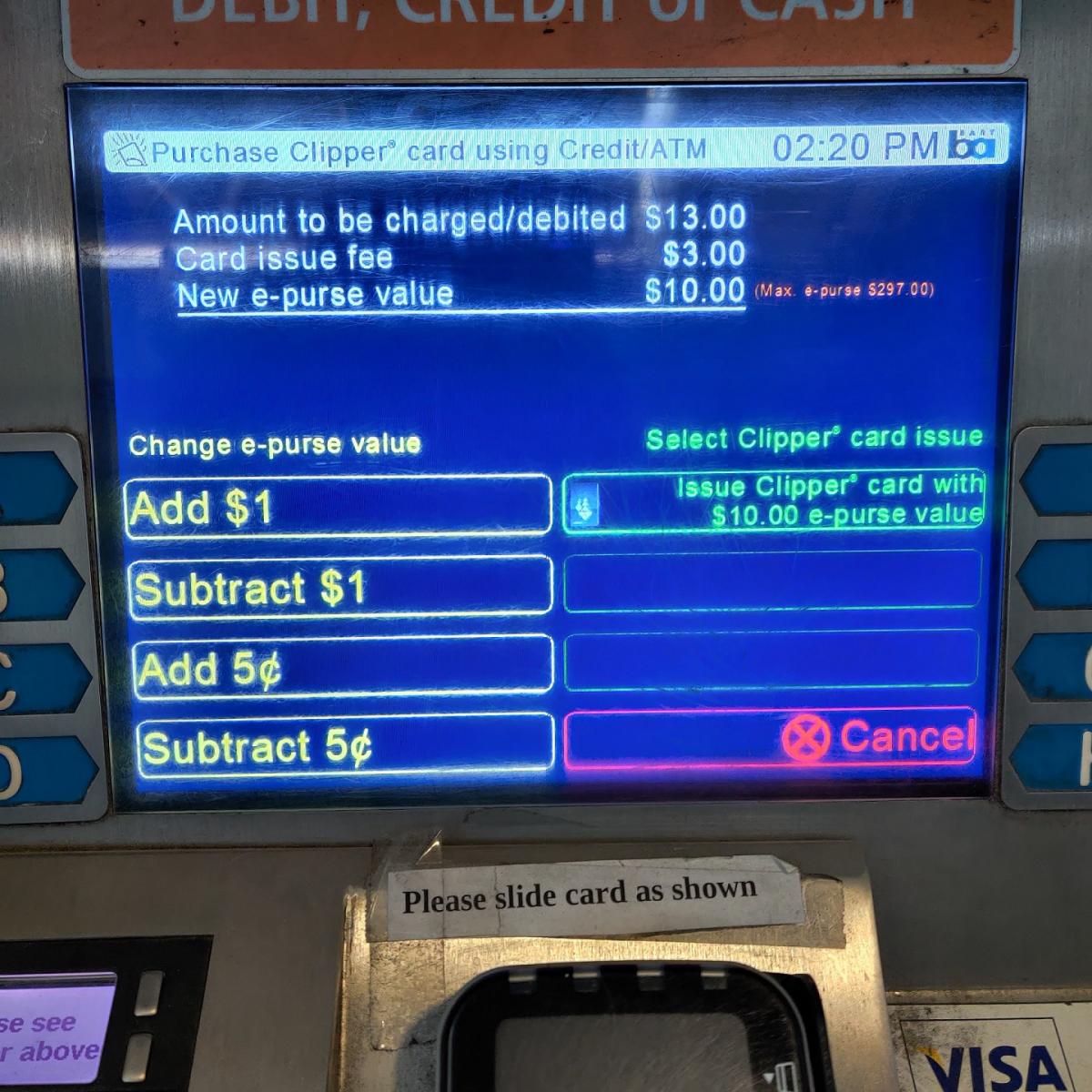
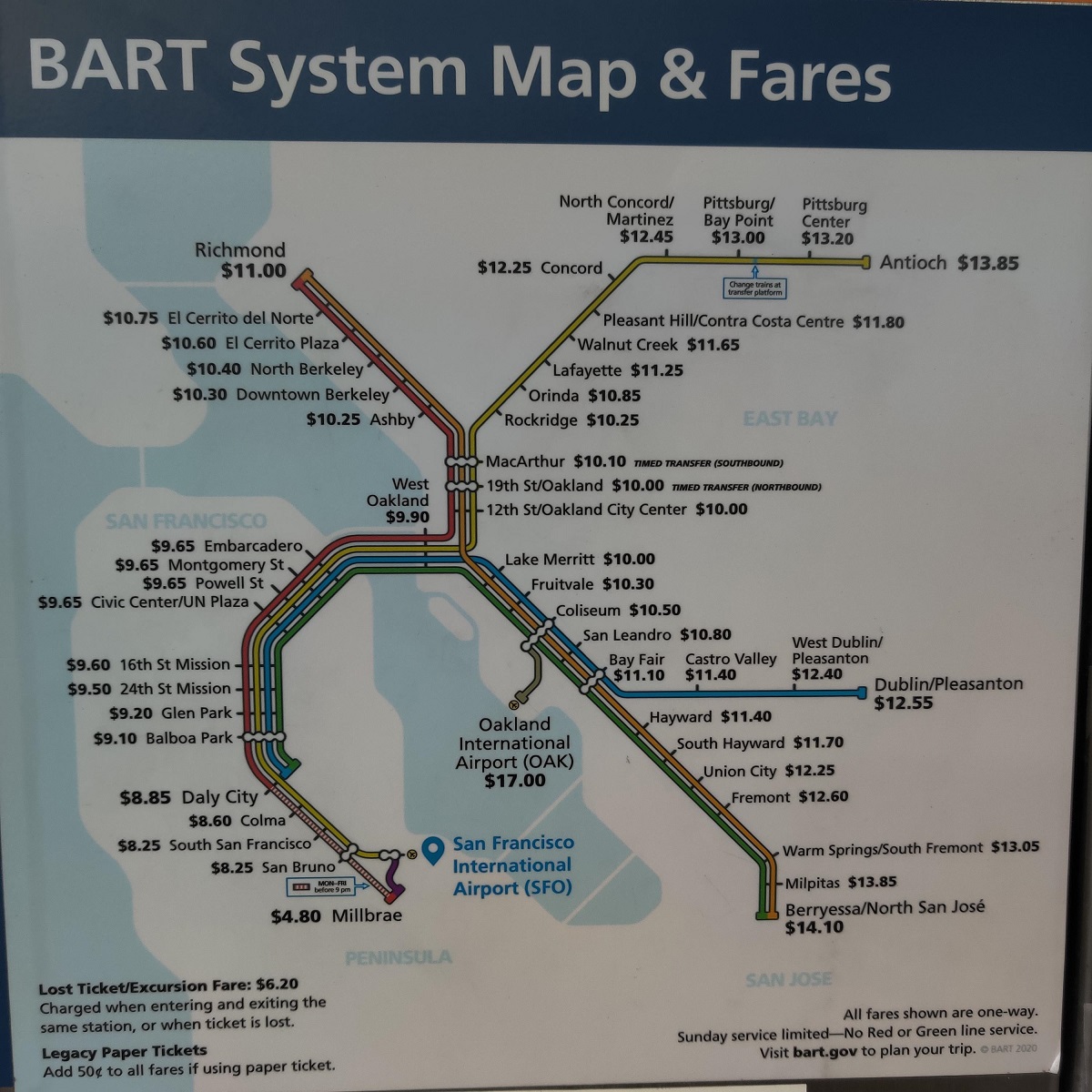
7. Go through the gates to get to your train. You touch your card to the round pad at the top of the gate. You do not insert it into a slot. Take an escalator downstairs. Any train leaving from this station will get you to the Powell St. Station in downtown San Francisco. The ride is approximately 30 minutes. You can track your progress on the map in the train car, and by checking the station signs at each the station.
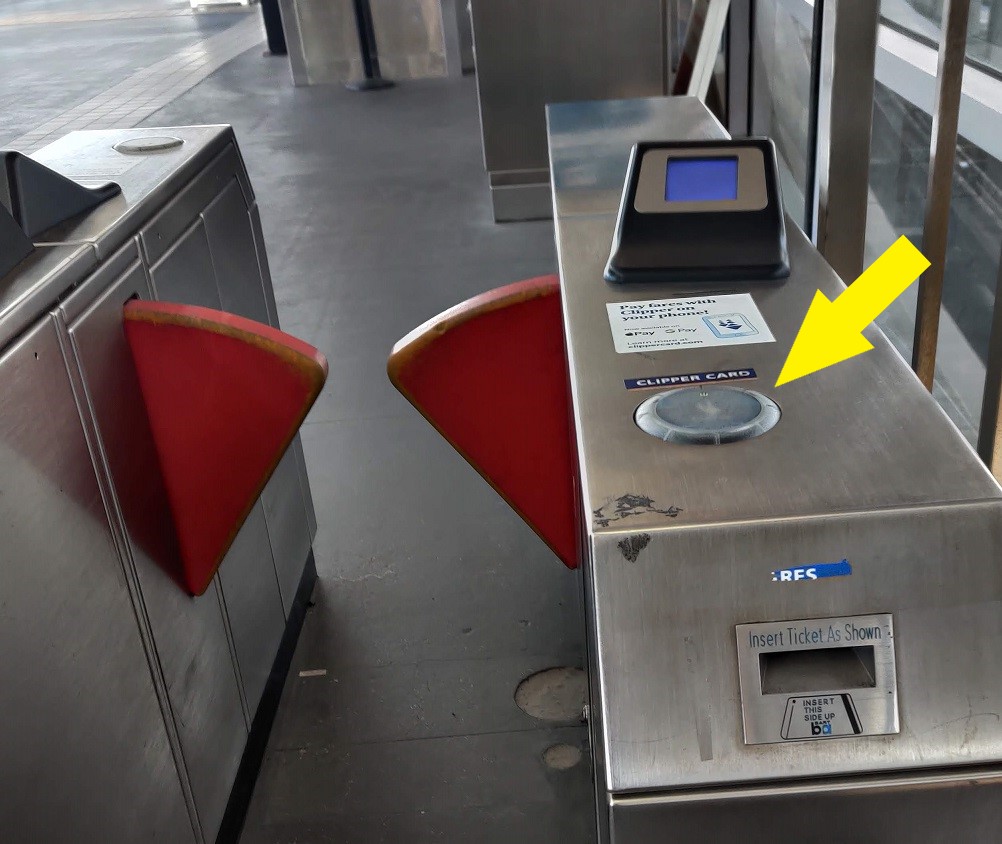
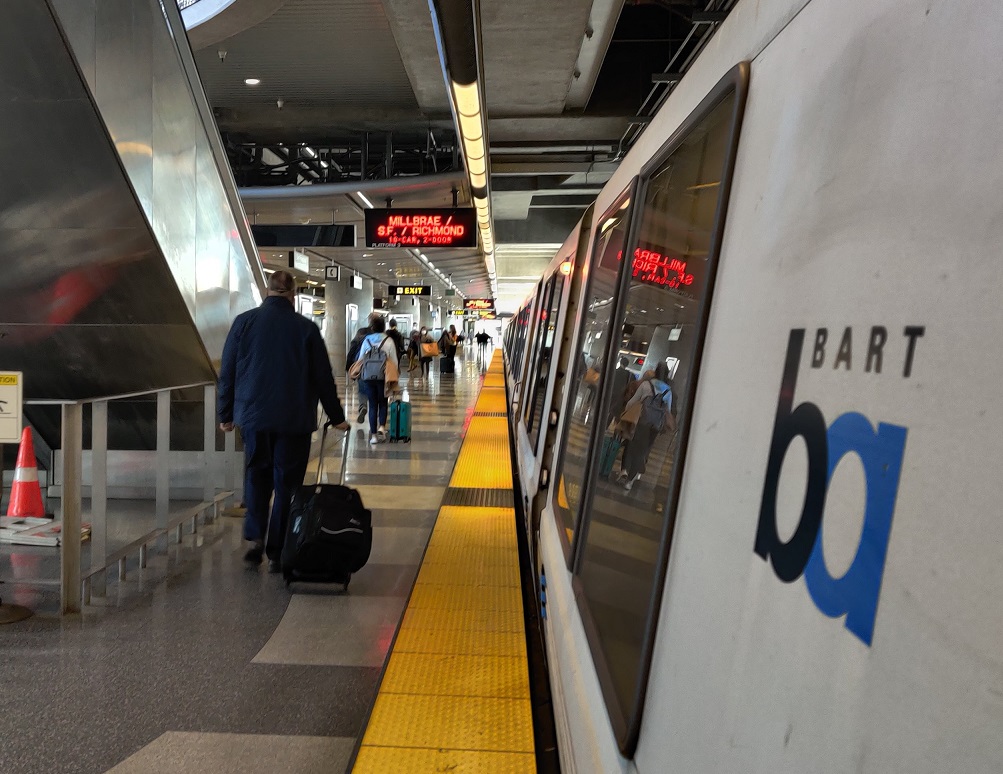
8. When you reach the Powell St. Station, you exit by going through a gate and touching your card to the pad again. If you don't have enough money on your card, there is a transit machine in the station where you can add more money. You will walk toward the signs that say "Powell St.". You will go up a few steps, and then up an escalator on your right.
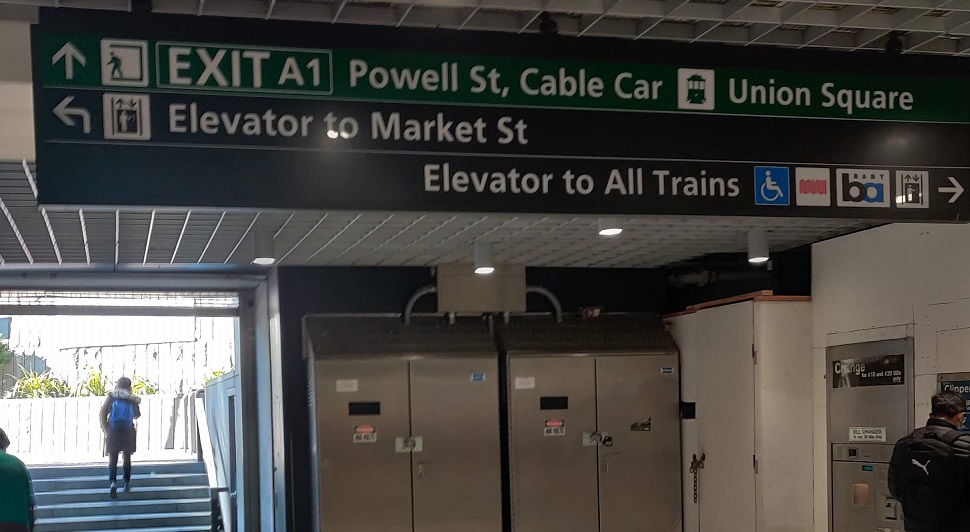
9. At the top of the escalator the road immediately in front of you and to your left is Powell St. Walk to the left. You'll know you're on Powell if there are trolly cars and tracks in the road. Go 2 blocks until you reach O'Farrell St. Turn left and walk 2 full blocks (crossing Mason), to reach the main entrance of the Hilton (at 333 O'Farrell St., San Francisco, CA 94102), just before reaching Taylor St.
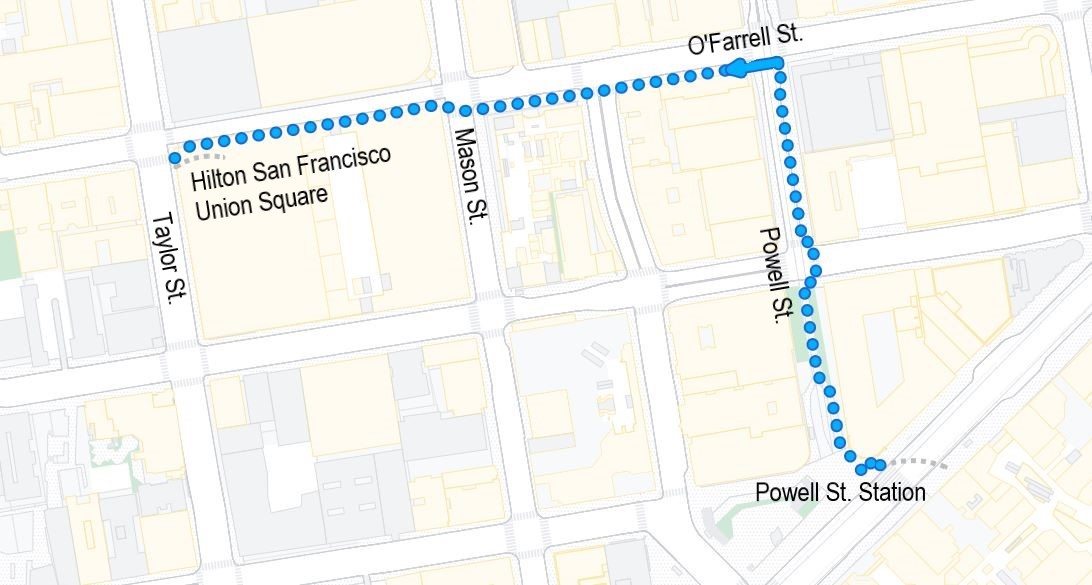
Departing from the Conference
Taxi to SFO (San Francisco International):
- Approximately $40-50
- Travel time: 20 minutes without traffic, 30-45 minutes during busy traffic
- Hotel Concierge or Front Desk staff can call a taxi for you, usually arriving in 5-10 minutes if they are not already waiting in front of the hotel.
- Call a taxi on your own at: 1 (415) 333-3333
Uber or Lyft to SFO:
Approximately $35-$65 depending on time of day
Taxi to OAK (Oakland):
- Approximately $50-70
- Travel time: 30 minutes without traffic, 70 minutes during busy traffic
- Hotel Concierge or Front Desk staff can call a taxi for you, usually arriving in 5-10 minutes if they are not already waiting in front of the hotel.
- Call a taxi on your own at: 1 (415) 333-3333
CE Credits
CE Credits
Type of Credit Available: 
- CE credit for psychologists
CE credit is available for psychologists for live and select recorded sessions (not all recorded sessions eligible, look for "Psychologists - Recorded" tag on session pages for confirmation, as well as the existence of a post-test, which is required for earning CEs for recorded viewing).
To earn credit for watching RECORDED sessions, you must watch the complete session and successfully pass a quiz with a 75% or higher score. You must complete and pass the required post-test quizzes by September 22, at the latest.
CE certificates with the total of your live credits will be emailed to you by August 5. CE certificates with the total of your recorded session credits will be emailed to you by October 15.
The Association for Contextual Behavioral Science is approved by the American Psychological Association to sponsor continuing education for psychologists. The Association for Contextual Behavioral Science maintains responsibility for this program and its content.
- CE credit for BCBAs is available for select events

- CE credit for social workers from the National Association of Social Workers (NASW)
- CE credit for counselors from the National Board for Certified Counselors (NBCC)
Certificate with Number of Hours Attended
As an alternative to a CE certificate, some credentialing agencies (please check with yours) may accept a certificate with the number of hours attended. This requires that an individual verifies their attendance by signing in and out of each session that they attend during the event. The certificate will only include the hours of the sessions you attend LIVE during the conference (any recordings you watch will NOT be included). The cost for this type of certificate is $12 USD.
Information about the CE Process
CEs or certificates with the number of hours attended are available for a one-time fee for the entire event.
CE rules require that we only issue credits to those who attend the entire session. Those arriving more than 15 minutes late or leaving before the entire session is completed will not receive CE credits.
Evaluations will be available, but are not required for people earning CEs for psychologists, counselors, or BCBAs. NASW CE earners, completion of a short evaluation AND verification of session attendance is required before CE Credits can be awarded (for each session). CE evals must be completed by July 5.
For those attending in-person, in San Francisco June 14-19:
Please remember to scan in and out at the beginning and end of each session using our scanner system. If there is a problem and the scanners are not working, please make sure to sign in and out on the yellow attendance sheet provided. We cannot give CE credit if you do not scan/sign in and out.
Please DO NOT SCAN in and out for coffee/tea breaks. CE credits are NOT available for IGNITE sessions, Chapter/SIG/Committee meetings, or other lunch time sessions.
Fees:
A $65 USD fee will be required to earn CEs. This fee is non-refundable (unless you cancel your registration in its entirety before the cancellation deadline). Attendance verification (sign in/out) and evaluations also may be required.
The cost for a certificate indicating only the number of contact hours (not a CE certificate) is $12.
Refunds & Grievance Policies: Participants may direct any questions or complaints to ACBS Executive Director Emily Rodrigues, [email protected], or through the Contact Us link on this website.
- CEs are only available for events that qualify as workshops, symposia, invited lecture, panel discussion, or plenary sessions. Poster sessions, IGNITE sessions, sessions shorter than 1 hour, Chapter/SIG/Committee meetings, and some other specialty sessions do NOT qualify for Continuing Education credit.
- (Note: CE credits are only available for those registered as a professional. You may not earn CE credits with a student registration.)
CEs for Psychologists - Post-test links
CEs for Psychologists - Post-test linksFor those earning CEs for Psychologists - Recorded
Credit is available for sessions indicated (on the specific session page) for watching RECORDED sessions AND successful completion of post-test quizzes. To earn credit for watching RECORDED sessions, you must watch the complete session and successfully pass a quiz with a 75% or higher score. Your viewing of RECORDED sessions will be automatically verified via the conference platform.
You must complete and pass the required post-test quizzes by September 22, at the latest. CE certificates with the total of your recorded session credits will be emailed to you by October 15 from "[email protected]".
001. Polyvagal Theory: A Science of Safety
002. The role of Relational Frame Theory in Process-Based Therapy
010. Getting ACT Out of the Office and Into Life: Novel Applications of ACT and CBS
015. Cultivating an Open and Caring Mind: Integrating CFT and ACT in Clinical Practice
016. Level Up in ACT: Choose Your Own Fidelity Training
019. When is it Willingness? Assent in the Therapeutic Relationship
020. Empowering the flexibility of your clinical interventions using the ACT Matrix
Recorded CEs for Psychologists not available for this session.
023. Gender Bias and Relational Frame Theory: What's the relation?
032. Supercharging Supervision through Experiential Learning: the SHAPE framework in action
035. Psychedelics and Psychological Flexibility: ACBS as a Home for Psychedelic-Assisted Therapies
036. Putting the task force report into action
042. Healing Social Identity-Based Suffering Through Mindfulness
043. Finding Ourselves in One Another
044. The ACT Therapeutic Relationship: Creating Healthy Alliances and Repairing Ruptures
Recorded CEs for Psychologists not available for this session.
048. Bringing Compassion to the Critic: Working with Self-critical Behavior from an ACT Perspective
051. Using Contextual Behavioral Science to Explore Complex Cultural Identities
Recorded CEs for Psychologists not available for this session.
058. From Experience to Identity: Conceptualizing Gender from a CBS Lens
061. Life NOW: A FACT Telehealth Intervention for Stressed Healthcare Workers
074. Acceptance and Commitment Therapy for Addressing Health Disparities
Recorded CEs for Psychologists not available for this session.
085. Psychological Flexibility and Prosociality: Applying RFT at the heart of Behavior Analysis
086. Open Science and Reproducibility in Contextual Behavioral Science
093. ACT for Clients Who Scare Us
094. Snap Judgements, Assumptions, and Biases: A Scientist-Practitioner RFT Panel
Recorded CEs for Psychologists not available for this session.
100. Finding The Way: Using ACT for Crisis Intervention and Crisis Integration
103. The Perfectionistic Therapist: How Aiming for Perfect Holds Us Back and What We Can Do About It
104. The Compassionate-Mind Approach to Working with Hoarding Disorder
Recorded CEs for Psychologists not available for this session.
Recorded CEs for Psychologists not available for this session.
113. ACT for Social Anxiety: An Evidence-Based In-Person and Virtual Group Approach
Recorded CEs for Psychologists not available for this session.
120. A contextual behavioral perspective on eating, body image, and weight concerns
125. Report from the ACBS Strategic Pillar for Competency and Dissemination
130. The Art of Creating Transformational Metaphors in ACT
133. Accelerating Psychological Flexibility With Emotion Efficacy Therapy
134. Values, Vulnerability, and Consensual Non-Monogamy
139. An Introduction to Polyvagal-informed Acceptance and Commitment Therapy (PIACT)
140. The Differential Impact of Elements of Acceptance and Mindfulness on Mental and Physical Health
152. ACT for couples and family issues: digging pervasive behavior patterns
"I’ll do it later": Overcoming procrastination with ACT
ACT as a Social-Justice & Intersectionality-Oriented Treatment Modality for Diverse Clients
Managing loneliness with fictional surrogates
Putting ACT into ACTion: Using ACT to Promote Resilience in Black Communities
RFT is in our DNA - stuff clinicians want to know: Australia & New Zealand Chapter Sponsored
The Essentials of Treating Perfectionism: Where to Focus When Time is Short
Recorded CEs for Psychologists not available for this session.
ACT and CBS in Correctional and Forensic Settings: Forensic and Corrections SIG
Multifaceted approaches to investigating psychological flexibility: research across contexts
COVID-19 Conference Updates
COVID-19 Conference UpdatesACBS values commit us to public health and following the most up to date science to protect our members, which will lead us to make conservative and safety-focused choices related to vaccination status of attendees and masking.
We will update this page as more information becomes available.
ACBS Safety Protocols
Here are the safety protocols ACBS is requiring.
Current local Covid health laws in San Francisco as of April 1, 2022
The city of San Francisco requires Proof of Vaccination at any event that asks for it.
https://sf.gov/information/vaccine-required
The city of San Francisco requires you wear a mask at any event that asks for it.
https://sf.gov/information/wear-mask
Hotel Covid safety protocols
At this link, you can see what the Hilton brand is doing throught all of their hotels: https://www.hilton.com/en/p/what-to-expect/
While hotel guests are not required to be fully vaccinated to stay, current protocol as of January 11, 2022, the hotel may require proof of full vaccination to access hotel restaurants and exercise facilities (per state and city law).
COVID Safety Protocols
COVID Safety ProtocolsThank you again for your support and patience in these unique times.
The ACBS Board has discussed at length the minimum safety measures that we will have in place for everyone attending in-person in San Francisco, California, June 14-19, 2022.
Our priority has always been the safety of our participants. We also understand that the measures taken (and not taken) will be a factor in everyone’s individual decisions regarding their own safety. As the conference is quickly approaching, we want to make sure people have adequate time to make an informed decision and take advantage of our early registration rates. For this reason, we are confirming the following as our minimum safety measures that all attendees can expect at our event.
We must of course comply with any current local, state, and federal laws. Masking inside the hotel is not currently required by law, but is strongly recommended by the state and city. If those laws change after today to include an increase in safety requirements, we will alter our activities and requirements accordingly. However, for the peace of mind for our attendees, and to give you a clear idea of what to expect, we WILL NOT lessen or eliminate any of the following ACBS attendee requirements.
Of course, ACBS respects the decision of individuals not able or comfortable coming together in a physical space, and we hope that you will consider joining us virtually.
Additional details and exceptions are noted in the "Meals" and "Beverage Consumption" sections below.
Here is a list of vaccines that qualify: https://www.cdc.gov/coronavirus/2019-ncov/travelers/proof-of-vaccination.html#covid-vaccines
In-person conference attendees will be asked to submit proof of vaccination via a webform prior to arriving in San Francisco. Anyone unable or unwilling to provide their information in advance may instead do so onsite at the conference venue, though please note that this will likely result in longer lines during the registration process. Acceptable proof of vaccination includes one of the following:
- CDC Vaccination Card (physical or digital copy)
- State-issued proof of vaccination card
- Official immunization record from outside of the United States
Conference name badges will only be issued to those who have successfully completed the Full Vaccination verification process. Any unbadged attendees or guests will not be permitted in any meeting room.
Beverage Consumption
Beverages may be consumed during the conference and educational sessions. Masks may only be moved aside for this purpose while actively drinking (i.e. taking a sip), and may not be removed for the entire duration of beverage consumption for the safety of others.
Meeting Room Spacing
The large capacity of the Ballroom (plenary room) means that we will offer spaced out seating. This may not be a full 6 feet (depending on the number of attendees), but will mean that social distancing will be possible. Some tables will also be set with more limited seating. Not all meeting rooms will have this ability/capacity, but we will space chairs apart where possible.
Guest Access
Traditionally, ACBS makes it possible for attendees to bring guests (partners, children, etc.) to some evening activities during the conference. However, this year to ensure the safety of all attendees, all guests (over the age of 4) attending any conference event or entering into any conference meeting room will need to go through the same vaccination verification and badging process as conference attendees. There will be a $10 guest fee for all guests ages 5 and over to help offset the cost of this vaccination verification and badging. Please check here for fees and instructions ($10 each).
Children under the age of 5 will be permitted without any additional badging/verification requirements.
Registration Refunds
If you find yourself feeling ill with a potentially communicable disease, test positive for Covid, or find that you’ve had close contact with someone who is sick with Covid just before traveling to San Francisco or while you are at the conference this year, we will allow last minute conference refunds for the difference between in-person and virtual access. You’ll still be able to participate virtually and not miss out, AND keep the community safe. If you do not attend the conference in-person and do not notify ACBS prior to June 16, no part of your registration is refundable.
Safety Materials
Hand sanitizer, Lysol wipes, and replacement masks will be available in the conference meeting space.
Illness Reporting
Any attendee that tests positive for COVID-19 during, or in the 3 days following departure from the in-person event are required to notify ACBS staff so that we may be aware. In addition, if you begin experiencing symptoms and/or test positive for COVID-19 during the conference, we require that you refrain from attending subsequent in-person events and instead participate virtually.
Social Distancing “Distance Dots”
ACBS will make available colored stickers for attendees to affix to their name badge. These optional-use stickers are meant to indicate the wearer’s level of comfort with closeness/proximity to others during the course of the meeting.
Green: Open to up close (i.e. less than 6 feet) masked conversations
Yellow: Open to masked conversations that respect a six-foot separation
Red: Please don’t approach
Exemptions from the vaccination requirement:
The ACBS Board has decided to follow CDC guidelines for approved exceptions to the vaccination requirement. Only those individuals who can provide documentation that they fall into either the "red" OR "yellow" sections listed here will be considered exempt from the vaccination requirement.
To qualify for the exemption you must:
- Provide a letter to ACBS from a licensed Medical Doctor (MD) (other medical professionals would not be appropriate) verifying that the individual has had an allergic reaction to a Covid shot or has a known allergy to a component in the Covid Vaccines available to them.
-
Also provide verification of a Covid test, taken within 48 hours prior to your first attendance to an ACBS World Conference event in San Francisco. (Example, if your first day of attendance will be June 16, 2022, and you fly to San Francisco on June 15, you may get your test done as early as June 14. If you fly to San Francisco on June 14, you may get your test on June 14 or June 15.) “At home” test results are not a permissible alternative.
-
Negative test results must be printed and come from a laboratory or test provider:
- For PCR tests, within 2 days of attendance
- For rapid antigen tests, within 1 day of attendance
-
And acceptable proof of a negative test include the following:
- A printed document from a test provider or laboratory
- An electronic test result displayed on a phone or other device from the test provider or laboratory – the information should include the person’s name, type of test performed, and negative test result
-
Negative test results must be printed and come from a laboratory or test provider:
This may be any one of the tests listed here: https://www.cdc.gov/coronavirus/2019-ncov/travelers/testing-international-air-travelers.html
COVID Testing Locations in San Francisco
COVID Testing Locations in San Francisco1. City Health Urgent Care
300 Jessie Street East San Francisco, CA 94103 ( 0.7 Miles from Hotel or 7 min walk)
- Open daily from 9am to 5pm. (hours subject to change)
- The testing site is outdoors only so please bring a jacket.
- Appointments are required.
- To book and appointment visit: https://covidtesting.cityhealthuc.com/locations/san-francisco
- Testing is free for US residents regardless of whether you have medical insurance or not. There is a $25 documentation fee
- Pricing for international travelers for a PCR test is $220
2. Glide Memorial Church
330 Ellis Street San Francisco, CA (0.01 miles from Hotel or 2 min walk)
- Open Tuesdays and Wednesdays only 10am to 4pm. (hours subject to change)
- Walk ins only first come first serve
- Free PCR testing site
- Results typically come back in 1 to 3 days (timelines can vary based on testing volume)
3. Castro LGBTQ Community Hub
4116 18th St inside MTA Parking Lot (2.8 miles from hotel or 18 min drive)
- Open on Saturdays only 11am -5pm. (hours subject to change)
- Walk ins only fist come first serve
- Free PCR testing site
- Results typically come back in 1 to 3 days (timelines can vary based on testing volume)
4. Mission Hub
19th Street & Alabama Street (2.5 miles from hotel or 15 min drive)
- Open Thursdays only 10am to 6pm. (hours subject to change)
- Walk ins only fist come first serve
- Free PCR testing site
- Results typically come back in 1 to 3 days (timelines can vary based on testing volume)
5. Test the People
2730 21st Street San Francisco, CA (Parking lot of Asiento Restaurant) (4.2 miles from Hotel or 15 min drive)
- Testing on Mondays, Wednesdays and Fridays. (hours subject to change)
- By appointment only
- To book and appointment visit: https://my.primary.health/r/testthepeople?registration_type=default
- PCR test price $200: results within 12 hours.
6. San Francisco International Airport Testing Locations (Fast testing turn around)
· Worksite Labs:
Located adjacent to the Long-Term Parking Lot and Cell Phone Waiting Lot (13 miles or 25 to 35 min drive)
- Open 7am to 7pm (hours subject to change)
- Drive thru test
- Appointments Recommended, Walk ins may be accepted on a limited basis
- PCR Test $90: results within 24 hours (US medical insurance accepted for standard PCR tests only)
- Express PCR test $150: results within 12 hours
- Rapid PCR $250: results within 1.5 hours
- To book an appointment visit: https://worksitelabs.com/scheduling/
· Dignity Health Go Health Urgent Care
Located in International Terminal, Level 3 at Aisle 6 ticket counter in the Edwin Lee International departures Hall (13 miles or 25 to 35 min drive)
- Monday to Friday 8:15am to 5pm (hours subject to change)
- Saturday and Sunday 8:15am to 3pm (hours subject to change)
- Rapid PCR test $275: results within 60 minutes
- NAAT-NEAT test $225: results within 30 minutes
· XpresCheck:
Located in Terminal 3 Arrivals Level near Door # 12 (13 miles or 25 to 35 min drive)
- Open Daily from 8am to 4:30pm (hours subject to change)
- Appointments Recommended, Walk ins may be accepted on a limited basis
- To book and appointment visit: https://xprescheck.com
- PCR test $75: results within 48 – 96 hours
- Rapid PCR test $250: results within 1 hour
For information about other testing locations within San Francisco please visit: https://datasf.org/covid19-testing-locations/
For information about when you should get tested visit: https://sf.gov/find-out-about-your-covid-19-testing-options
Call for Submissions - Closed
Call for Submissions - ClosedACBS is no longer accepting submissions on Contextual Behavioral Science and related topics for consideration for our June 2022 conference. Please note dates below when submission results will be shared.
Poster submission deadline: March 20, 2022.
Results of poster submissions will be emailed out in April.
Oral submission deadline: February 15, 2022.
IGNITE - Panel - Paper - Symposium - Workshop - Plenary/Invited
Results of oral submissions will be emailed out in the last week of March or the first week of April 2022.
Chapter/SIG/Committee meeting deadline: April 22, 2022
If you have any problems submitting, please contact [email protected]
General Submission Tips and Information
Tips for Submissions
- General Submission Information
- Questions about the submission website? Check out some FAQs here.
- Are you wondering how to increase the chance of acceptance for your submission? Click here for tips.
- Unsure about writing Educational Objectives? Click here to learn more about them.
- Are you submitting a poster? Check out the poster guidelines here.
General Submission Information
General Submission InformationThough the 2022 World Conference will not be fully hybrid, we are exploring our options to offer at least some elements of the conference virtually.
As things currently stand, conference sessions will be delivered one of four ways:
- In-person: All presenters will be at the conference in San Francisco and present in-person.
- Hybrid: All presenters will be at the conference in San Francisco and present in-person, but the audio and powerpoint from the session will be livestreamed or recorded and made quickly available to the virtual conference audience after presentation.
- Virtual live: All presenters will present virtually, live during the conference with recordings of the session available on the conference website afterward.
- Pre-recorded, on-demand: All presenters will pre-record and edit their video presentation and provide the finished video file to ACBS. The recording will be available on the conference website. There is no live or in-person aspect to this option.
The vast majority of sessions will either be in-person only or hybrid, there is limited space in the completely virtual, live track.
If your session is selected for hybrid presentation:
- We will plan on you and all of your co-presenters registering and attending the in-person event in San Francisco.
- You will be required to submit post-test questions so conference attendees who view the recording can earn CE credits.
- Anyone who selects the "IN-PERSON" option in the "Additional Submission Details" section of the submission form will automatically be considered for hybrid presentation.
If your session is selected for virtual live presentation:
- You and all your co-presenters will present LIVE, virtually during the conference (sessions will not be pre-recorded), and be available for live interaction with virtual attendees participating via chat. The conference will be from approximately 9:00 a.m. - 6:00 p.m. Pacific Daylight Time.
- You will be required to submit post-test questions so attendees who view the recording can earn CE credits.
- Most of these sessions will be translated into Spanish. ACBS would like to keep the recordings indefinitely so they can reach a broader audience.
- If you would like your session to be considered for virtual live presentation, make sure you select the "VIRTUAL LIVE" option in the "Additional Submission Details" section of the submission form.
If your session is selected for pre-recorded, on-demand presentation:
- You and all your co-presenters will need to pre-record and edit your presentation. You will need to send the finished video file to ACBS staff by May 26 so it can be uploaded to the conference website.
- If your session is a workshop, panel, or symposium, you will be required to submit post-test questions so conference attendees who view the recording can earn CE credits.
- If you would like your session to be considered for pre-recorded, on-demand presentation, make sure you select the "PRE-RECORDED" option in the "Additional Submission Details" section of the submission form.
ALL submissions:
- Presenters' profile information is linked to the email address submitted. If different email addresses are submitted for different sessions, you will need to fill out your profile information each time. To avoid this, make sure your co-presenters always use the same email address for you when completing a submission.
- Your session will be assigned a presentation type (in-person, hybrid, virtual live, or pre-recorded) at the time of acceptance. ACBS will be unable to change your submission's presentation type after it has been accepted, unless there is a cancellation.
Poster submissions: Posters can be submitted for virtual only presentation. Regardless of in-person or virtual presentation, at least one poster author must register to attend the conference (either in-person or virtually).
Ignite submissions: Ignites can be submitted for pre-recorded, on-demand presentation. Regardless of in-person or pre-recorded presentation, at least one ignite author must register to attend the conference (either in-person or virtually).
Conference Awards & Scholarships
Conference Awards & ScholarshipsACBS Junior Investigator Poster Award:
The purpose of this award is to recognize and help develop junior investigators conducting research in contextual behavioral science and who are presenting the results of this research at the Association's annual meeting.
ACBS Student Spotlight Program: (Accepted March 1- March 31)
The Student Spotlight Program highlights students who are doing important work in the CBS community whether for research, clinical, and/or volunteer-humanitarian efforts. It is a way to highlight their achievements, let the ACBS community know important work students are doing, and provides a platform for mentoring/collaboration/professional development/conversations around highlighted areas.
Developing Nations World Conference Scholars: (Application closes February 1)
ACBS is an international society but in many corners of the world it is difficult for professionals to attend ACBS conferences and trainings due simply to cost. The Developing Nations Fund helps disseminate CBS in the developing world and provides scholarships for attendees and presenters from developing nations to attend the world conference.
Diversity, Equity, and Inclusion World Conference Scholars: (Application closes February 1)
The Diversity, Equity, and Inclusion Committee is aiming to bring increased diversity to our annual conferences by providing funds for individuals who come from diverse backgrounds and who would not be able to attend an ACBS conference without this added financial support. Both trainees and professionals are eligible for this competitive award.
Early Career Research Paper Award: (Accepted papers will be emailed regarding eligibility)
The Award recognizes an outstanding empirical research abstract from an early career researcher, with the goal of stimulating that person’s long term participation in the ACBS conference as an outlet for presenting empirical science within the broad domain of CBS.
Michael J. Asher Student Dissertation Award: (Application closes February 1)
This award is given to students based on their doctoral dissertation proposal related to the use of Contextual Behavioral Science with children/adolescents. Michael J. Asher, Ph.D., ABPP passed away in 2016 and was a clinical psychologist at Behavior Therapy Associates, P.A. since 1988. He was passionate about his work, loved psychology, cognitive behavior therapy, and especially enjoyed learning about and practicing Acceptance and Commitment Therapy (ACT).
ACBS Foundation Student Scholarship: (Application closes February 15)
The goal of the ACBS Foundation is to support existing activities within ACBS and explore areas for future development. The ACBS Foundation Student Scholarship that will cover the full student registration fee for attending the annual ACBS World Conference.
Student World Conference Scholars: (Application closes February 15)
The mission of the ACBS Student Special Interest Group is to work to support students of contextual behavioral science by advocating for their professional and personal development and facilitating their contribution to ACBS and the larger community. One step in moving towards this mission has been to create a Student World Conference Scholarship that will help subsidize the costs of attending the annual ACBS World Conference.
General Schedule of Events - June 4-5 and 14-19, 2022
General Schedule of Events - June 4-5 and 14-19, 2022
| *All times are in San Francisco's local time zone (Pacific Daylight Time - PDT) | |||
| SATURDAY, JUNE 4, 2022 | |||
| MORNING VIRTUAL Pre-Conference Workshops | |||
| AFTERNOON VIRTUAL Pre-Conference Workshops | |||
| SUNDAY, JUNE 5, 2022 | |||
| MORNING VIRTUAL Pre-Conference Workshops | |||
| AFTERNOON VIRTUAL Pre-Conference Workshops | |||
| MONDAY, JUNE 13, 2022 | |||
| 5:00pm-6:00pm | Onsite Pre-Conference Workshop Registration | ||
| TUESDAY, JUNE 14, 2022 | |||
| 7:30am-4:30pm | Onsite Pre-Conference Workshop Registration | ||
| 9:00am-5:00pm | IN-PERSON Pre-Conference Workshops | Coffee/Tea, 10:30am-10:45am | |
| Lunch, 12:00pm-1:00pm | |||
| Coffee/Tea, 3:00pm-3:15pm | |||
| WEDNESDAY, JUNE 15, 2022 | |||
| 8:00am-4:30pm | Onsite Pre-Conference Workshop Registration (Conference attendees may begin to register after 1:30pm) | ||
| 9:00am-5:00pm | IN-PERSON Pre-Conference Workshops | Coffee/Tea, 10:30am-10:45am | |
| Lunch, 12:00pm-1:30pm | |||
| Coffee/Tea, 3:00pm-3:15pm | |||
| 5:30pm-6:30pm | Rookies Retreat: ACBS Conference Orientation (Student and First Time Attendee event) | ||
| 5:30pm-7:00pm | Onsite Conference Registration | ||
| 5:30pm-7:30pm | Opening Social, Chapter & SIG Event (Imperial Ballroom) (A cash bar will be available.) | ||
| THURSDAY, JUNE 16, 2022 | |||
| 7:30am-4:45pm | Onsite Conference Registration | ||
| 8:00am-9:00am | Chapter/SIG/Committee Meetings | ||
|
9:00am-5:30pm
|
Conference Sessions
(VIRTUAL sessions running concurrently)
|
Coffee/Tea, 10:15am-10:30pm | |
| Lunch, 12:00pm-1:15pm | |||
| Coffee/Tea, 2:45pm-3:00pm | |||
| Break, 4:15pm-4:30pm | |||
| 5:30pm-7:15pm | Poster sessions 1 & 2 (5:30pm-6:30pm & 6:30pm-7:15pm) (beginning after the conclusion of the afternoon plenary) | ||
| FRIDAY, JUNE 17, 2022 | |||
| 8:00am-4:45pm | Onsite Conference Registration | ||
| 8:00am-9:00am | Chapter/SIG/Committee Meetings | ||
|
9:00am-5:30pm
|
Conference Sessions
(VIRTUAL sessions running concurrently)
|
Coffee/Tea, 10:15am-10:30pm | |
| Lunch, 12:00pm-1:15pm | |||
| Coffee/Tea, 2:45pm-3:00pm | |||
| Break, 4:15pm-4:30pm | |||
| SATURDAY, JUNE 18, 2022 | |||
| 8:00am-4:45pm | Onsite Conference Registration | ||
| 8:00am-9:00am | Chapter/SIG/Committee Meetings | ||
|
9:00am-5:30pm
|
Conference Sessions
(VIRTUAL sessions running concurrently)
|
Coffee/Tea, 10:00am-10:15pm | |
| Lunch (on your own), 11:45am-1:15pm | |||
| Coffee/Tea, 2:45pm-3:00pm | |||
| Break, 4:15pm-4:30pm | |||
|
8:00pm-11:00pm Follies begin at 8:15pm |
Follies! in the Grand Ballroom (A cash bar will be available.) | ||
| SUNDAY, JUNE 19, 2022 | |||
| 8:30am-11:00am | Onsite Conference Registration | ||
|
9:00am-12:15pm
|
Conference Sessions
(VIRTUAL sessions running concurrently)
|
Coffee/Tea, 10:30am-10:45pm | |
Hotel Information and Reservations - San Francisco
Hotel Information and Reservations - San Francisco Hilton San Francisco Union Square
Hilton San Francisco Union Square
333 O'Farrell Street
San Francisco, California 94102
USA
+1 800-HILTONS or +1 800-445-8667 (when calling, reference booking code "ACB")
Group block rate $239.00 USD (plus tax) (valid June 11-19, 2022):
Rooms have 2 Double Beds or 2 Queen Beds or 1 King Bed.
Occupancy: single ($239), double ($239), triple ($259), quad ($279)
Rate includes complimentary standard internet in the guest room.
Check in 3:00pm, check out 11:00am. Reservation cancellations made fewer than 3 days prior to scheduled arrival will incur penalties.
All reservations require a one-night’s room and tax deposit (charged at time of booking), which is refundable if the reservation is cancelled more than 3 days prior to the confirmed arrival date.
Rooms in our block at the Hilton San Francisco Union Square (if rooms are still available) are only available for online reservations until June 3, 2022 (5pm local time). After this date the "prevailing" rate may apply, subject to room availability.
This hotel has ADA accessible rooms. If you are in need of an accessible room, please reserve your room using the green link above, and then call the hotel directly so that they can assign an accessible room to you. The number you should call is +1 415-771-1400, then dial “0” for the operator, and ask for the Front Desk.
What is the hotel doing to keep us all safer during Covid?
At this link, you can see what the Hilton brand is doing throught all of their hotels: https://www.hilton.com/en/p/what-to-expect/
While hotel guests are not required to be fully vaccinated to stay, current as of January 11, 2022, the hotel may require proof of full vaccination to access hotel restaurants and exercise facilities (per state and city law).
Interested in sharing a room? Click here to view our room share/ride share page.
The Hilton San Francisco Union Square is committed to environmentally-sound and sustainable practices in operational activities, energy and water use, wastemanagement and purchasing decisions. If you would like more information on the hotel sustainability practices please click here.
Dining Options Around San Francisco
Dining Options Around San FranciscoSan Francisco has a lot of restaurants at many different budget levels. You can easily get lunch for $10-$15 USD within 1-2 blocks of the Hilton Union Square.
Key: Veg=Vegetarian options, V=Vegan options, GF=Gluten Free options
Bandit (American food, Veg, V) - Open 7 Days a Week 8AM–2PM, 5–9:30PM. 683 Geary St, San Francisco, CA 94102 (.3 mile from the Hilton hotel) - Menu
Brenda's French Soul Food (New Orleans style food, Veg, V) - Open Thursday – Monday: 8am – 8pm. 652 Polk St, San Francisco, CA 94102 (.6 mile from the Hilton hotel) - Website/Menus
Chutney Restaurant (Indian food, Veg) - Open 7 Days a Week 12-10PM. 511 Jones St, San Francisco, CA 94102 (.1 mile from the Hilton hotel) - Menu
Delarosa (Italian food, Veg, V, GF) - Open 7 Days a Week 11:30am - 9pm. 37 Yerba Buena Ln, San Francisco, CA 94103 (.4 mile from the Hilton hotel) - Menu
El Tesoro Taqueria & Grill (Mexican food, Veg) - Open 7 Days a Week 10:00AM - 12:00AM. 511 Jones St, San Francisco, CA 94102 (.2 mile from the Hilton hotel) - Menu
Grubstake Diner (American/Portuguese, Veg) - Open 7 Days a Week 6:30PM-3AM. 1525 Pine St, San Francisco, CA 94109 (.8 mile from the Hilton hotel) - Menu
Kusina ni Tess (Filipino food, Veg) - Open Monday-Friday: 8am-2pm. 237 Ellis St, San Francisco, CA 94102 (.2 mile from the Hilton hotel) - Menu
Lemonade (Health food, Veg, V, GF) - Open 7 Days a Week 10am – 9pm. 781 Mission St, San Francisco, CA 94103 (.5 mile from the Hilton hotel) - Menu
Little Delhi (Indian food, Veg) - Open 7 Days a Week - 83 Eddy St, San Francisco, CA 94102 (.2 mile from the Hilton hotel) - Menu
Pakwan Restaurant (Pakistani/Indian food, Veg) - Open 7 Days a Week 11:00 A.M. to 11:00 P.M. 501 O’Farrell St, San Francisco, CA 94102 (.1 mile from the Hilton hotel) - Menu
Sutter Pub & Restaurant (English & American, Veg) - Open 7 Days a Week 8AM-9:30PM. 700 Sutter St, San Francisco, CA 94109 (.2 mile from the Hilton hotel) - Menu
Yemen Kitchen (Middle Eastern food) - Open 7 Days a Week 11AM–8PM - 219 Jones St, San Francisco, CA 94102 (.3 mile from the Hilton hotel) - Menu
Here is a printable list of additional local Breakfast/Lunch/Dinner options at varying price points (with map) provided by the hotel.
Looking for a sit down dining experience with a bit more money to spend? Consider looking for options and making a reservation using one of these dining reservation Apps.
Hotel Sustainability Practices
Hotel Sustainability PracticesThe Hilton San Francisco Union Square is committed to environmentally-sound and sustainable practices in our operational activities, energy and water use, waste management and purchasing decisions.
EARTH-FRIENDLY PRODUCTS AND PRACTICES
•Hotel-wide use of non-toxic cleaning products
•Hotel-wide use of water-based paints, exclusively (no oil based)
•Hotel-wide use of recycled content and biodegradable products
•Organic and locally-farmed produce, dairy, meats and seafood menus available
•Donation of excess supplies, equipment, and food
•Hydration Stations -Four Hydration Stations installed in 2015 in Guest Room Towers 1, 2 and 3, eliminating 300,000 plastic bottles from landfill per year
RECYCLING FOR RE-USE AND DONATION
•De-Construction, Conference Leftovers and Signage
•Surplus supplies, furnishings and equipment
•Global Soap and Clean the World Networks
Room Share / Ride Share
Room Share / Ride Share Please use this page to find hotel roommates or rides for the ACBS World Conference 2022 (June 16-19) and/or pre-conference workshops (June 14-15).
Please use this page to find hotel roommates or rides for the ACBS World Conference 2022 (June 16-19) and/or pre-conference workshops (June 14-15).
Please be sure to post a "check-in" and "check-out" date in your posting and if you already have a room reserved or not (and where).
To post your need: click "add new comment" (which appears in blue below). It is recommended that you list your email address so that you may be contacted directly, but that is up to you.
To respond to a posting: click "reply" at the bottom of a post, and your reply will appear on this page (you may want to give your email address so that you may be contacted directly).
See the "Example Post" and "Example Reply" below to understand what this will look like.
When your need has been met, please go back to your comment (be sure you are logged in) and click "edit", and delete the content of your post. (admin is the only one who can delete the post entirely, but if you have deleted all of the content, I'll know to delete the post) Otherwise people will just keep contacting you....
Click "Contact Us" above in the header of the site for feedback or assistance.
Please note that it becomes the responsibility of each participant in the program to communicate with and to work out an agreement with a potential room sharer. ACBS's role is strictly limited to the maintenance of this website page who have signified interest in the program and will maintain the page but will not (a) screen participants, (b) make any determination as to the appropriateness of any resulting room share, or (c) represent that any room share which may follow use of the service will prove to be satisfactory to the participants.
Childcare Options for San Francisco
Childcare Options for San FranciscoA list of potential providers and additional information about child care is included below. Note that this is a referral list and in no way suggests a recommendation or endorsement. ACBS does not recommend or endorse any child care facility or provider, nor can we assure you of the quality of care.
Babysitting Options (shared by the Hilton San Francisco Union Square)
ABC Bay Area Childcare -
- 115 Lawton St., San Francisco, CA, 94122 - According to Google maps this is 4.7 miles from the Hilton San Francisco Union Square
- (415) 244-8329 or [email protected]
American Childcare Services -
- 71 Stevenson St., Suite 400, San Francisco, CA 94105 - According to Google maps this is 1 mile from the Hilton San Francisco Union Square
- (415) 285-2300
Destination Sitters (San Francisco Hotel Babysitting) - https://www.destinationsitters.com/or 888-SIT-KIDZ (888-748-5439) or [email protected]
- All sits will be charged at least a four-hour minimum. Your location may have additional fees, such as parking fees. Babysitters may be paid with cash or credit card.
- Rates range from $28USD/hour for 1 child to $34USD/hour for 4 children. (Between midnight and 8am: +$5 per hour. In excess of 8 total hours: +$10 per hour.)
The childcare company above is licensed, bonded, insured and CPR/First-Aid trained. None of the babysitting agencies are affiliated with the hotel, and as such, the hotel is not responsible for the services rendered by these agencies. The fees for babysitting services vary by vendor and holiday rates may also apply. Direct payment is required to the vendor. No room charges or master billing for babysitting services is permitted. Feel free to book directly with the babysitting agency via their website or by calling them at the phone number below. Or you may book with our Concierge on the 2nd floor in person or over the phone at 415-403-6260.
Summer Camps -
Information and Registration links to summer camps near the Hilton San Francisco Union Square will be added to this page as they become available.
Camp Galileo - https://galileo-camps.com/our-camps/locations/rooftop-elementary-school-sf/
- Rooftop Elementary, School 443 Burnett Ave, San Francisco, CA 94131
- Pre-K - 10th Grades. $525 for the week of June 13-17
- Camp Hours: 9am – 3pm (Extended care 8am - 6pm available for $100/week)
Steve & Kate's Camp - https://steveandkatescamp.com/sf-potrero-hill/ (Call or email: 628-204-4119 | [email protected])
- Live Oak School, 1555 Mariposa St, San Francisco CA 9410. According to Google maps this is 2.1 miles from the Hilton San Francisco Union Square
- Weekly/Daily camp for ages 4-12
- $109 per day - Includes: Lunch, snacks, activities, and all hours, 8am–6pm
Invited Speakers for World Conference 2022
Invited Speakers for World Conference 2022Plenary Speakers
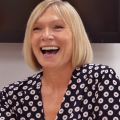
Louise Barrett, Ph.D.
Dr. Barrett is a Professor of Psychology and Canada Research Chair (Tier I) in Evolution, Cognition and Behaviour at the University of Lethbridge, Alberta, Canada. She is also a Visiting International Professor at Rühr-Universität Bochum, Germany.
Dr. Barrett will be giving the following presentation: Radical Ethology: a Sideways Glance at Primate Lives
Click here for a complete bio and session abstract.
Patrick C. Friman, Ph.D., APBB
Dr. Patrick C. Friman received his Ph.D. from the University of Kansas. He is the current Vice President of Behavioral Health at Boys Town and a Clinical Professor in the Department of Pediatrics at the University of Nebraska School of Medicine.
Dr. Friman will be giving the following presentation: Sources of Behavior and Experience: Ontological/Phenomenological Perspectives on Clinical Practice
Click here for a complete bio and session abstract.

Rhonda V. Magee, M.A., J.D.
Professor Rhonda Magee, M.A., J.D. is a full professor of Law at the University of San Francisco.
Professor Magee will be giving the following presentation: Healing Social Identity-Based Suffering Through Mindfulness
Click here for a complete bio and session abstract.
Siri Ming, Ph.D., BCBA-D
Dr. Siri Ming is a scientist-practitioner with over twenty-five years of experience in the field. She is committed to the compassionate practice of behavior analysis to help people live meaningful, values-directed lives.
Dr. Ming will be giving the following presentation: Psychological Flexibility and Prosociality: Applying RFT at the heart of Behavior Analysis
Click here for a complete bio and session abstract.
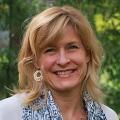
Miranda Morris, Ph.D.
Dr. Miranda Morris is the current President of ACBS, and Co-founder of True North Therapy and Training.
Dr. Morris will be giving the presentation: Finding Ourselves in One Another
Click here for a complete bio and session abstract.
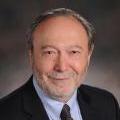
Stephen W. Porges, Ph.D.
Stephen W. Porges, Ph.D. is Distinguished University Scientist at Indiana University where he is the founding director of the Traumatic Stress Research Consortium in the Kinsey Institute. He is Professor of Psychiatry at the University of North Carolina, and Professor Emeritus at both the University of Illinois at Chicago and the University of Maryland.
Dr. Porges will be giving the follwing presentation: Polyvagal Theory: A Science of Safety
Click here for a complete bio and session abstract.
Invited Speakers
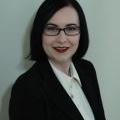
Lynn Farrell, Ph.D.
Dr. Lynn Farrell is a lecturer in Psychology at National College of Ireland. Her research interests and publications to date have focused mainly on understanding and influencing implicit and explicit stereotypes and bias particularly related to gender and improving gender equality initiatives.
Dr. Farrell will be giving the following presentation: Gender Bias and Relational Frame Theory: What's the relation?
Click here for a complete bio and session abstract.

Julia H. Fiebig, Ph.D., BCBA-D
Julia Fiebig, Ph.D., BCBA-D, is an assistant teaching professor at Ball State University in the applied behavior analysis program, and a partner in Applied Global Initiatives Consulting Group.
Dr. Fiebig will be giving the following presentation: The Heart of the Matter: Language and Connection for Sustainability
Click here for a complete bio and session abstract.

Cordelia Kraus, LPC, CADC-I, Certified CRAFT clinician
Cordelia is a certified CRAFT clinician, trainer for the Invitation to Change through the Center for Motivation and Change, SMART Recovery facilitator. She has a private practice in Portland, Oregon.
Cordelia will be giving the following presentation: Pointing towards CRAFT: How to connect families struggling with addiction with CBS-aligned, evidence based practice
Click here for a complete bio and session abstract.
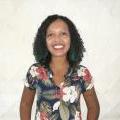
Tahcita M. Mizael, Ph.D.
Dr. Tahcita Mizael holds a BSc, an MSc, and a Ph.D. in Psychology. She is currently a postdoctoral researcher at the University of Sao Paulo (USP), Brazil, specializing in gender and sexuality.
Dr. Mizael will be giving the following presentation: Derived Relational Responding Meets Diversity, Equity, and Inclusion: Contributions from the field
Click here for a complete bio and session abstract.

Brian Pilecki, Ph.D.
Dr. Brian Pilecki is a clinical psychologist at Portland Psychotherapy that specializes in the treatment of anxiety disorders, trauma and PTSD, and matters related to the use of psychedelics.
Dr. Pilecki will be giving the following presentation: Psychedelics and Psychological Flexibility: ACBS as a Home for Psychedelic-Assisted Therapies
Click here for a complete bio and session abstract.
2022 Invited Speakers - Bios and Abstracts
2022 Invited Speakers - Bios and AbstractsPlenary Speakers

Louise Barrett, Ph.D.
Louise Barrett was trained as an ecologist and anthropologist at University College London, UK. Following her PhD, Barrett took up a Postdoctoral Fellowship at the University of KwaZulu Natal, before returning to increasingly senior posts in the UK, and a Leverhulme Trust Research Fellowship. In 2007 she moved to the University of Lethbridge, where she is Professor of Psychology and Canada Research Chair (Tier I) in Evolution, Cognition and Behaviour. She is also a Visiting International Professor at Rühr-Universität Bochum, Germany. She has run two long-term field studies on baboons and vervets in South Africa, that have explored the complexities of social life and its potential links to the evolution of brain size and social intelligence. She has presented her work in four books and over a hundred journal articles, which stretch from the social nature of primate brain evolution to the challenges of constructing a non-reductive evolutionary account of human behaviour. She has given over 50 invited presentations internationally, including 14 plenary and 4 keynote lectures at all the major conferences in her fields of research. She was, for five years, the executive editor of Animal Behaviour, the principal journal of the field. She has also served as editor for Behavioural Ecology, and continues to serve as editor for Advances in the Study of Behaviour and Evolutionary Human Sciences. She was elected to the Fellowship of the Royal Society of Canada in 2016.
Radical Ethology: a Sideways Glance at Primate Lives
The Anthropoid primates—the monkeys and apes— are known for both their intense sociality and their large brain size. This has given rise to the idea that these features might be causally related, and there is a large body of work that tests this so-called “social brain hypothesis” (SBH). The SBH views social life as highly political, and requires primates to plot and plan in an increasingly abstract manner—that is, to understand another’s behaviour, primates must delve below the surface and make inferences about the hidden causes of other’s actions. This “vertical” view risks losing sight of the fact that brains primarily evolved to enable the control of action in specific contexts, which in turn leads us to downplay or neglect the importance of the physical body in a material world full of bodies and other objects. Here, I make the case for taking a “horizontal” view of primate brain and social evolution— that is, one that focuses on bodies and action, and takes a “sideways” look at the concrete social and physical contexts in which animals are nested. I further suggest that this has implications for how we think of certain human conditions, like autism and schizophrenia.

Patrick C. Friman, Ph.D., APBB
Dr. Patrick C. Friman received his Ph.D. from the University of Kansas. He is the current Vice President of Behavioral Health at Boys Town and a Clinical Professor in the Department of Pediatrics at the University of Nebraska School of Medicine. He was formerly on the faculties of Johns Hopkins University, University of Pennsylvania, and Creighton University Schools of Medicine. He was also formerly the Director of the Clinical Psychology Program at University of Nevada. He is a Fellow of the Association for Behavior Analysis International, in three divisions of the American Psychological Association, and of the American Board of Behavioral Psychology. He is the former Editor of the Journal of Applied Behavior Analysis and former President of the Association for Behavior Analysis International. He has published more than 200 scientific articles and chapters and three books. The majority of his scientific and clinical work is in Behavioral Pediatrics and Behavioral Medicine. Dr. Friman’s work in behavioral pediatrics has concentrated on the gap between primary medical care for children on one side, and referral-based clinical child psychological and psychiatric care, on the other. A secondary focus is on adolescent behavior and development. He also specializes in consultation regarding workplace issues such as motivation, dealing with difficult people, change, happiness and pathways to success.
Sources of Behavior and Experience: Ontological/Phenomenological Perspectives on Clinical Practice
This talk will assert that human behavior (and experience) has sources and causes and that these are distinct. Most educational and clinical efforts focus on causes and thus this talk will focus on sources. And it will argue that a person’s points of view about the circumstances of their life are the source of their experience of, and behavior toward, those circumstances. In other words, humans respond to the world in accord with how the world occurs for them and not how it objectively is. Although a topic for another talk, it bears mention that it may be impossible to perceive the world in a purely objective fashion. In any event, it would seem prudent to add interventions derived from focus on sources of behavior to the vast number of extant interventions derived from focus on causes. There are two significant obstacles to overcome, however. First, people are often unaware they have a point of view or are vague on details if they do. Second, due to the influence of the architects of the educational system in the Western Hemisphere (i.e., Plato, Aristotle, and Socrates) there is a profound commitment to being right about one’s opinions, beliefs, assumptions or more generally, points of view. Thus, people are very resistant to giving them up or even modifying them. This talk will elaborate on points of view as sources of behavior and discuss methods for increasing flexibility with respect to them. It will end with my own point of view on clinicians and clinical practice.

Rhonda V. Magee, M.A., J.D.
A leading thought and practice innovator in the area of mindfulness-based antiracism and social justice, Rhonda V. Magee, M.A., J.D., is Professor of Law at the University of San Francisco. Magee has spent more than twenty years exploring the intersections of anti-racist education, social justice, and contemplative practices. A Fellow of the Mind and Life Institute, she is a global/international Keynote speaker, mindfulness teacher, practice innovator, storyteller, and thought leader on integrating Mindfulness into Higher Education, Law and Social Justice. A student of a range of Buddhist traditions and a Fellow of the Mind and Life Institute, she has served as an advisor to a range of leading mindfulness-based professional development organizations, including the University of Massachusetts Center for Mindfulness, the Brown Center for Mindfulness, the Search Inside Yourself Leadership Institute, and the Center for Contemplative Mind in Society. Rhonda’s award-winning book, The Inner Work of Racial Justice: Healing Ourselves and Transforming Our Communities Through Mindfulness (Penguin RandomHouse TarcherPerigee: 2019; paperback edition 2021), was named one of the top ten books released for the year by the Greater Good Science Center, and received similar recognition by Psychology Today and the editors of Mindful.org. Professor Magee is the recipient of the Institute for Wellbeing in Law's Inaugural Lifetime Achievement Award for Excellence in Wellbeing in Law (2022).
Healing Social Identity-Based Suffering Through Mindfulness
In an age of increasing polarization, new methods for minimizing bias and ameliorating social conflict are ever more important to our personal, interpersonal and collective wellbeing. In this Keynote, Rhonda Magee, author of The Inner Work of Racial Justice: Healing Ourselves and Transforming Our Communities Through Mindfulness, will discuss how compassion-based mindfulness-based interventions may be the key to healing these divides. Following a description of the problem and a review of relevant research findings, she will call for increased attention to these social dynamics among researchers, and for more collaborative and interdisciplinary research methods and teams.
Siri Ming, Ph.D., BCBA-D
Dr. Ming is a scientist-practitioner with over twenty-five years of experience in the field. She is committed to the compassionate practice of behavior analysis to help people live meaningful, values-directed lives. Her research and clinical focus is on applications of relational frame theory (RFT) to early intervention programs for children with autism, integrating Skinnerian verbal behavior with RFT. She has authored numerous peer- reviewed research and theoretical articles on applications of RFT, as well as a practical handbook series on using RFT in early intervention programs. She teaches and acts as subject matter expert for graduate level classes in verbal behavior for the Chicago School of Professional Psychology, and has been an associate editor for The Analysis of Verbal Behavior journal. Her work is grounded in values of rigor, generosity, and kindness.
Dr. Ming has spent decades working in a wide range of contexts all over the world that have shaped her practice. In this talk, she shares her perspective that viewing behavior analytic intervention through a lens of psychological flexibility and prosociality gives a clear focal point for building a meaningful, values-directed, compassionate practice, centered on social validity and cultural humility.
Psychological Flexibility and Prosociality: Applying RFT at the heart of Behavior Analysis
Psychological flexibility involves interacting with (or “languaging about”) our experiences in flexible, context-sensitive ways that help us connect with meaning and purpose, even when faced with adversity. Prosociality rests upon both psychological flexibility and cooperation. These are complex composite repertoires, requiring advanced repertoires of relational framing and rule governance—including deictic and hierarchical framing, valuing, behavioral variability and relational flexibility. However, they are repertoires that are learned, and can be taught, in terms of component skills building over time. In this talk, Dr. Ming unpacks psychological flexibility and prosociality in terms of basic behavior principles and relational framing, showing that these can be viewed as skill sets that can be promoted throughout the lifespan, from infancy to adulthood. She argues that taking this perspective keeps our focus always on social validity, the heart of behavior analytic practice.

Miranda Morris, Ph.D.
"I am a psychologist in private practice just outside Washington, D.C. In 2010, after a few years of trying to build a private practice, I stumbled on the local ACBS community. Finding my tribe changed everything. Within a year, we had founded the Mid-Atlantic Chapter of ACBS. Committed to disseminating ACT, our chapter holds multiple workshops each year, provides free training to students, and has grown to well over 250 members. In 2016, I found the courage to step up and serve at the next level of ACBS and have since had the honor of serving on the Chapter & SIG and DEI Committees as well as the Women’s SIG Board. In 2018, I was honored to join our community of peer-reviewed ACT trainers, and I began service as Member at Large on the ACBS Board. My passion is building the ACBS community locally and globally."
Finding Ourselves in One Another
“When we choose to love, we choose to move against fear, against alienation and separation. The choice to love is a choice to connect, to find ourselves in the other” - bell hooks
Our community has a shared mission to alleviate the problem of human suffering, and at the end of the day, what else could we call this but love? How we love and connect and thus find one another in ACBS unfolds in a thousand different ways. One way is service to others - both inside and outside of ACBS. Many of these efforts are invisible. And yet their impact is profound. These are acts of love that have the power to unite us in a shared purpose. Who are the people in ACBS doing service? What kinds of service are they doing? Why are they doing it? Join me and find out. Meet some of the people in ACBS who breath life into our shared mission and show us who we are and who we can be.

Stephen W. Porges, Ph.D.
Stephen W. Porges, Ph.D. is Distinguished University Scientist at Indiana University where he is the founding director of the Traumatic Stress Research Consortium in the Kinsey Institute. He is Professor of Psychiatry at the University of North Carolina, and Professor Emeritus at both the University of Illinois at Chicago and the University of Maryland. He served as president of the Society for Psychophysiological Research and the Federation of Associations in Behavioral & Brain Sciences and is a former recipient of a National Institute of Mental Health Research Scientist Development Award. He is the originator of the Polyvagal Theory, a theory that emphasizes the importance of physiological state in the expression of behavioral, mental, and health problems related to traumatic experiences. He is the creator of a music-based intervention, the Safe and Sound Protocol ™ , which currently is used by more than 2000 therapists to improve spontaneous social engagement, to reduce hearing sensitivities, and to improve language processing, state regulation, and spontaneous social engagement.
Polyvagal Theory: A Science of Safety
Humans, as social mammals, are on a quest for safety. The need to feel safe is the prepotent survival related motivator impacting on all aspects of human experience by biasing thoughts, feelings, and behaviors. Threat reactions not only disrupt cognitive, emotional, and behavioral functions but also compromise the basic homeostatic physiological functions supporting health, growth, and restoration. Without feeling safe, the nervous system is unable to optimize the regulation of visceral organs with the consequential damage to organs leading to observable and diagnosable organ disease and failure. A profound need to survive triggers a complex genetically programmed portfolio of physiological reactions and behaviors to cues of threat and safety. The talk will illustrate that feeling safe has a physiological signature, which is a product of our evolutionary history in which the autonomic nervous system was repurposed to support sociality. The theory provides the basis to understand sociality as the mutual expression of cues of safety that lead to behavioral and physiological co-regulation. Thus, the power of feelings safe with others enables sociality to function as a neuromodulator of the autonomic nervous system leading to more optimal mental and physical health.
Invited Speakers

Lynn Farrell, Ph.D.
Dr. Lynn Farrell is a lecturer in Psychology at National College of Ireland. She graduated with a BA in Psychology (1st Class Honours) from Maynooth University where she was introduced to Relational Frame Theory (RFT) and discovered new ways to explore social psychological phenomena such as stereotypes and bias. Dr. Farrell went on to complete her Ph.D. as an Irish Research Council postgraduate scholar at University College Dublin (UCD) where she explored the nature and malleability of implicit bias towards women in STEM through the lens of RFT as part of the UCD CBS lab. She received the ACBS Student Spotlight award for her work on gender bias and previously served as a student representative on the Women in ACBS SIG during its establishment. After completing her doctoral research, Dr. Farrell took up a Research Fellow position at Queen’s University Belfast (QUB) where she continued to empirically explore how to improve gender equality efforts in STEM as part of the EPSRC funded Inclusion Matters project and was awarded the QUB Engineering and Physical Sciences Faculty Postdoctoral Outstanding Engagement award. Her research interests and publications to date have focused mainly on understanding and influencing implicit and explicit stereotypes and bias particularly related to gender and improving gender equality initiatives.
Gender Bias and Relational Frame Theory: What's the relation?
Gender is often viewed in relation to women, and differences between men and women in particular which tend to be essentialized. This strengthens the perceived legitimacy of stereotypes that assign traits and expectations to people based on their assumed sex. However, research consistently demonstrates the impact of sociocultural factors which suggests gender stereotypes are open to influence. This gender research is often seen as the remit of social psychology; however, Relational Frame Theory (RFT) provides a contemporary behavioral approach to understanding and influencing social psychological phenomena. RFT conceptualizes bias and stereotypes as forms of arbitrarily applicable relational responding maintained by current and historical contextual factors. This can help us better appreciate the persistence and potential for flexibility in gender stereotypes. In this talk I will discuss my research on understanding and influencing gender-STEM stereotypes and attitudes towards gender equality initiatives in STEM through an RFT-lens. I will also discuss some of the broader literature that has taken an RFT-relevant approach to gender bias. In this way I will highlight how RFT may help us better understand gender and gender stereotypes as dynamic relational networks that are context-dependent and influenced by social contingencies, while also highlighting areas for further research.

Julia H. Fiebig, Ph.D., BCBA-D
Julia Fiebig, Ph.D., BCBA-D, is an assistant teaching professor at Ball State University in the applied behavior analysis program, and a partner in Applied Global Initiatives Consulting Group. She is from Germany and resides in the San Francisco Bay Area. A practicing behavior analyst for over twenty years, she has a range of experience working with clinical, educational, and other non-profit and private organizations. She has served on task forces for ABAI and ACBS and currently serves on the board of the Behavior Analysis for Sustainable Societies special interest group and ABAI’s Practice Board. A primary emphasis of her work is helping leaders and organizations cultivate values-informed, consensus-building, prosocial practices and sustainable systems. She is dedicated to work on issues of environmental justice, and contributing to wider application and dissemination of a compassionate behavior science.
The Heart of the Matter: Language and Connection for Sustainability
Human overconsumption of earth’s resources continues to exacerbate problems of a world in conflict and climate crisis - widening inequities and further marginalizing vulnerable populations. At its heart, sustainability is about equitable access and operating within resource boundaries that address collective need, rather than the wants of the few. For individuals and communities to thrive, connecting sustainability to core values of equity, prosociality, and well-being is essential. The complex contingencies that influence these issues require sophisticated understanding and application of our knowledge of complex language. This extends to cultural practices and beliefs; geographical-environmental conditions; socio-economic circumstances; and psychological impacts of navigating climate related crises. Awareness of ourselves as part of an environment that either promotes sustainable practices, or leads to inequities is critical. An RFT perspective offers a framework of analysis and strategies for mitigation. Fostering connection, rather than division, through our awareness of language, is a pillar of our practice as contextual behavior scientists. Together we can transform meaning and create the connections needed for collective actions that embody sustainable, thriving communities and relationships.

Cordelia Kraus, LPC, CADC-I, Certified CRAFT clinician
Cordelia is a certified CRAFT clinician, trainer for the Invitation to Change through the Center for Motivation and Change, SMART Recovery facilitator (both standard and Family & Friends), owner of HelpingFamiliesHelp.com, and parent who is passionate about connecting families and providers with CRAFT and CRAFT-based approaches. She has a private practice in Portland, Oregon where she works directly with people with substance use and mental health concerns as well as families who are struggling with their loved one's substance use.
Pointing towards CRAFT: How to connect families struggling with addiction with CBS-aligned, evidence based practice
If you had a client struggling with their partner or child's substance use, would you know the evidence-based resources to support your client? These families are usually offered one option: a treatment-as-usual that was never intended to be treatment at all. We, as clinicians, have the power to help these families, and by extension their loved ones, by learning about an evidence-based approach called CRAFT (community reinforcement and family training). And you don’t need extensive training to help… simply knowing what it is and directing someone towards it is enough. CRAFT-based approaches go beyond support to offer families transformative skills and perspectives on substance use, processes of change, empathetic communication, strategic behavioral responses, and increased connection with valued living. Engagement in CRAFT significantly increases the chance of their loved one entering into treatment (approaching 70% vs 20% TAU), reduces substance use, and improves family well-being. This talk covers CRAFT-based approaches, including a composite of CRAFT and ACT called "Invitation to Change", and will give you what you need to connect families with this work.
Tahcita M. Mizael, Ph.D.
Dr. Mizael is a psychologist from Brazil. She holds a BSc, an MSc, and a Ph.D. in Psychology. She is also an expert in Gender and Sexuality. She is currently a postdoctoral researcher at the University of Sao Paulo (USP), Brazil, and a member of the Association for Contextual Behavioural Science (ACBS) Diversity, Equity, and Inclusion (DEI) Committee. Her work has been focused on DEI issues, more specifically, racial prejudice, racism, sexism, feminism, gender and sexual minorities, intersectionality, and autism.
Derived Relational Responding Meets Diversity, Equity, and Inclusion: Contributions from the field
This talk aims to present the audience with some contributions from behavior analysis and Relational Frame Theory to both understanding and reducing racial and other types of prejudices. Starting with a review of studies from the field, I will present a few studies that used derived relational responding to assess and/or reduce racial prejudice. Then, other studies with related phenomena (e.g., gender issues) will be discussed. Finally, I will suggest some avenues of research that could use derived relational responding to understand and act upon other DEI issues, such as feminism, and intersectionality.

Dr. Brian Pilecki, Ph.D.
Dr. Brian Pilecki is a clinical psychologist at Portland Psychotherapy that specializes in the treatment of anxiety disorders, trauma and PTSD, and matters related to the use of psychedelics. He completed a post-doctoral fellowship at The Warren Alpert Medical School of Brown University and practices from an orientation based in Acceptance and Commitment Therapy (ACT). Brian also has extensive experience in the areas of mindfulness and meditation, and incorporates them into his therapy with clients. Brian is an active researcher and has published on topics such as anxiety disorders, mindfulness, and psychedelics. At Portland Psychotherapy Brian is a study therapist on a clinical trial investigating the use of MDMA-assisted therapy for the treatment of social anxiety disorder and understanding processes of change in how this novel form of treatment might work. He has given numerous workshops on topics related to psychedelics and is a consultant for the Oregon Health Authority in helping to design a program for psilocybin services in the state of Oregon. Brian is also co-chairperson for the Psychedelic SIG at ACBS. He co-hosts a podcast called Altered States of Context about the intersection of psychedelics and contextual behavioral science, and has appeared on several national podcasts such as Verywell Mind and Beyond Addiction.
Psychedelics and Psychological Flexibility: ACBS as a Home for Psychedelic-Assisted Therapies
Over the last decade, psychedelic-assisted therapy (PAT) has emerged as a novel form of mental health treatment and is unique in using a combination of psychotherapeutic techniques with an altered state of consciousness to facilitate change and transformation. Psychedelic-assisted therapy may represent a paradigm shift in mental health treatment but needs a strong, reliable conceptual framework to best guide the use of these powerful tools in order to maximize clinical benefit and reduce potential harm. Since its beginning in the 1960’s, psychedelic therapy has lacked a unifying theoretical model to guide clinicians in maximizing therapeutic benefits. Contextual behavioral science and the psychological flexibility model are perfectly suited to understand these mysterious altered states of consciousness and how they can catalyze processes of change that lead to growth and greater engagement with a values-driven life. ACT has already been used to inform several clinical trials of psilocybin-assisted therapy for the treatment of depression with good results. ACBS can and should be a home for psychedelic assisted therapies to grow and develop as new treatments to help alleviate suffering. This presentation will provide an overview of psychedelic-assisted therapy, review modern clinical research, and describe the synergy between CBS and psychedelics.
WC2022 Program
WC2022 ProgramPlan your conference days with this brief daily schedule:
View the (final) detailed IN-PERSON program, including abstracts:
Check out a list of all the content that will be available for our VIRTUAL audience:
View the detailed VIRTUAL program, including abstracts:
Disponible en español
App
All IN-PERSON conference information can be found on our app as well. 
- Go to your phone's app store. Search for Yapp. Install Yapp on your phone.
- Open Yapp.
- Click on "+" at the top.
- Type ACBS in the box that says Enter Yapp Id and click "Add".
- The ACBS World Conference logo will appear on your screen. Click on the logo and the app will open.
Haven't registered for the conference yet? Find out more about rates and registration here.
Please learn more about our fantastic 2022 Program Committee here.
2022 Presenter Resources
2022 Presenter Resources
Welcome to the ACBS World Conference Presenter Resources Page! This page contains valuable information to help you prepare for the upcoming conference.
Session Types
Learn about the various types of sessions in the ACBS program here.
Powerpoints and Handouts

For your convenience ACBS has provided a Powerpoint template that you may use. This file also includes disclosure slides that can be used when appropriate.
The Powerpoint template and suggestions provided will be helpful for the viewing experience of our virtual audience. Many of the in-person conference sessions will have their audio and ppt captured, and using the template as suggested with photos of the presenters will make for an improved viewing experience.
If you are participating in a panel and weren't planning on a robust ppt presentation, please consider at least creating slides with images of the presenters (as suggested in the template) if you are being recorded. This will improve the post-conference viewing experience.
As always we would like to collect as many powerpoint presentations as we can prior to the conference, to make them available for attendees on the conference platform. When your powerpoint or other handouts are ready, please submit them to this Dropbox folder: https://www.dropbox.com/request/qSDdlE0YMlH8IDWNwDW6
*Make sure your session number and a description are in the file name. For example, “56 ppt” or “56 handout”
We can only guarantee that powerpoints or handouts submitted by May 26 will be posted online prior to the conference. If you send your powerpoint or handouts after May 26, they may not be posted online until after the conference is over in June.
In an effort to reduce paper consumption at the conference, we will only be printing workshop handouts that are worksheets to be completed during sessions. (PPT slides with space for notes are not considered worksheets.) If you have a worksheet that you would like to make available to your attendees, add it to the Dropbox folder linked above by May 16 so that it can be printed. Make sure to indicate in the file name what needs to be printed (for example, “56 handout – print - 2 sided”). Copies will be delivered to your workshop room just prior to your session during the conference.
Additionally, we would like to collect as many powerpoint presentations as we can prior to the conference, to make them available for attendees and ACBS members. When your powerpoint or other handouts are ready, please email it to: [email protected] with “WORKSHOP PPT” in the subject line, and the workshop Title and Authors in the body of the email, and we will post them on our website.
Audio Visual Equipment
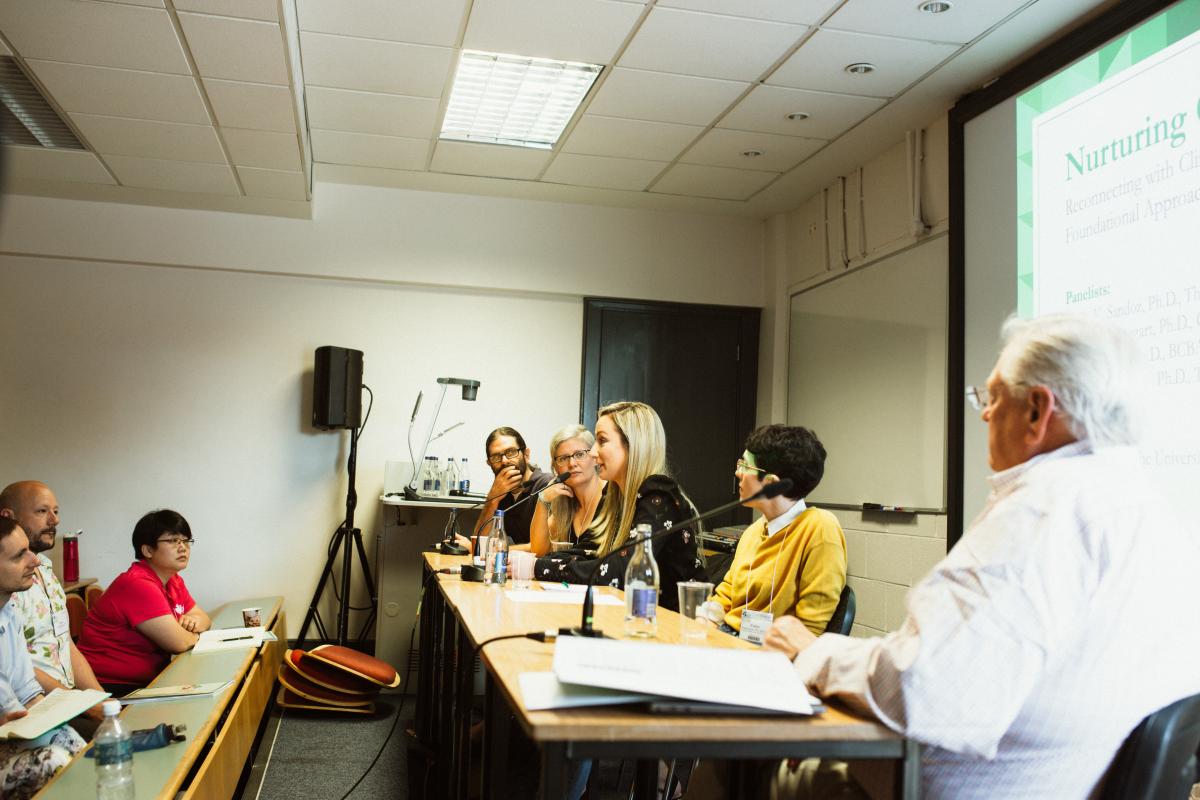 Every room will come equipped with a projector. The projectors will have HDMI cables. ACBS will have limited adaptors for your use, but may not have all types. If you know that your laptop does not have an HDMI port, please bring the necessary adaptor with you.
Every room will come equipped with a projector. The projectors will have HDMI cables. ACBS will have limited adaptors for your use, but may not have all types. If you know that your laptop does not have an HDMI port, please bring the necessary adaptor with you.
Note: If you use a MAC laptop, please bring an adapter for hooking it up to the projector's HDMI cable. Likewise, please bring any needed international plug adapters if applicable. Also bring your presentation (PC capable) on a memory stick, as a back up.
There will be microphones in most of the breakout rooms – the type and quantity will be dependent on the session type and number of presenters.
Presenters are requested to provide their own laptops for their presentations. If you are unable to supply your own laptop, you must note this when answering the call for submissions.
Books for Sale
Our conference bookstore is operated by New Harbinger Publications, however they include books from other publishers in our bookstore. New Harbinger will make every reasonable effort to include your suggested book in the bookstore.
If you'd like your book considered for inclusion in the ACBS Conference bookstore, please submit your information here by April 15, 2022.
2022 WC Video with Louise McHugh and Alison Stapleton
2022 WC Video with Louise McHugh and Alison StapletonIn preparation for the upcoming #ACBSWC22 Louise McHugh and Alison Stapleton are sharing a humorous suggested "packing list" based on the program. Check it out!
Program Committee
Program Committee
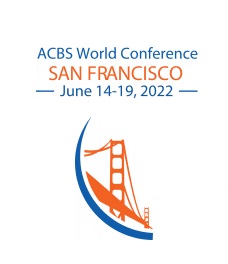 Program Committee Chairs
Program Committee Chairs
Luisa Canon, Psy.D., BCBA-D

Dr. Canon is a Clinical Behavior Analyst and a Licensed Psychologist in California She has over two decades of experience working with families of children and adults with autism, developmental delays, and behavioral challenges from both Applied Behavior Analysis (ABA) and Acceptance and Commitment Therapy (ACT) perspectives. She is the co-founder and director of research and development of the Institute for Effective Behavioral Interventions (IEBI), an organization that provides state-of-the-art behavioral intervention for children with autism, and the founder and director of ACT to Thrive, a center dedicated to the provision of ACT-focused training, consultation, and treatment services. Her current research projects include implementation of ACT with parents, youth, and staff; and training behavior analysts in relationship building, compassionate care, behavioral flexibility, and clinical behavior analysis. Dr. Canon has leadership roles within the Association for Contextual Behavioral Sciences (ACBS) and is currently a graduate research mentor for the University of Nevada Reno.
Evelyn Gould, Ph.D., BCBA-D LABA

Evelyn Gould is a Clinical Behavior Analyst and Licensed Psychologist from N. Ireland, currently based in Los Angeles, CA. Evelyn is a trainer and supervisor at The New England Center for OCD and Anxiety, and is an Assistant Clinical Professor at Keck School of Medicine at USC. She is also a Research Associate in Psychiatry at Harvard Medical School. Evelyn provides clinical services to children, adolescents, young adults, and families, in addition to engaging in applied research and scholarship. She has published articles and book chapters on working with caregivers, clinical assessment and treatment design, training and supervision, ACT (Acceptance and Commitment Therapy) and practitioner well-being. She is passionate about the dissemination of contextual behavioral treatment approaches and addressing issues of diversity, equity and inclusion in Behavior Analysis. Evelyn is actively involved in a variety of Special Interest Groups and Task Forces within the ABAI and ACBS communities, and is an Associate Editor of the Journal of Contextual Behavioral Science.
2022 Program Committee:
Priscilla Almada
Meredith Andrews
Patricia Bach
Natalia Baires
Christopher Berghoff
Yash Bhambhani
Michael Bordieri
Sarah Cassidy
Robyn Catagnus
Angela Cathey Coreil
Yuen Yu Chong
Nelly Dixon
Joanna Dudek
Nuno Ferreira
Julia Fiebig
Sebastian Garcia Zambrano
Brandon Gaudiano
David Gillanders
Jennifer Gregg
Fernando Guerrero
Sandi James
Daniel Johnson
Valerie Kiel
Ali Kresch Levine
Raimo Lappalainen
Michael Levin
Lucia Loureiro
Mai Manchanda
Raul Manzione
Staci Martin
Michael May
Louise McHugh
Siri Ming
Charlene Moore
Sarah Mooy
Jose Moreno
Manuela O´Connell
Ray Owen
Dana Paliliunas
Dannel Petgrave
Amanda Rhodes
Patti Robinson
Tiffany Rochester
Francisco J. Ruiz
Emily Sandoz
Thomas Sease
Matthew Skinta
Wanda Smith
Debbie Sorensen
Dr. Gita Srikanth
Jill Stodddard
Niklas Törneke
Sanna Turakka
Janani Vaidya
Kevin Vowles
Interested in volunteering? Please reach out to one of the chairs above by clicking on their names!
WC2022 App Information
WC2022 App Information
All IN-PERSON conference information can be found on our app.
1. Go to your phone's app store. Search for Yapp. Install Yapp on your phone.
2. Open Yapp.
3. Click on "+" at the top.

4. Type ACBS in the box that says Enter Yapp Id and click "Add".
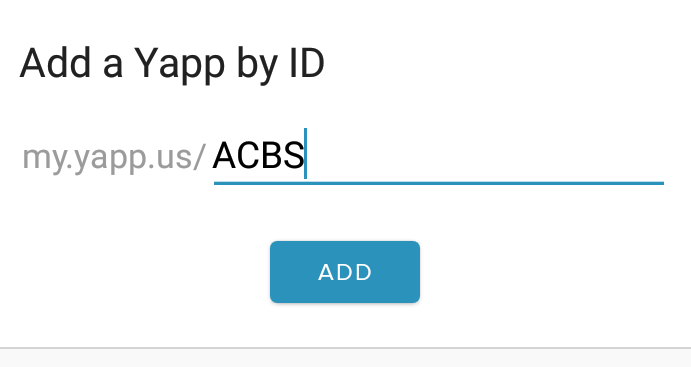
5. The ACBS World Conference logo will appear on your screen. Click on the logo and the app will open.
![]()
WC2022 Powerpoints & Handouts
WC2022 Powerpoints & HandoutsUnder construction
The page includes all PowerPoints/Handouts/Materials supplied by our ACBS World Conference 2022 presenters for presentations delivered in San Francisco, that will not be recorded. Additional materials for presentations being recorded will be loaded directly to our Virtual Conference Website (registration and login required).
4. Bringing Compassion to Life in the Therapy Room: A Process-based Framework for Organizing and Delivering CFT
PPT
12. New Directions and Strategies in ACT for Physical Health: Treating Chronic Conditions with Flexibility and Care
Paper 1: PPT
Paper 2: PPT
Paper 4: PPT
18. Don’t Let Them See My Flaws: The Intersection of Perfectionism, Body Image and Eating Disorders
PPT
Handout 1
Handout 2
21. Learning by doing: A Practical Workshop on Prototyping Targeted Processes of Change for digital Intervention Design
PPT
25. Willingly ACT for Spiritual Development: Acknowledge, Choose, Teach others
PPT
30. Doing More But Never Doing Enough: Help your clients unhook from productivity anxiety and strive skillfully
PPT
31. Making SPACE to ACT: Supporting Parents with Resistant Youth
PPT
33.Making ACT Come Alive Using Humor,Metaphor, and Story
PPT
Handout
37. In Pursuit of Universal Wellbeing: Psychological Flexibility and Gender and Sexual Minoritized Individuals
PPT
40. Contextual behavioral approaches to understanding and intervening on issues of chronic health, cancer and suicide
Paper 3: PPT
45. Wearing Your Hexaflex Goggles During ACT-informed Exposure
PPT
Handout
49. All in the family: Mindfulness and flexibility in the context of parenting
Paper 4: PPT
54. Working with Suicidal Young People: ReThinking Risk and Integrating CBS and Attachment Theory: Children, Adolescents & Families SIG Sponsored
PPT
55. Flexible Applications: Using ACT with Healthcare Workers, Adolescents, and the LGBTQ+ Community
PPT
56. A Spectrum of Selves: Psychedelic and Non-Ordinary States of Consciousness SIG Sponsored
PPT
63. Psychological Flexibility and Experiences of burnout, imposter syndrome and vicarious trauma in the workplace
PPT
69. Addressing Righteous Indignation with Forgiveness and Reconciliation
PPT
80. "I hate to say this, but..": How Psychological Flexibility can help you have difficult conversations
PPT
81. Sex ACT - a workshop, not an offer
Handout
87. Uncovering the process and practice of ”Creative Hopelessness”
Handout
96. Acceptance and Commitment Therapy for Weight Loss
Paper 1: PPT
Paper 2: PPT
Paper 3: PPT
Paper 4: PPT
97. Self-as-Context: I will never understand what that really means... Or maybe I will?
PPT
109. Maximizing Achievement of Children and Adolescents in their Performance Endeavors Using the ACT Matrix: Sport, Health, and Human Performance SIG Sponsored
PPT
Handout
110. The ACT Trained Physical Therapist: Application and Tools for Altering Pain Care: Physiotherapy SIG Sponsored
PPT 1
PPT 2
Handout 1
Handout 2
112. Deepening Emotional and Relational Experiencing in ACT: San Francisco Bay Area Chapter Sponsored
PPT
121. Ignite Session
ACT Auntie's Island: The legacy of Louise Gardner PPT
122. CBS approaches to understanding and supporting individuals struggling with substance use and disordered eating: Applying ACT to Addictions SIG Sponsored
PPT
128. Acceptance - How do I actually use and teach it now?
PPT
131. Beyond a single time-point: Advances in longitudinal psychometric research of CBS-focused self-report measures
PPT
135. Learning to “Speak” RFT: The Art and Practice of Relational Framing for Clinicians: Asian Culture and CBS SIG Sponsored
PPT
Handout 1
Handout 2
Handout 3
Handout 4
141. Gaining footing in shifting sands: An experiential approach to identifying and actualizing values in team settings
PPT
Handout
148. From the lab to the world: Behavior analysis
PPT
149. Transcending Self (-as-Content): True Belonging from the Inside Out
PPT
Handout
150. CBS interventions for supporting caregivers and family members
PPT
